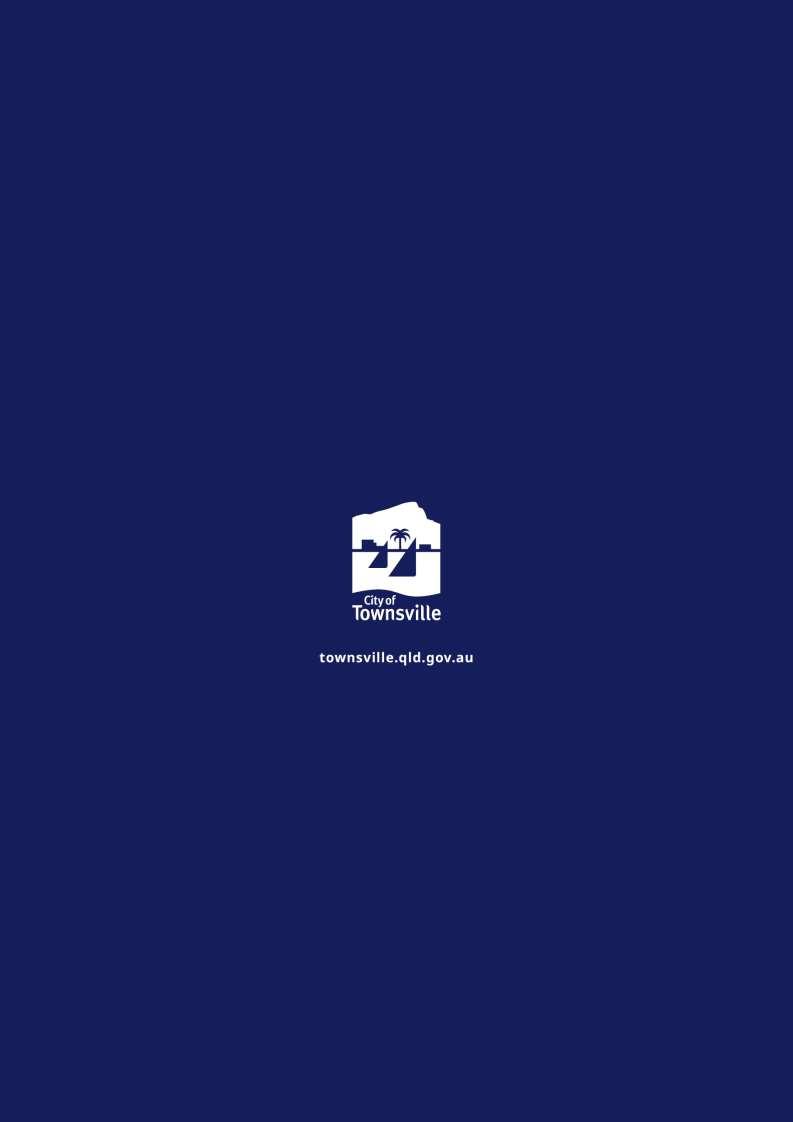








Townsville City Council acknowledges the Wulgurukaba of Gurambilbarra and Yunbenun, Bindal, Gugu Badhun and Nywaigi as the Traditional Owners of this land. We pay our respects to their cultures, their ancestors and their Elders, past, present and all future generations.
This work is copyright. Permission to reproduce information contained in this report must be obtained from Townsville City Council. All care has been taken to ensure all content is complete and accurate. However, Council does not guarantee it is without error. Visit Council’s website for more information, townsville.qld.gov.au
Council measures its performance in its Annual Report in terms of progress made in implementing the Corporate Plan.
The Annual Report provides information about Townsville City Council and delivery of:
• Townsville 2021–2026 Corporate Plan
• Budget and Operational Plan 2023/24, including Water and Resource Recovery Performance Plans.
In accordance with section 45(b) of the Local Government Act 2009, Council has established commercial business units for its significant water and resource recovery business activities.
Council reports its performance by publishing:
• Townsville Dashboards
• Quarterly Performance Reports
• Annual Report
• Ordinary Council Reports
Council’s strategies and plans include:
• Townsville 2021–2026 Corporate Plan – outlines the city’s shared vision for Townsville and the key issues and priorities for Council over the next five years and beyond
• Budget and Operational Plan 2023/24 – Council’s annual plan to allocate resources to deliver specific projects, activities and events in pursuit of the Corporate Plan
• Townsville City Plan – sets the direction for development and growth over the next 25 years
• Strategic Asset Management Plan – articulates the Asset Management System Model, Asset Management Framework and Asset Management Capability Delivery Model for Council
• Townsville City Deal – a 15-year commitment between the Australian Government, Queensland Government and Townsville City Council to work together to plan and deliver transformative outcomes for Townsville and its residents
This Annual Report is part of Council’s commitment to open, transparent and accountable governance. It identifies community service delivery and demonstrates how Council is meeting its strategic objectives.
Where to get a copy of this Annual Report 2023/24
Our reports are available to view in full, as a flipbook, at Council’s website. Go to https://www.townsville.qld.gov.au/about-council/corporate-information
Feedback on this report
We welcome our community’s feedback on this Annual Report 2023/24. Please send feedback to enquiries@townsville.qld.gov.au


The Townsville City Council Annual Report for 2023/24 highlights Council’s progress towards our purpose of growing Townsville.
Throughout the 2023/24 financial year, Council continued to deliver for the community including a number of critical projects and investment.
Council was honoured to accept ECO Destination
Certification on behalf of the Townsville region at the Nature Tourism level with Ecotourism Australia. This certification means Townsville met globally recognised sustainability standards, assuring travellers Townsville is backed by a strong, wellmanaged commitment to sustainable practices and provides high-quality nature-based tourism experiences within the region.
Investing in our core services is a key priority for Council. Throughout the year, Council continued to deliver and enhance essential services, like waste collection, the provision of clean and safe drinking water, maintaining our parks and gardens and of course our expansive transport network.
Over the years Townsville has gained a reputation as the sporting and events capital of Northern Australia and to see that reputation bolstered year on year is very exciting. Off the back of a massive 12 months of events including the annual Supercars weekend, Townsville turning P!nk, The North Australian Festival of Arts and grass-roots events like Eco Fiesta and Seniors Luncheons, Townsville’s events calendar continues to strengthen our enviable lifestyle.
This Annual Report showcases Council’s progress over the past 12 months. We look forward to shaping Townsville into the prosperous epicentre of Northern Australia in the years to come.

Cr Troy Thompson Mayor of Townsville
Townsville is widely lauded for its beautiful natural spaces – beach, reef and rainforest – as well as the many parks and open spaces we enjoy in our suburbs. Throughout the 2023/24 financial year, we continued our focus on enhancing the liveability of this beautiful city, with completion of projects like the Marabou Park redevelopment, continuation of our boulder protection program, and a dedicated initiative to tackle Yellow Crazy Ants. Our arts scene also thrived, with a highlight being the biennial 2024 Percivals exhibition.
Our focus as an organisation is on improving both the short- and long-term financial sustainability of Council, while continuing to deliver our core services.
In 2023/24 Council processed more than 270,000 tonnes of waste, treated more than 42,000 megalitres of water for safe drinking, and maintained more than 1,800 kilometres of roads to allow safe travel for all.
Earlier this year, Council successfully prepared for and responded to Tropical Cyclone Kirrily, issuing frequent communication leading up to, during and after the cyclone made landfall.
The clean-up was significant. Council crews cleared more than 30,000 tonnes of green waste, in some of our hottest, most humid North Queensland weather.
I would like to thank all Council employees for their continued dedication to providing the community excellent service and helping grow Townsville.
The next financial year will present Townsville City Council with new challenges and we will look for every opportunity to deliver our services and infrastructure more efficiently and effectively. I am confident we can navigate the current challenges we face, to deliver a financially sustainable future for this great city.

Joe McCabe Chief Executive Officer
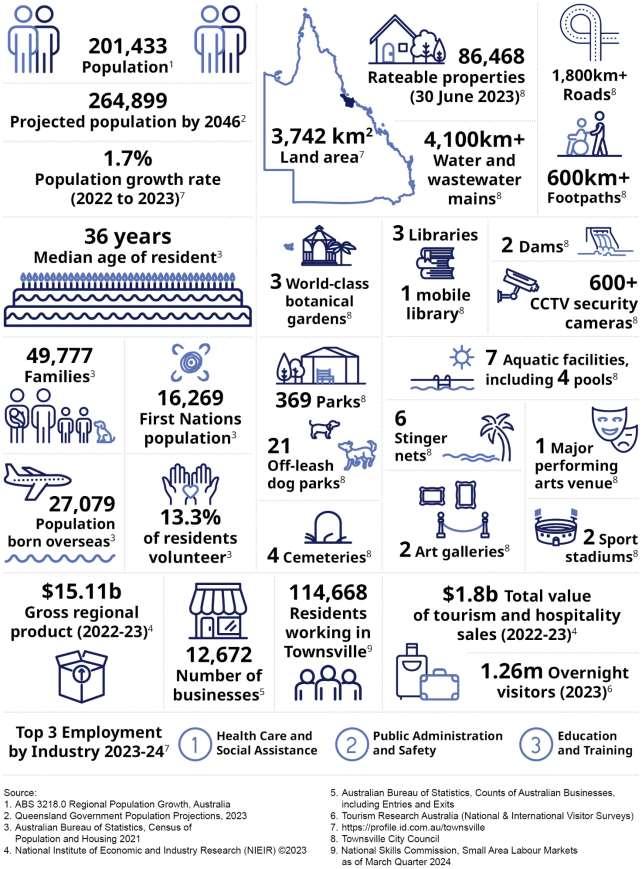
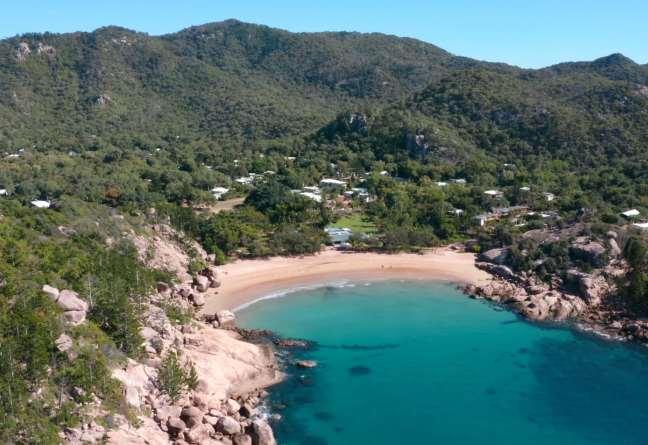
Located 1,300km north of Brisbane and 350km south of Cairns, Townsville is positioned between reef, rainforest and bush.
Townsville was founded in 1864 as a port for the fledgling pastoral industry in North Queensland. Following the discovery of gold in the immediate hinterland at Ravenswood and then Charters Towers, the town developed into the principal centre and capital of North Queensland.
Traditional Owners and custodians, the Bindal and Wulgurukaba People are the first people to have lived in the Townsville region.
The Bindal People
The Bindal people call the country “Thul Garrie Waja”. An important symbol for the Bindal people is the shooting star. They believe that wherever the star fell, or the direction the star fell meant there was either danger coming or someone from that direction was in need of help or in danger.
The Wulgurukaba People
The Wulgurukaba people call their country “Gurrumbilbarra”. Wulgurukaba means “canoe people”. An important symbol of the Wulgurukaba people is the carpet snake. Wulgurukabas creation story tells the story of the creation snake that comes down from the Herbert River, went out to sea, creating the Hinchinbrook Channel, and down to Palm and Magnetic Islands. His body broke up, leaving parts along the coast. The tail of the snake is at Halifax Bay, his body is at Palm Island, while his head rests at Arcadia, Magnetic Island.

With more than 300 days of sunshine, and a daily rush hour of less than 20 minutes, Townsville’s lifestyle is second to none. Our city is the perfect place for everyone to live, work and play!
From the reef and its tropical islands to lush rainforests, and endless natural beauty – Townsville is all about easy living with plenty of big city benefits.
Townsville is home to Australia’s largest garrison city, world-class events, leading education providers, cutting edge health facilities, affordable housing, and a global bustling port.
The city offers a range of diverse experiences, from the awe-inspiring Great Barrier Reef, World Heritage Wet Tropics rainforest, to the dirt and dust of the Australian outback.
The diverse economy of North Australia’s largest city boasts an enviable lifestyle.
Council’s Strategic Planning Framework is the overarching framework used to assist Council and the community to plan for the future. It is a continuous, systematic process, which includes how Council engages with the community to identify intended future outcomes and monitor and report on the progress of outcomes.
Townsville 2021-2026 is Council’s strategic document which sets the direction for what Council focuses on as we work to grow Townsville. It ensures Council provides intentional leadership on the way the city grows into the future. The Plan outlines the areas of focus, priorities and specific initiatives Council has committed to implementing, driving and advocating.
This Corporate Plan focuses delivery on the needs of the community, driving value through asset maintenance and service delivery. The plan was developed based on community and industry feedback. How Council achieves the goals of the plan exists in Council’s annual operational plans. An annual operational plan and budget outlines the steps that need to be taken in order to achieve the strategic goals of the five-year plan.
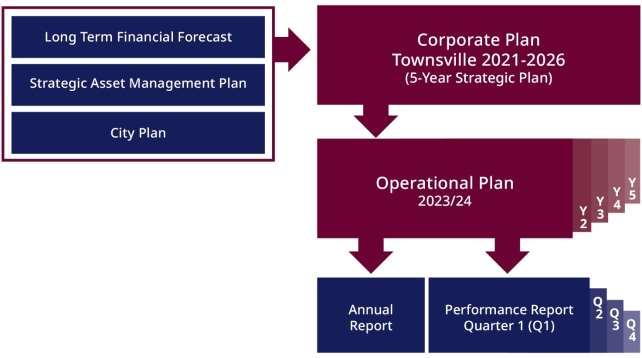
Our Vision
A globally connected community driven by lifestyle and nature Our Purpose Grow Townsville
Our Role
Council’s commitment to excellence in delivery of our everyday services, underpins our success.

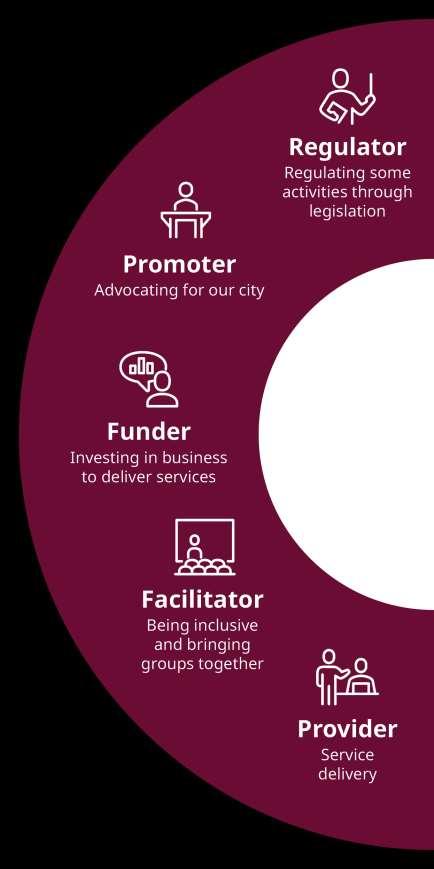
Throughout 2023/24, Townsville City Council recorded numerous achievements towards our Corporate Plan goals as well as some key challenges. An overarching challenge continued to be ongoing operational costs.
A city that connects you to what you need at the time you choose.
As Townsville grows, the ability to participate in activities or access services has progressed past the traditional 9am to 5pm hours. Townsville will continue its journey to being a Smart City, which focuses on enhancing technology that makes life easier, provides access to information easier and is more intuitive to people’s needs.
1.1 A physically and digitally connected Smart City
1.2 A city that facilitates 24-hour access to services
1.3 A vibrant city centred around inclusive connected neighbourhoods

Achievements & Challenges
• Launched Check Your Rates Balance online tool in August 2023, in line with the August rate and utilities notices. This tool gives ratepayers 24/7 access to their rates balance
• Increased visitation to Townsville City Council, What’s On Townsville events and Ticketshop websites
• $6.9m Waterfront Promenade stage 2 completed, with funding support from Queensland Government’s Works for Queensland program. Promenade was opened to the community July 2023
• Continued to grow social media following, to ensure our community is informed. In 2023/24 we recorded 53% increase in visits to Council’s Facebook page on the previous year, and 66% increase in Facebook messenger individual conversations
• Severe Tropical Cyclone Kirrily peaked as a Category 3 system before making landfall as a Category 1 cyclone near Townsville on 25 January 2024 and required considerable green waste clean-up from Townsville’s streets, parks and open spaces
Read more about Goal 1 achievements in Our Performance section, page 55
Goal 2
A circular economy that advances business and moves towards zero waste.
The circular economy model reuses and recycles waste back into other valuable products as opposed to landfill. Also paramount to the transition of a circular economy is supporting local businesses through Council procurement.
2.1 Zero landfill by 2030
2.2 A carbon neutral Council by 2040
2.3 Procurement that encourages business innovation and circular economy principles

Achievements & Challenges
• Grew the number of light fleet vehicles powered by renewable energy from six vehicles to 16, exceeding our 2023/24 target of 12 vehicles.
• Delivered Doing Business with Council sessions to make working with Council easier, including launching Doing Business with Council: Safety Sessions to help local businesses wanting to work with Council but needed assistance understanding Council’s specific safety requirements for contractors and suppliers
• Achieved target of 3% of Council’s total procurement spend to be spent with First Nations owned businesses by 2024
• 30,000 tonnes green waste collected following Tropical Cyclone Kirrily, with a portion of this used as mulch throughout the city
Read more about Goal 2 achievements in Our Performance section, page 56
Attracting industries of the future and world class research and education opportunities will drive population growth and retain our valuable residents. To be competitive, Townsville must have sites ready to de-risk investment, providing positive economic impact to local industries, both directly and indirectly.
3.1 Enabling development ready sites that attract industry, de-risks investment and value adds to supply chains
3.2 Supporting the establishment of renewable energy sources to facilitate green industry
3.3 Lead economic transition that supports future industries and business establishment in Townsville

• Townsville’s gross regional product (GRP) grew by 4.78% from 2022/23 to 2023/24
• Continued to grow Council’s assets powered by local renewable energy from 3% to 3.7%
• North Rail Yards $35m Queensland Government funding secured June 2024. North Rail Yards is a historic rail site, which Council intends to rejuvenate and develop into a community precinct
• Australian Government committed initial funding of $32.2m to advance Stage 1 of NQ Spark, which is North Queensland Simulation Park – northern Australia’s first collaborative industry hub focused on developing defence capabilities. Stage 1 includes the development and construction of an Advanced Environmental Simulation Facility (AESF) and commercial facilities
• Completed Reid Park renewable project, installing 99kW of solar panels
• The strategic position and connectivity of the Lansdown Eco-Industrial Precinct continued to attract strong interest from industry proponents. The precinct aims to support advanced manufacturing and critical minerals processing, leveraging the abundance of low-cost green energy, and supporting the shift towards renewable energy generation
• Same-day approvals for low-risk planning Concurrence Agency Response applications, rose from 7.88% in 2022/23 to 33.56% in 2023/24
Read more about Goal 3 achievements in Our Performance section, page 57

4
A sustainable destination that embraces and participates in the arts, sports, events and recreational activities.
Townsville has world leading open spaces, with over 180km of coastline connected to the Great Barrier Reef, three botanical gardens, parks and parklands across the city and numerous heritage assets. It is important that the community can access these spaces, while balancing protection of the environmental and heritage features. To retain residents of all ages, we are focused on developing our local visual and performing arts, growing our successful signature events and connecting people with sporting organisations.
4.1 Growing the city through world leading placemaking that provides a national and international platform
4.2 Growing the opportunities to participate in sport and support sporting excellence
4.3 Developing homegrown entertainment and arts culture supported by world-class visual and performing arts facilities
4.4 World-class liveability through excellent open spaces which promote, protect, and encourage utilisation of our natural environment and heritage
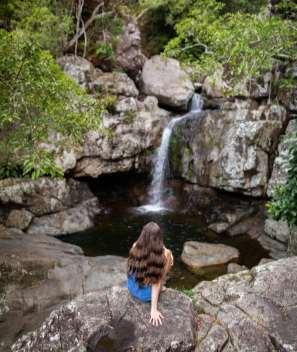

• Population growth of 1.7%, which saw Townsville’s population exceed 200,000 people
• Celebrated one-year anniversary of opening the new Citylibraries Riverway and Pinnacles Gallery at Riverway Precinct
• Increased visitors to Townsville City Galleries by 72% on previous year, largely thanks to the reopening of Pinnacles Gallery
• Continued building Council-owned events website, What’s On Townsville’s presence as the first-stop for finding all events happening in our city. Number of submissions from event organisers continues to increase year-on-year
• Delivered Council’s cherished community and civic events, including Carols by Candlelight, Eco Fiesta, Seniors Expo and Luncheon, Welcoming Babies ceremonies and Citizenship ceremonies, among many others (full list of events page 23)
• Townsville attracted international superstar P!nk to perform to 65,000 fans over two sensational nights
• Successfully delivered Get Active expos, to promote and support grassroots sporting clubs
• Yellow Crazy Ants infestations were identified throughout Townsville, at multiple locations. Council secured federal government funding to tackle this serious biosecurity concern
• Continued delivery of critical species weed control (Limnocharis/White Ball Acacia and Gamba Grass)
• Completed seven hazard reduction burns, covering more than 700 hectares, and installed four water pipelines on Castle Hill
• Delivered six sand renourishment projects at Rowes Bay, Toolakea, Horseshoe Bay, Nelly Bay, Balgal Beach and The Strand. Completed coastal revegetation projects at Toolakea and Toomulla
• Updated Townsville Biosecurity Plan including undertaking stakeholder engagement
Read more about Goal 4 achievements in Our Performance section, page 58
Goal 5
A leading centre of education, training and research commercialisation.
Townsville already stands as an education and research leader, with worldwide recognition for its marine science and management of the Great Barrier Reef, leading tertiary hospital in Northern Australia and ground-breaking research in tropical science with TropiQ. Research commercialisation will create jobs and demonstrate new pathways for school leavers, develop local industry and supply chains, and support Defence initiatives.
5.1 Formalising partnerships with industry, research institutes and all levels of government to support growth, innovation and resilience across the economy
5.2 A world-leading centre of research commercialisation that drives local manufacturing
5.3 A specialist leader in research and simulation

Achievements & Challenges
• Delivered 23 disaster training courses and exercises, to build a capable disaster response workforce and an informed and resilient community
• 22 businesses benefited from economic activation incentives (up 37.5% on previous year)
• Continued growing Townsville Laboratory Services’ private work
• Townsville Laboratory Services was recognised alongside some of the largest laboratories in the world by Earth Science Information Systems (EScIS), for its world-class data management
• Successfully led local disaster coordinated response through Tropical Cyclone Kirrily, which peaked at Category 3, and made landfall as Category 1 northwest of Townsville on 25 January 2024
Read more about Goal 5 achievements in Our Performance section, page 59
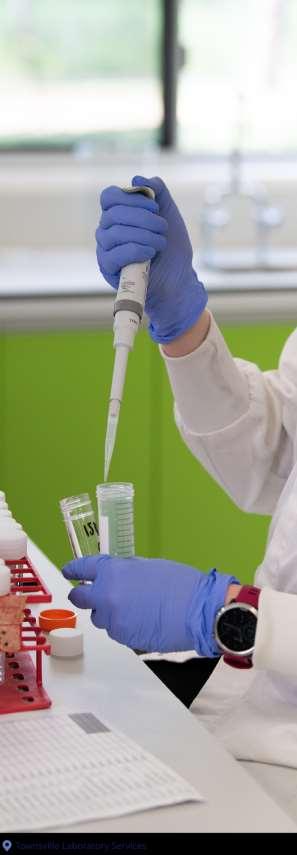
Townsville City Council has numerous stakeholders, and many ways in which we communicate and engage with them. This helps us shape the future city of Townsville.
Stakeholder How we communicate Why we communicate
Ratepayers
Residents and general community
Rate and utilities notices, Council website, Annual Report, Budget & Operational Plan, messages on hold, social media, media
Council websites, social media, eNewsletters, messages on hold, Councilowned digital screens, Live Townsville community magazine, Have Your Say Townsville community consultation platform, community forums, community funding, Council reports, advertising
Ratepayers help fund Council’s core services and the growth of our city. It is important they can see how their rates and utilities are spent.
Our community receives consistent communication about the events, services and information that matter to them. We use both broad and targeted communication to send out messages. We receive community feedback through our customer service centre and elected officials, feedback at events and community forums.
Business community
Clubs and community groups
Government
Media
Employees
Business events, forums, meetings and networks. Formal partnerships, sponsorships and grants. Council website, social media, media, Council reports
Email, e-Newsletters, events, forums and meetings, partnerships, sponsorships and grants
Meetings, forums and events, correspondence inc. letters and emails, events, formal partnerships and agreements
Media releases, alerts and statements, Council website, interviews
Intranet, email, toolbox talks, SERVE stories (email and printed), posters, digital screens, computer screensavers, payslip messages, A Moment for Safety annual event, events and training, meetings
Council aims to support the business community in creating opportunity for economic growth and innovation for our city.
Council regularly engages with local groups that represent all parts of our community. These groups offer insight into what’s important to residents.
Both state and federal governments are key stakeholders for Council, providing funding and partnership for local government.
Media help connect important messages to the community and raise awareness of our services, as well as help build Council’s reputation.
Our almost 1,700 staff are also residents of our community. They deliver for their neighbours every day, and are an important source of information for residents.
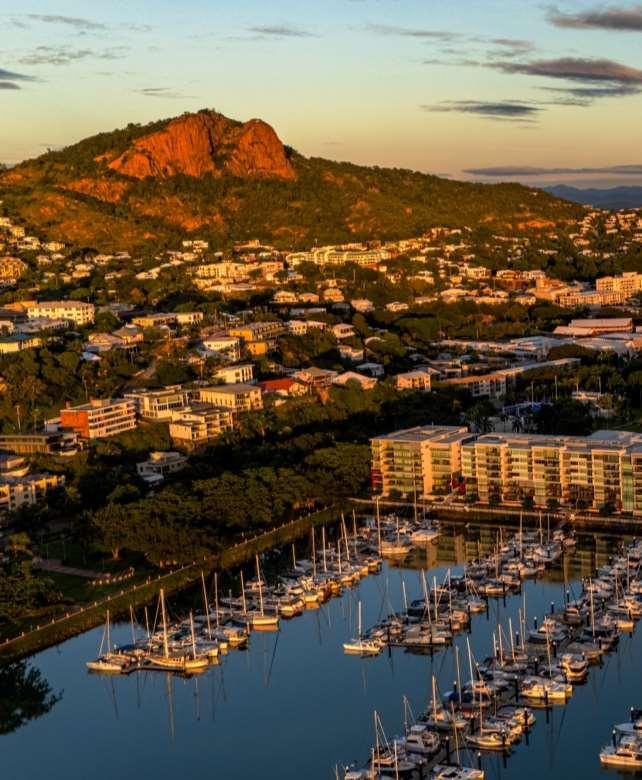
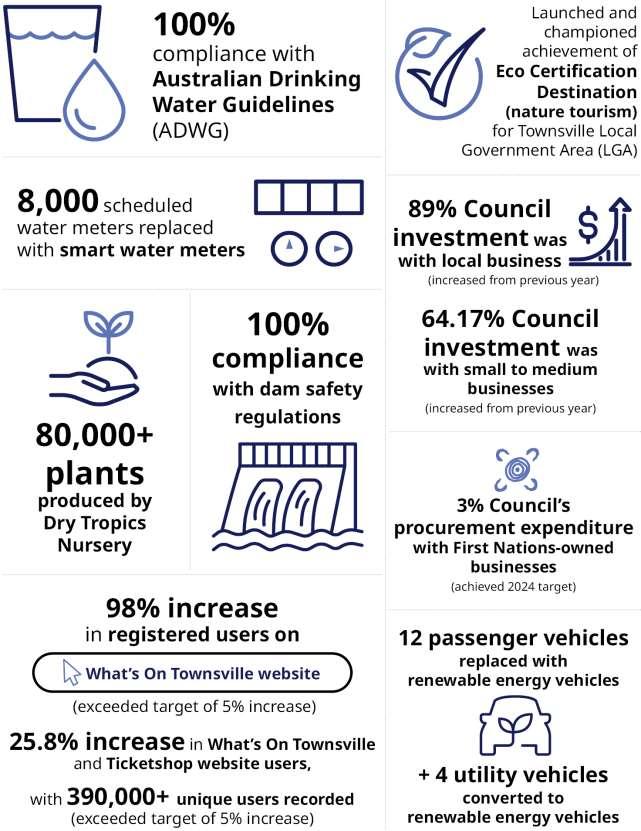
Council invests ratepayers’ rates and utilities back into our community. In 2023/24, every $100 was spent on the following infrastructure and service costs.


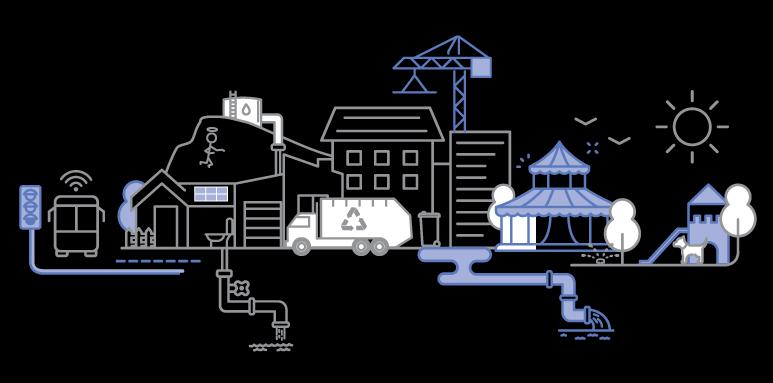





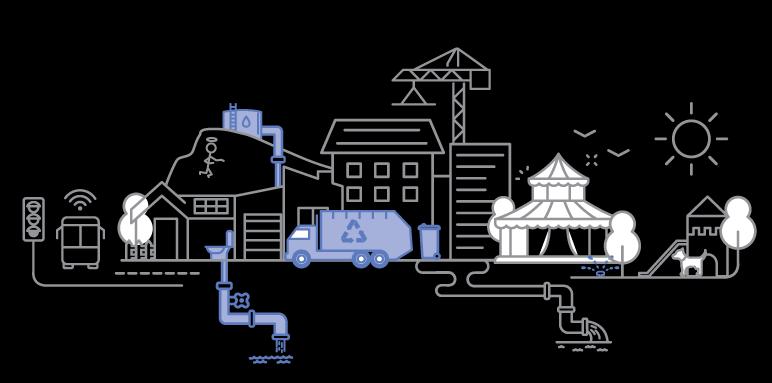


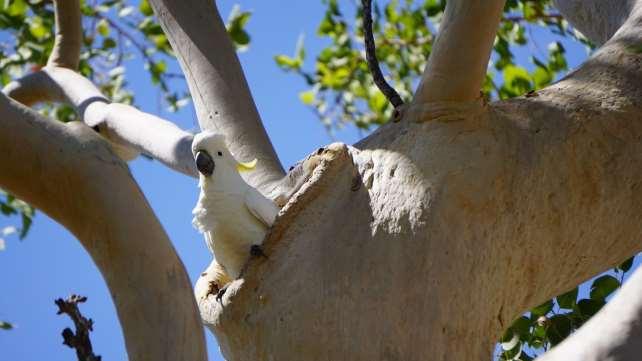
Townsville City Council is committed to supporting our community to be a Sustainable Destination, a destination which celebrates lifestyle and nature, driving growth, while fostering and celebrating world-class natural assets and environments.
Council is delivering for our community on these commitments, with integrated sustainability initiatives, implementing city-wide sustainability systems and solutions outcomes, to help progress towards less carbon emissions, reduced costs for Council energy, and working to protect and restore the natural landscapes in which we live. This work involves facilitating a place for all, where visitors and residents alike support, enjoy and embrace our diverse natural landscape full of nature-based recreational opportunities, experiences, and events.
It is through this consistent endeavour, that in April 2024, Townsville was awarded ECO Destination Certification at the Nature Tourism Level, a globally recognised achievement level through Ecotourism Australia.
This achievement is an internationally recognised outcome of delivering and innovating lower cost and tropically appropriate sustainable practices across water, energy, nature, residents and business, including installing 1.6MW of renewables across multiple buildings, facilities, and sites over the past 10 years. Our outcomes in the 2023/24 financial year, support our progressive achievement in delivering recognised Sustainable Development Goals appropriate to our local conditions, lifestyle, economic environment and supporting an ecologically sustainable industrial base in Townsville and at Lansdown Eco-Industrial Precinct.
In this regard, Townsville is home to world-class, and awe-inspiring landscapes that tell unique cultural, environmental, and social stories relevant to us all, and is commencing to recognise our First Nations values through on-ground action and environmental jobs.
Townsville’s urban environment is embedded and intertwined amongst sprawling tropical savanna grasslands, eucalyptus woodlands, rainforests and four internationally recognised and world-class environmental areas, which residents live in and enjoy exploring, these include:
• 180km of coastline connected to the Great Barrier Reef World Heritage Area
• connection to the Wet Tropics World Heritage Area
• internationally protected wetlands (RAMSAR-listed)
• migration path of the East Asian-Australasian Flyaway Bird Migration
In the past year Council has implemented key outcomes across our Corporate Plan.
Table 1 - Key sustainability achievements 2023/24
Achievement Corporate Plan goal
Transitioning Council to energy and carbon neutral
Powering Council’s assets with renewable fuels
Activating Townsville as a Sustainable Destination
Conducting Environmental monitoring and sensing
Delivering Environmental Systems and Solutions that build capacity to respond to environmental challenges
3.2.1 Generation of green energy and fuels for use within the region and export
3.2.3 Transition to Council assets powered by renewable energy and supported by batteries
4.1.2 Enhancing existing tourism offerings and creating new landmark tourism destinations (built, cultural and natural environment)
4.4.2 A well-educated community that participates in the protection and promotion of our dry tropics and reef coast.
The following key projects highlight implementation of Townsville City Council’s Operational Plan over the past year in support of our Corporate Plan outcomes.
ECO Destination certification
In April 2024, Townsville was awarded ECO Destination certification at Nature Tourism Level by Ecotourism Australia. This incredible feat could not have been achieved without the long list of community-led and Council supported sustainability programs and businesses that are taking big (and small) steps toward progressing Townsville into a world-leading sustainable destination (featured in the Top 100 worldwide). Read more, page 63
External environmental grants
Council sought to achieve external environmental grants for implementing key environmental outcomes and specifically critical regenerative and restorative landscape projects where our Council, community, and business work in partnership. We successfully achieved grants and external funding opportunities to help support Reef Assist, Coastal Restoration, Disaster Recovery Funding Arrangements (DRFA) Riparian Recovery, and Reef Guardian Councils.
• Reef Assist 2.0 – for Business Activation and Environmental Restoration Grant, which resulted in:
o Supported employment of 38 project participants and supporting staff
o Delivered 24 training courses
o Over 10,000 native tubestock planted
o Of the 30,000 tonnes of green waste collected following Tropical Cyclone Kirrily, 5,000m3 by volume of this mulch (c. 2,000 tonnes) was biologically activated for amplifying end soil health, diverted from landfill and used for beneficial reuse in waterways and erosion sites across our city, including Bushland Beach Channel Naturalisation. Read more, page 64
o Approx total of 10ha of soil health improved within the Bohle River catchment
o 6ha of gully stabilisation and remediation has been delivered
o 9kg of native seed has been collected and stored
o 1,160m of riparian revegetation has been undertaken
• Reef Guardian Council’s grant for landscape environmental restoration and purchasing and installing a battery at Riverway Stadium to reduce costs and innovate behind the meter solutions and pathways to future microgrids.
In addition, Council in partnerships achieved two further Federal and State environmental grants, including:
• Reef Coastal Restoration Grant – for estuarine wetlands at Oonoonba and Bushland Beach – funding acquired for delivery in 2024/25
• Riverbank (Riparian) Disaster Recovery Grant for environmental maintenance works associated with 2019 Monsoonal flood impacted areas – funding acquired for delivery in 2024/25
Bushland Beach Channel Naturalisation Project Council’s Civil Works and Sustainability sections worked to implement and innovate lower cost drain and wetland restoration at Bushland Beach. This living, breathing waterway is not a manicured garden bed, but a dynamic system that will change in appearance over 2 to 10 years. 97,000 plants of 75 different local native species have been sourced, grown and planted utilising local businesses and contractors, including First Nations businesses and crews. The carefully selected local native trees, shrubs, grasses, and sedges will continue to grow, spread, drop leaves, and shade-out weeds overtime. Works have included revegetated and restored creeks, ponds, trees and grassland environment of this reshaped drain will demonstrate a new city-wide benchmark on how to reduce the amount of longterm maintenance required to our waterways and provide numerous environmental benefits for wildlife and people, including:
• improved biodiversity with native vegetation that shades out unwanted plants and weeds over time
• natural mosquito control through the provision of a habitat for mosquito predators
• soil amelioration, which will reduce erosion, aid water penetration, promote plant growth and improved soil quality to support native vegetation and trees which will in turn stabilise the banks
• increased cross-sectional capacity of the channel, which will slow flood waters and slightly decrease water levels
• enhanced aesthetic for people and passive recreation - a channel that is reimagined as a living waterway rather than an urban drain
• improved water quality through natural filtering systems and the inclusion of accessible ponds designed for easy maintenance.
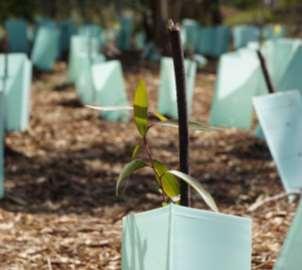
Weeds to Healthy Soils Program Council implemented key landscape regeneration processes across native grasslands, woodlands and riverbanks, removing multispecies weeds and turning them into environmentally beneficial products and services, including delivery of:
• new environmental restoration sites across the LGA
• diverted over 1,000m3 of city organics from landfill – converting back into beneficial living mulch and soil material
Creek to Coral – Partnerships identifying and managing impact from urbanisation on marine environment
On-going partnership and support across key stakeholders, including provision of support to local water sensitive city initiatives and outcomes, including:
• Dry Tropics Partnership for Healthy Waterways, with multiple stakeholders
• Creekwatch outcomes for schools and residents;
• conducting school visits and educational ecocatchment tours, community events and collaborative learning
• reducing impact on marine environment through sound planning and management of our urban landscape.
Ross River Dam Catchment
• Regenerating soils, improving water quality and ecology post woody weed removal
• On-Country workshop and training days to connect council, local business and research partners
• Developing low-cost environmentally sensitive approaches to landscape scale land management
Bio-Regen Project on Magnetic Island
• Co-developed with the community and industry to divert food waste from landfill and create a soil enhancer product
• Over 3,182kg of food waste diverted from landfill and created low-impact soil enhancer for local community gardens.
Environmental Operations, Systems and Support for healthy waterways and sustainable environments across our urban landscape
• Council monitored, reported on and successfully remediated any large-scale fish die offs in our urban lakes and waterways, prior to an event for the first time
• Installed long range, lower powered and tropicalised sensor systems which will assist environmental data collection, integration, optimisation and visualisation for informing Council, residents and making decisions
Council was recognised for its outstanding contribution to the Townsville community, receiving a number of awards and nominations in 2023/24. These awards and nominations acknowledge the innovative work in key areas and further demonstrates our leadership in local government.
Winner–LargeEmployeroftheYear
North Queensland Training Awards
Awarded by: Queensland Training Awards
Awarded to: Townsville City Council Date awarded: 29 July 2023
Winner–Categoryfour:Mostsignificant improvementtoworkhealthandsafety performance
Work Safe Queensland Work Well Awards
Awarded by: Office of Industrial Relations Queensland
Awarded to: Townsville City Council Date awarded: September 2023
Winner–CommunityRoadSafety
IPWEA-QNT Excellence Awards
Awarded by: Institute of Public Works Engineering Australasia (IPWEA QNT)
Awarded to: Townsville City Council Date awarded: 11 October 2023
Winner–HarryHauenschildApprentice oftheYear
The Harry Hauenschild Apprentice of the year Award
Awarded by: Queensland Training Awards
Awarded to: Benjamin Zabel
Date awarded: 29 July 2023
Winner–WorkplaceReconciliation Champion2023
Spirit of Reconciliation Award
Awarded by: Townsville City Council
Awarded to: Arnold Dolinski, Civil Delivery, CMO
Date awarded: 28 May 2024
Winner– GoldAward
2023 QPLA Local Government Awards
Awarded for: Citylibraries Riverway build and grand opening
Awarded by: Queensland Public Libraries Association (QPLA)
Awarded to: Townsville City Council
Date awarded: 16 October 2023
Winner– GoldAward (ARA2024GeneralAward)
Australasian Reporting Awards
Awarded for: 2022/23 Annual Report
Awarded by: Australasian Reporting Awards
Awarded to: Townsville City Council Date awarded: 23 May 2024
Winner–CommunityEngagement ReconciliationChampion2023
Spirit of Reconciliation Award
Awarded by: Townsville City Council
Awarded to: Townsville Citylibraries
Date awarded: 28 May 2024
Winner–QueenslandLibraryAchiever oftheYear2023
2023 QPLA Local Government Awards
Awarded by: Australian Library and Information Association (ALIA)
Awarded to: Nicole Hunt
Date awarded: 8 November 2023
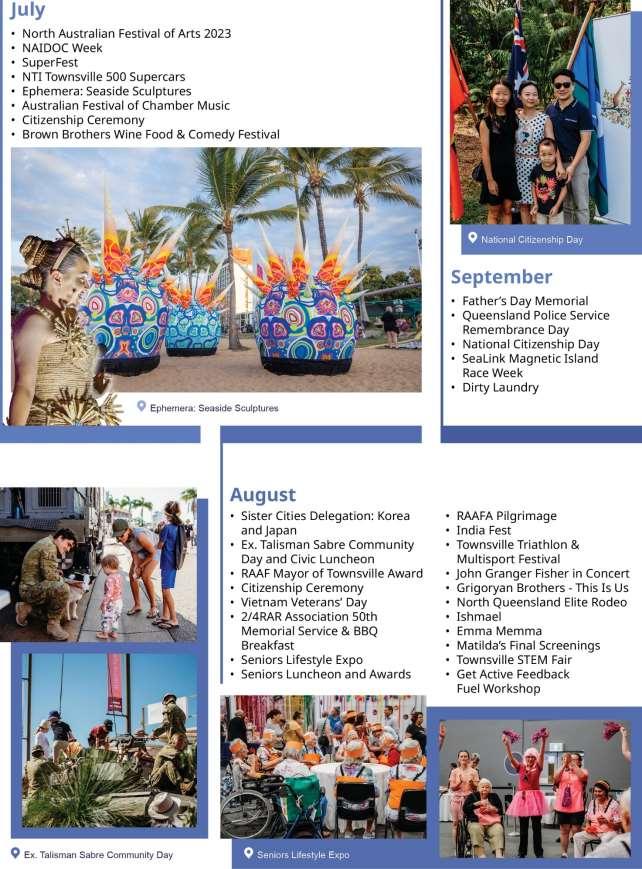
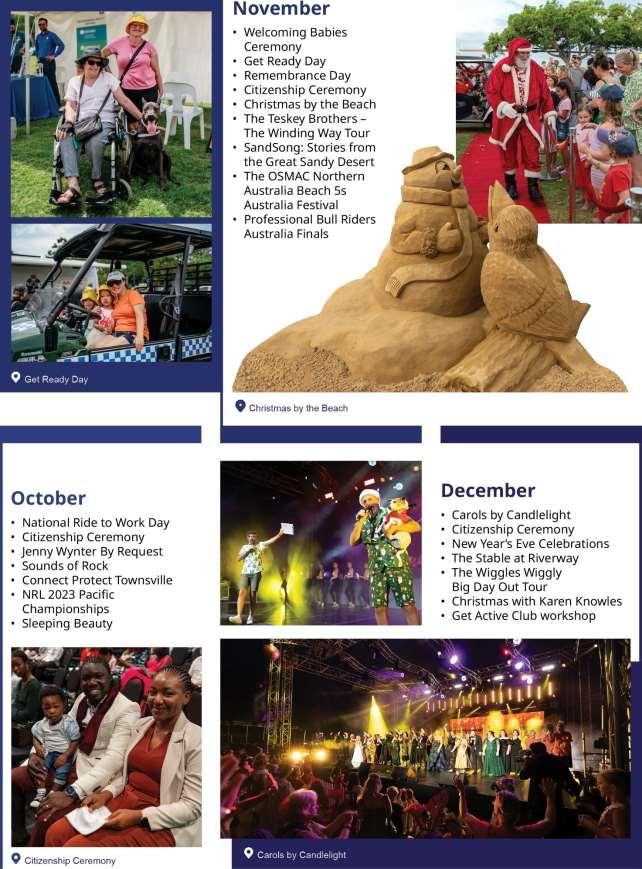

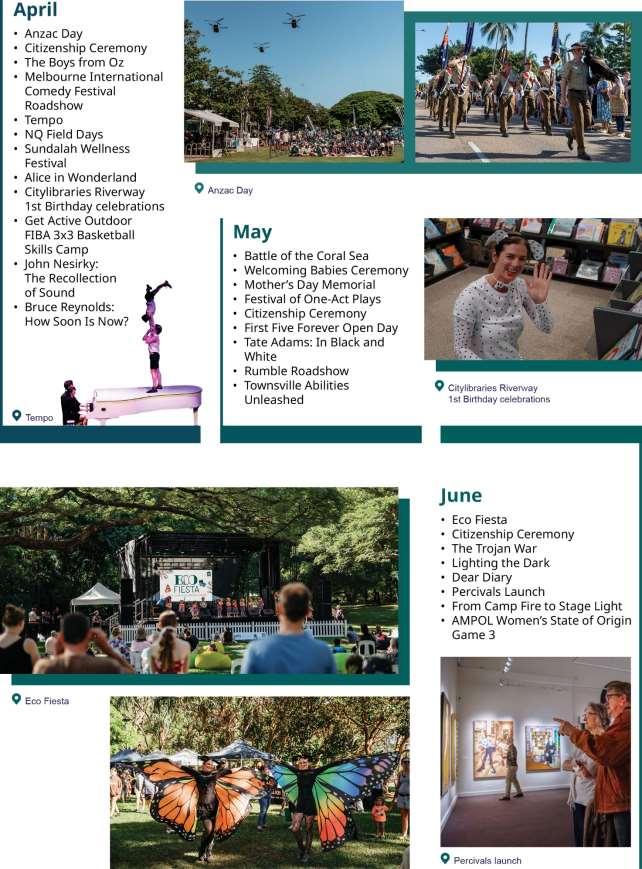
Building and maintaining strong relationships between Townsville City Council and local, statewide and national media is a central focus for the organisation.
Townsville is home to some of Queensland’s largest news outlets, including the Townsville Bulletin, ABC North Queensland and 7NEWS Townsville newsrooms. As the country’s largest garrison city and the home of two major universities and a training hospital, Townsville also garners a large amount of state and national media coverage. As such, Council places a strong importance on fostering positive relationships with the media to ensure strong coverage for positive proactive stories and fair and accurate responses for all enquiries.
Council issued 266 media releases and 327 media responses in the 2023/24 financial year.
ECO Destination Certification
Townsville received its long-awaited ECO Destination Certification in early 2024. Townsville is the third destination in Queensland and the ninth in Australia to become an ECO Destination, solidifying the region as a leader in sustainable ecotourism. Council, in partnership with the Queensland Government and Ecotourism Australia, generated a significant number of strong media stories from this campaign, including in 7NEWS, Townsville Bulletin and The Daily Telegraph.
Tropical Cyclone Kirrily Council’s Tropical Cyclone Kirrily messaging generated more than 1,700 media items, spanning local, national and international media. Coverage included daily live crosses to national television programs Sunrise and Today, as well as all-in media conferences including SBS World News, 7NEWS, Sky News, WIN News, 9News, The Australian, The CourierMail, Townsville Bulletin, ABC North Queensland and more. Then-Townsville Local Disaster Management Group chairperson Jenny Hill undertook up to 12 radio and TV media interviews per day, with a significant number of additional interviews fielded by the media team. From January 24 to March 4 Council distributed 21 media releases and three advertorial stories updating the community on the weather event and subsequent clean-up efforts.
Water awareness campaigns
El Nino weather conditions, existing blue-green algae and Tropical Cyclone Kirrily combined to create a city-wide challenge: Townsville needed to slow down its water consumption in order for water to be treated properly for blue-green algae. Council worked with the media to provide frequent updates on water conditions and to encourage the community to reduce water consumption. The topic was covered widely across print, radio and television and was effective in reducing the community’s water use, helping unite our Council and city in achieving a common goal.
Ephemera: Seaside Sculptures
Townsville City Council’s Ephemera: Seaside Sculptures generated significant media coverage across print, TV, radio and digital news. The internationally recognised biennial Ephemera: Seaside Sculptures has been running for 22 years and included six non-competitive invited artists and 25 competitive artists. Media coverage of the event helped draw more than 260,000 visitors to the event across its two-week showing at Townsville’s premier waterfront esplanade The Strand.

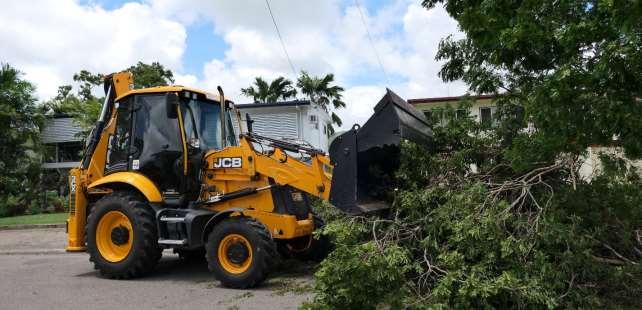
On 25 January 2024, a severe tropical cyclone made landfall just north of Townsville. The system peaked as a Category 3 system in the Coral Sea, shortly before crossing the coast as a Category 1 tropical cyclone.
More than 30,000 homes were without power, trees and powerlines were down across the city, and multiple properties were damaged.
Townsville City Council is skilled in disaster management, playing a key role in running Townsville’s Local Disaster Coordination Centre (LDCC). When severe Tropical Cyclone Kirrily was tracking directly towards Townsville, Council staff kept the community well-informed through Council’s emergency management disaster dashboard, social media and media outlets, provided shelter and evacuation options for residents and animals, and worked closely with other stakeholders in the LDCC to manage power outages and emergencies.
Tropical Cyclone Kirrily resulted in one of Council’s largest clean-up efforts, with dozens of teams deployed across the city to assist with removing hazardous green waste from Townsville’s streets, parks and open spaces.
More than 120,000 ute loads of green waste were collected from kerbsides by Council in the six weeks following the cyclone crossing. Some 30,000 tonnes of green waste was collected and more than 1,800km of roads maintained in the cyclone’s aftermath.
Council crews worked in challenging conditions including extreme heatwaves, heavy rainfalls and king tides.
During this period Council also operated temporary green waste recovery sites at Lou Litster Park, Hervey Range, Stuart, Toomulla, Bluewater and Magnetic Island, where residents and contractors disposed of more than 18,000 tonnes of domestic and green waste.
Townsville’s three botanical gardens were each affected by the extreme weather system, with an extensive cleanup operation undertaken to make the gardens safe before reopening to the public. This work included removing green waste like trees and branches. Council also opened its transfer stations for free green waste disposal. Recovery crews worked to clear more than 1,800km of road verges across the city, including subsequent mowing and slashing of long grass in time for the launch of Townsville’s events season.
Council extended its thanks to the residents of Townsville who offered their assistance and understanding during the clean-up process.

Townsville City Council is committed to delivering projects for the community, from water security and industrial infrastructure to community leisure facilities. These investments will cultivate a thriving, connected, resilient and sustainable community and city for tomorrow.
Funding: TCC, AG, QG
Jobs: 150
Status: In progress
Lansdown Eco-Industrial Precinct aims to become Northern Australia’s foremost precinct for advanced manufacturing, processing, technology and emerging industries.
The first of several enabling infrastructure projects has been completed with Council’s construction of No-Name Road Stage 1 and the upgrade of the Flinders Highway intersection. The access road and intersection will facilitate safe and functional access for Type 2 Road Trains, construction traffic, and proponent access to their sites within the precinct. Enabling works are set to continue with the installation of the raw water pipeline, construction of the raw water storage reservoir, and further stages of the northern precinct road access. Planning and design for the upgrade of the Old Flinders Highway intersection, Woodstock Avenue
and Jones Road is ongoing, ensuring safe and efficient access for precinct traffic, while improving the access and amenity to the Woodstock township. This intersection upgrade will also improve the safety of the rail level crossing with the Mount Isa Line.
The Lansdown Eco-Industrial Precinct has already attracted substantial private sector interest with land conditionally allocated to polysilicon manufacturing, clean energy, sustainable fuels, and critical minerals processing industries.
The precinct was declared a prescribed project in March 2023, paving the way for a major green manufacturing hub and a new era of growth for North Queensland.
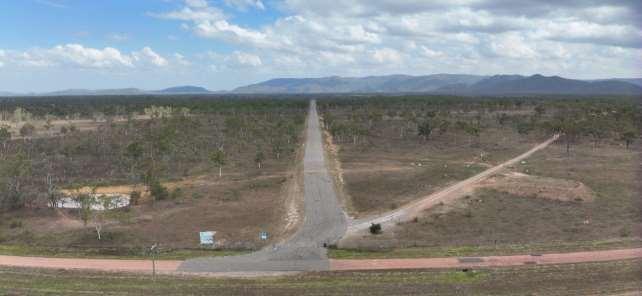
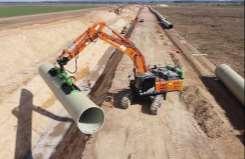
Funding: TCC, QG
Jobs: 300 for Stage 2
Status: Stage 1 complete, Stage 2 in construction
A Townsville City Council and Queensland Government funded water security initiative for Townsville, the pipeline will support the city’s Ross River Dam water catchment. When complete, the water pipeline will provide greater capacity to provide raw water into the Ross River Dam to “top up” water levels for the Townsville community and industry during periods of very low rainfall.
The pipeline alignment, design and Commonwealth environmental approval required under the Environmental Protection and Biodiversity Conservation Act 1999 are complete and construction of the pipeline is underway. The completed pipeline will be a major piece of infrastructure that will serve our community for over 50 years.
Stage 2 of the Haughton pipeline will connect and extend the existing Stage 1 pipeline, completed in 2020, from the Haughton River to the Burdekin River near Clare.
Stage 2 of the Haughton Pipeline Project is developed with the support of the Queensland Government in association with Townsville City Council.
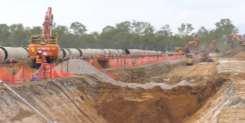
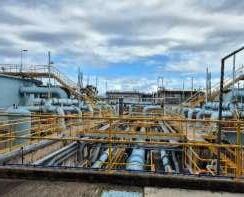
Pipeline
Funding: TCC, TMR, QG
Jobs: 150
Status: In progress
Council is delivering the new Ross River Dam to Douglas Water Treatment Plant (WTP) pipeline, a key water infrastructure asset essential to Townsville’s water supply which provides 85% of the city’s water. The new pipeline will further enhance Townsville’s water security. This project is part of Council’s investment in water infrastructure and services, continuing our strong focus on water security and ensuring Townsville’s water supply for decades to come to support future development of the city.
Construction is continuing on the 9.5km pipeline, which runs adjacent to Riverway Drive, across the Ross River and through the Mount Stuart Training Area.
Approximately 4.5km of the 1.29m diameter pipe has been installed across two construction packages, the project stands at 95% completion. Council is investing to increase the resilience of this crucial asset and enhance Townsville’s water security. The new Ross River Dam to Douglas WTP Pipeline is planned to be in operation mid-2024.
This project was developed with the support of the Queensland Government in association with the Townsville City Council.
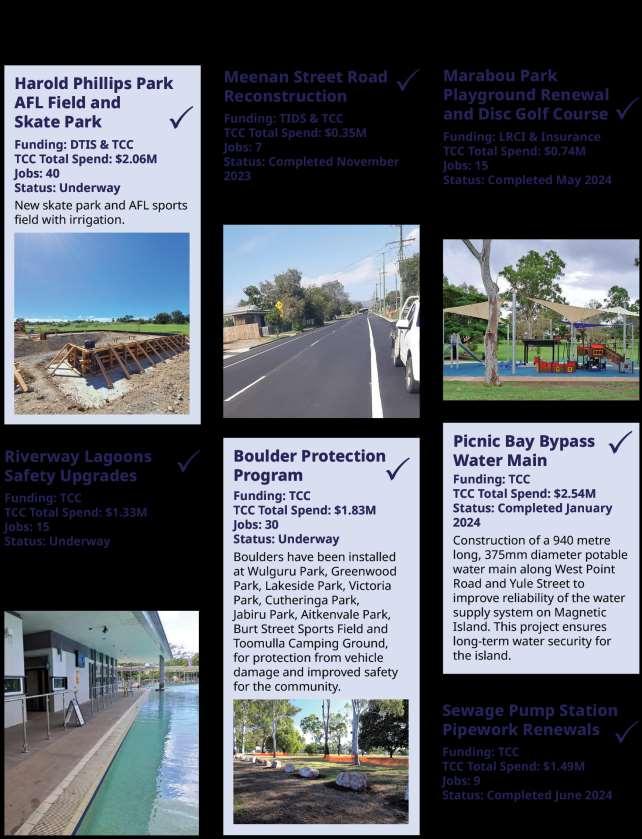
Note: All TCC total spend amounts are spend from Townsville City Council in the 2023/24 financial year
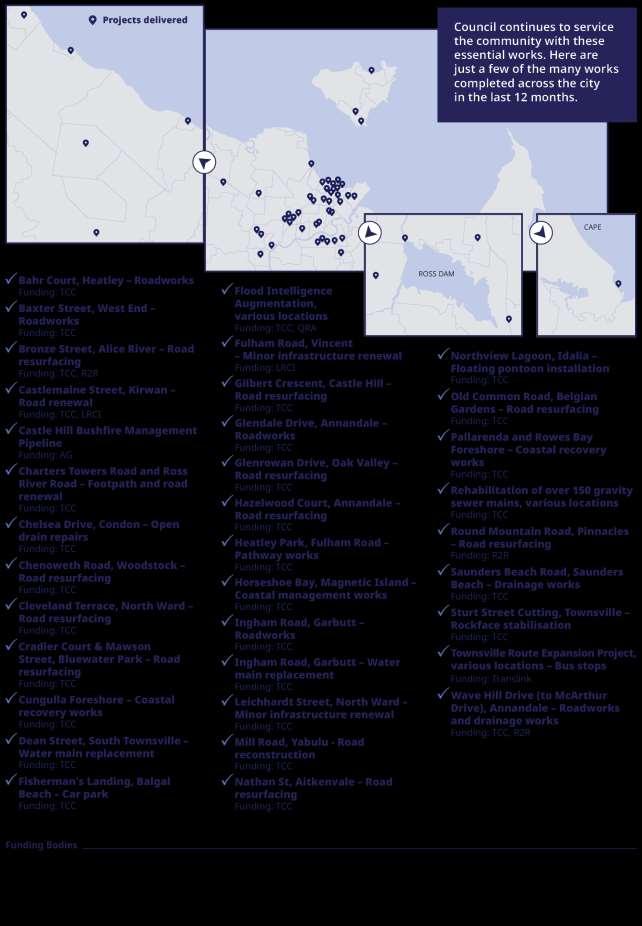

Looking forward to the 2024/25 year ahead, Townsville City Council is committed to strong financial management and developing and delivering a new strategic Corporate Plan.
Our year in review
The 2023/24 financial year was marked by both substantial progress and significant challenges for our community. Council continued to deliver key infrastructure projects, community services, and sustainability initiatives while navigating an increasingly complex economic landscape. The year was defined by cost pressures associated with materials and services as well as a shortage of skilled labour which contributed to increased project and operational costs.
Tropical Cyclone Kirrily impacted our community in January, with extensive repair and clean-up work across the city (page 28) extending into March. On 16 March our community voted in the Queensland Local Government election, with a new Council being sworn into service on 10 April.
Notable achievements include the continuation of water security projects, upgrades to infrastructure and parks, and ongoing delivery of events and services that have directly improved the quality of life for our residents.
Townsville cemented its reputation as the sports and events capital of the North, bringing world class events to our residents such as P!nk (page 61), V8 Supercars and Queensland Reds (rugby union), as well as Townsville Fire (WNBL) season and finals games, NQ Cowboys (NRL and NRLW) season, and the Suncorp Spirit Cup (netball).
Looking forward to the 2024/25 financial year, inflationary pressures are expected to persist, particularly in construction and the broader supply chain. Council is focused on delivering a capital works program that remains on track while balancing fiscal responsibility.
Council will continue to implement innovative efficiency measures, such as our new Enterprise Resource Planning system, which is customer centric and will enhance the quality of Council’s services to our community.
For our community, it is recognised that the cost of living and housing affordability will be a key economic consideration. Council is working closely with the Queensland Government and private developers to support rapid delivery of housing in the region.
Council will continue to provide much loved, at low-cost to the community, events to enhance liveability and connectedness for our residents.
In 2025, Council will deliver a new Corporate Plan developed from community feedback and consideration for the economic environment in which we are operating as well as identifying opportunities for the city’s prosperous future. The Corporate Plan provides intentional leadership for the city and continues to build on work undertaken by former councils while shifting to meet emerging global and local challenges and opportunities.
Strong fiscal management will be a core focus of both short- and long-term planning for the city during the 2024/25 financial year, with every action undertaken focused on meeting the needs of our residents today without impeding residents’ needs into the future.
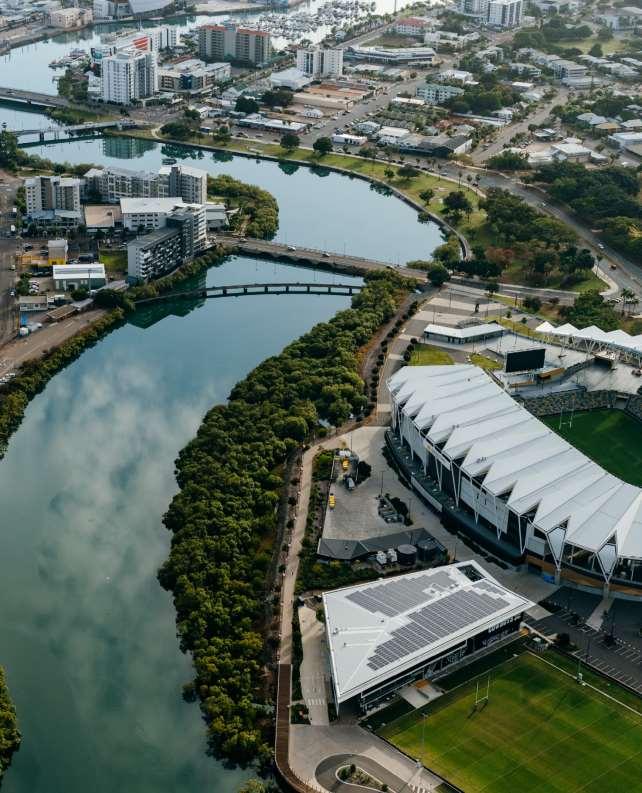
Total Land Area: 374,201 ha
Estimated Population (2023): 201,433
Population Density: 0.54 persons per hectare
DIVISION 1
Population: 22,076

DIVISION 3 Population: 19,712

DIVISION 2
Population: 21,860

DIVISION 5
Population: 19,255

DIVISION 6
Population: 21,110

DIVISION 4
Population: 19,817

DIVISION 10
Population: 20,245

DIVISION 9 Population: 17,969

DIVISION 7 Population: 20,289

DIVISION 8 Population: 19,100
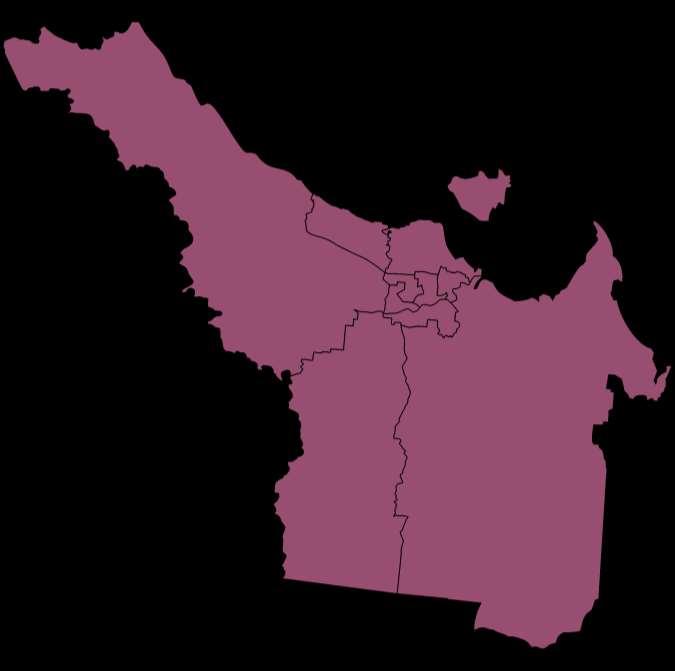
Source: Australian Bureau of Statistics, Estimated Resident Population at 26 June 2023

Cr Troy Thompson
Mayor of Townsville
0428 890 229
mayor @townsville.qld.gov.au
Term of office: 1
Mayor Thompson professes to be a man of the community, for the community.
Born in Perth, his family lived in Adelaide, Melbourne due to his father’s service in the Australian Army, before settling in Townsville, where he completed his schooling.
His notable career highlights include spending five years in Germany as a Commercial Manager for Avetta, overseeing the Europe, the Middle East and Africa region before returning to Australia in 2015 to accept an opportunity in a CEO role.
Locally, Cr Thompson served as Chairperson of the Aitkenvale Sporting Association (now known as Community ASA), reflecting his love for sports and community involvement.
He enjoys spending time with his partner Michelle and family.
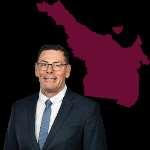
Cr Paul Jacob Deputy Mayor of Townsville Division 1
0461 347 577
paul.jacob @townsville.qld.gov.au
Term of office: 2 (non-consecutive)
A Townsville resident for more than 30 years, Councillor Jacob is serving our community in his second term.
Born in Sydney, Cr Jacob started out as an Electronics and Communications Technician, working in remote locations across Australia. This experience equipped him with a strong understanding of infrastructure and essential services.
Cr Jacob has contributed to our city through his work at Townsville Human Capital, James Cook University, and The Townsville University Hospital.
Cr Jacob is dedicated to supporting a back-to-basics approach, prioritising essential infrastructure like roads, transport, sewerage, and transfer stations to build a strong foundation for our city’s future.
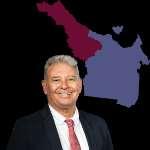
Cr Brodie Phillips
Division 2
0461 442 642
brodie.phillips
@townsville.qld.gov.au
Term of office: 1
Born and raised in Townsville, Councillor Phillips has a deep connection to the city’s rich heritage and vibrant community.
His passion for serving the community began with active involvement in local social media groups
With a diverse background in justice, retail, finance and banking, he brings a breadth of experience to his role.
Since moving to Division 2 in 2018, Cr Phillips has embraced life in the area with his two sons and has become a passionate advocate for progressing key local interests.
Cr Phillips envisions Townsville as a city where residents can live, work, and play, no matter their interests, to foster a thriving, inclusive community for all
Qualifications:
Diploma of Justice Studies
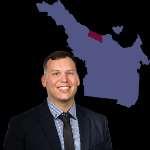
Cr Ann-Maree Greaney
Division 3
0448 378 111
ann-maree.greaney @townsville.qld.gov.au
Term of office: 3
Councillor Greaney is a passionate advocate for initiatives that enhance community liveability and create investment and job opportunities in our great city.
Prior to becoming a councillor, she worked with Tec-NQ, the Townsville Hospital Foundation and over 10 years with Townsville City Council as special events and protocol officer.
As a Member of the Australian Institute of Company Directors and a former Board Member of the Cowboys Leagues Club, she brings valuable leadership and governance skills to her role.
Cr Greaney and her husband have two adult sons and their beloved dog, Humphrey.
Qualifications:
Member of Australian Institute of Company Directors
Diploma of Education
Executive Certificate in Event Management

Cr Kristian Price
Division 4
0461 481 414
kristian.price
@townsville.qld.gov.au
Term of office: 1
Councillor Price has proudly called Townsville home since he was 10 years old, and his deep-rooted connection to the community continues to shape his values and vision for the city.
Starting his career in civil work and construction, he discovered a passion for hands-on work, later moving into mining, where he rose from entry-level “nipper” to a certified supervisor
Embracing a new challenge, Cr Price turned his attention to hospitality, opening a successful pizza restaurant. This experience deepened Cr Price’s appreciation for the tenacity and spirit of Townsville’s residents and equipped him with valuable insights into local business needs.

Cr Vera Dirou
Division 5
0461 418 618
vera.dirou
@townsville.qld.gov.au
Term of office: 1
Born and raised in Townsville, Councillor Dirou has always called this city home, even during years of travel with her husband’s military service. Since returning in 2008, she developed a deep appreciation for local government’s role in shaping our community’s day to day life
With a career spanning two decades in the Department of Defence, specialising in logistics, compliance, auditing, and administration, Cr Dirou brings a broad range of skills and experience to her role as Councillor.
She is a passionate advocate for transparent, accountable leadership in all levels of government.
With her dedication and vision, she strives to make Townsville an even better place to live, work, and thrive.
Qualifications:
Diploma of Quality Auditing
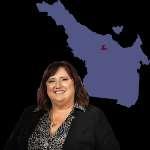
Cr Suzy Batkovic
Division 6
0434 939 419
suzy.batkovic
@townsville.qld.gov.au
Term of office: 2
Prior to being elected, Councillor Batkovic was a professional athlete, playing basketball for 23 years in the USA, Europe and Australia. During this time, she represented Australia at three Olympic Games (2004, 2008 and 2012), claiming two silver medals and a bronze, and represented at two World Cups.
In 2024, Councillor Batkovic was inducted into the Australian Basketball Hall of Fame.
Playing professional sport has taught Cr Batkovic about teamwork, leadership, compassion and the importance of listening, how to fight for what is right and, most importantly, what it takes to work together to achieve positive outcomes.
Cr Batkovic has twin daughters and has lived in Division 6 for the last 10 years.

Cr Kurt Rehbein
Division 7
0439 847 860
kurt.rehbein
@townsville.qld.gov.au
Term of office: 3
Now in his third term, Councillor Rehbein holds a genuine passion for serving community.
Born in Townsville and raised in Ayr, where his family owned a local convenience store, he learned early on about the value of community connection and the important role of small businesses.
Throughout a diverse career as a cabinetmaker, RAAF military dog handler, and firefighter, he gained valuable experiences and developed a strong sense of discipline and problem-solving skills.
When not spending time with his wife and four young children, he enjoys pursuing various hobbies, from casting a line to furniture restoration.
Qualifications:
Trade Certificate in Cabinetmaking Certificate III in Dog Handling and Military Operations
Diploma in Fire and Rescue Operations and Public Safety
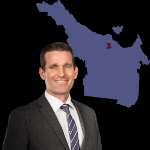
Cr Andrew Robinson
Division 8
0461 518 080
andrew.robinson
@townsville.qld.gov.au
Term of office: 1
Councillor Robinson served 13 years as an officer in the Royal Australian Army Medical Corps, instilling a lifelong commitment to service. On being medically discharged, he earned his accounting qualifications at James Cook University before working in logistics and accounting roles.
Prior to becoming a councillor, he held a senior finance role in the Department of Transport and Main Roads and has contributed his skills to several boards, including a bank. Currently, he chairs two local investment companies and is a graduate of the Australian Institute of Company Directors.
Cr Robinson enjoys chess, board games, military history, vehicle restoration and spending time with his wife and three daughters.
Qualifications:
Bachelor of Commerce (Accounting)
CPA
Graduate of the Australian Institute of Company Directors Justice of the Peace (Qualified)

Cr Liam Mooney
Division 9
0434 925 510
liam.mooney @townsville.qld.gov.au
Term of office: 2
A proud Townsville local, Councillor Mooney has lived in and around Division 9 his entire life. Watching his own children grow up here –attending school, playing sports, and performing, just as he did – has strengthened his sense of pride and commitment for the city.
Driven by a passion for performance and sport, he has represented Townsville and North Queensland in music, theatre, soccer, and swimming. Alongside his wife, he shares a deep passion for the arts, with extensive volunteer experience in community theatre, instrumental music, and the performing and visual arts.
With a professional background in the Performing Arts and Events industry, Cr Mooney maintains strong community ties through both his personal and professional life.

Cr Brady Ellis
Division 10
0499 577 788
brady.ellis @townsville.qld.gov.au
Term of office: 1
Councillor Ellis first fell in love with Townsville in 2017, relocating here for his career in breakfast radio.
After a successful decade in the industry, culminating in a prestigious Australian Commercial Radio Award for best Entertainment/Music Announcer (2017), he retired from radio to pursue new ventures with his wife.
Together, they opened a small business, further solidifying their commitment to the community.
Now raising a family in Division 10, he has dedicated himself to investing in what he proudly calls “the best city in northern Australia” .
With a vision for a thriving, active, and healthy Townsville, he is passionate about playing his part in seeing Townsville transform into the roaring hub of the future.

Council investigates reported or suspected instances of fraud and other serious crime and misconduct and maintains a focus on raising awareness of Council values and fostering ethical behaviour. Council treats all allegations of fraud, corruption and serious misconduct with the utmost importance and ensures they are thoroughly investigated.
The Office of the Independent Assessor (OIA) investigates complaints regarding the conduct and performance of Councillors. During the 2023/24 financial year the total number of complaints referred to the Office of the Independent Assessor (OIA) under 150P(2)(a) was 20 and the total number of notices given under 150R(2) was 19.
Council continues its commitment to encourage and support public interest disclosures of wrongdoing. All public interest disclosures made this financial year were investigated in a confidential manner and in accordance with Public Interest Disclosure (PID) Standard No. 2/2019. All disclosures were reported to the Queensland Ombudsman Office and the relevant documentation recorded in accordance with PID Standard No. 3/2019.
The Townsville community relies on Council to do the right thing, and Council values its reputation for delivering services in an ethical and accountable manner. Council sections continued to work closely with one another to ensure a collaborative and proactive approach to driving Council’s ethical standards. The annual Code of Conduct training was completed by 100% of staff, and all new staff complete Fraud Awareness and Code of Conduct training during the induction period.
As an open and transparent local government, Council makes information available for community members in a range of formats using the Townsville Dashboards. Townsville Dashboards is a digital platform to access high quality, current data, and insights about Townsville, informing, and enabling the Townsville community and those with an interest in investing in the region.
To comply with legislation and in the interest of openness and transparency, all Councillors are required to disclose and provide updates for their Register of Interests which can be viewed on the Council’s public website. Councillors are ultimately responsible for disclosing any prescribed conflict of interest or of any declarable conflict of interest on matters to be discussed at a Council or committee meeting (other than ordinary business matters). Prescribed Conflict of Interest and Declarable Conflicts of Interest declared are recorded in the minutes of those meetings.
Ordinary and special meetings of Council are open to the public unless closed in accordance with section 254J of the Local Government Regulation 2012. Once the deliberations are concluded in closed sessions, the meeting is re-opened to the public for a decision and the decision is placed on the public record.
Ordinary Council and Special Council meetings are live streamed. Copies of the recordings are available on the Council’s website
The Audit and Risk Committee and the Internal Audit Unit continued to provide advisory and independent forums where representatives of Council, independent specialists and management worked together to fulfill specific governance responsibilities.
Standing committees enabled sub-groups of Councillors to consider matters within each Committee’s Terms of Reference before those matters were then considered by all Councillors in an Ordinary Council Meeting.
At the post-election meeting of the new council on the 10 April 2024 it was noted that greater transparency could be realised by having all Councillors deal with matters in Ordinary Council meetings. Council resolved at that postelection meeting to hold two Ordinary Council meetings each month which are livestreamed and replace the Standing committee meeting format.
Council meetings comprise of Ordinary Council meetings, Special Council meetings and Standing Committee meetings. Ordinary Council meetings have a membership comprising of the Mayor and all Councillors.
The attendance of Councilors at Ordinary Council meetings, Special Council meetings and Standing Committee meetings for the relevant periods are outlined in Table 2 and Table 3.
– 6 March 2024
At the Special Post Election Council meeting held on 10 April 2024, Council resolved to not convene Standing Committee meetings for this term.
Table 3 – Councillor meeting attendance 2023/24 for the period 10 April 2024 to 19 June 2024
Councillors receive a remuneration package determined by the Local Government Remuneration Commission, which is reviewed on an annual basis.
The Commission decided to increase the maximum remuneration levels for mayors, deputy mayors and councillors by 3.0% from 1 July 2023.
Remuneration
Table 4 outlines the remuneration received by Councillors in 2023/24.
Table 4 – Councillor remuneration 2023/24
*Variances in superannuation due to options available for Councillors to make additional contributions throughout the year.
Table 5 - Councillor expenses 2023/24
(1) Expenses incurred for leased vehicles
(2) Reimbursement of business kilometres travelled using private vehicle (paid as remuneration)
All councillors are entitled to reimbursement for motor vehicle expenses and may make claims for reimbursement during the year.
Facilities
Councillors were provided with the following facilities to enable them to perform their duties and undertake Council business:
• personal protective equipment (PPE)
• stationery supplies
• full administrative support (Mayor and Deputy Mayor)
• limited administrative support (Councillors)
• telecommunications facilities
• shared office facilities (Councillors)
• home office facilities (Councillors)
• private vehicle use (optional) – Councillors who choose this option claim reimbursement for business use of private vehicle (refer to Councillor Expenses Reimbursement Policy)
• council leased vehicle (optional).
Under section 186(1) (d) (e) (f)(h)(i)(j) and (k) of the Local Government Regulation 2012, Council’s Annual Report must contain details of any decisions, orders, recommendations, and complaints about Councillors during the financial year. Details for 2023/24 are outlined in Table 6.
Table 6 – Number of Councillor Conduct complaints, notices, referrals, orders and disciplinary actions
orders and recommendations made under section 150AR(1) of the Local Government Act
The name of each Councillor for whom a decision, order or recommendation was made under section 150I(2), section 150IA(2)(b), section 150AH or section 150AR(1) of the Local Government Act 2009,
• a description of the unsuitable meeting conduct, conduct breach or misconduct engaged in by each Councillor, and •
referred to the assessor under section 150P(2)(a) of the Local Government Act
Occasions the local government asked another entity to investigate, under chapter 5A, part 3, division 5 of the Local Government Act 2009 for the local government, the suspected conduct breach of a Councillor.
Applications heard by the conduct tribunal under Chapter 5A part 3 division 6 of the Local Government Act 2009 about whether a councillor engaged in misconduct or a conduct breach.
The total number of referral notices given to the local government under section 150AC(1) of the Local Government Act 2009 during the financial year and for those suspected breaches the subject of a referral notice mentioned;
• the total number of suspected conduct breaches and
• the total number of suspected conduct breaches for which an investigation was not started or was discontinued under section 150AEA of the Local Government Act 2009
The number of decisions made by the local government under section 150AG (1) of the Local Government Act 2009 during the financial year
The number of matters not decided by the end of the financial year under section 150AG (1) of the Local Government Act 2009
The average time taken by the local government in making a decision under section 150AG (1) of the Local Government Act 2009

Council acknowledges the wonderful contribution volunteers make to the Townsville community. This financial year Council had 75 volunteers. Volunteers assist Council in delivering services, protecting the environment, and hosting events. Council manages a number of services that involve community volunteers. During the year, volunteers assisted in the following areas of Council:
• Construction Maintenance and Operations
• Community and Lifestyle
• Environmental Health and Regulation
• Sustainability and Environmental Services
• Engineering and Asset Infrastructure Planning
Council would like to thank all the volunteers within the community; those involved with sporting, social and service clubs, community events, environmental initiatives and much more.
Volunteers are an integral part of the community fabric and without volunteers Townsville would not be the same. Council’s Volunteers Policy can be found on Council’s website.
The health, safety and wellbeing of our Townsville City Council workers, contractors, volunteers and community remains our key priority.
We put safety first to ensure ‘everyone goes home safe today and every day’.
Council has established a Work Health and Safety Management System (WHSMS) comprising a set of policies, procedures and processes to systematically manage health and safety within Council. This approach is a way to help meet Council’s duties and responsibilities under the Work Health and Safety Act 2011
The scope of the WHSMS applies to Council workers, contractors, sub-contractors, apprentices, trainees, volunteers, work experience students and others who may affect or be affected by Council workplaces or Council work activities.
Council adopts a practical approach to the system of the Work Health and Safety (WHS) management cycle to identify and manage hazards that pose a risk to health and safety before these potentially lead to injury or illness.
Council has an established a Health and Safety Representative Working Group which brings together elected health and safety representatives from different areas of Council to consult on health and safety matters. The group meets every quarter, and its key focus is to bring ideas from all work groups to one forum to share ideas and solutions to improve safety outcomes. This is a demonstration of our people’s commitment to continuous improvement.
As part of Council’s wellness strategy, our Employee Assistance Program remains a key offering. This includes employee, family, money, career, manager conflict, and nutrition and lifestyle assistance. As part of the program Council offers these services to employees and their immediate family members.
Council continues its commitment to the wellbeing of all employees by continued health and wellbeing initiatives throughout the year. Some of these initiatives are the flu vaccination program, R U OK? Day, Movember, Share the Dignity Drive, 10,000 step challenges and Council’s commitment to address issues of gendered based violence and sexual harassment.

Nationally, Safe Work Month is celebrated in October each year. To recognise the importance of safety, Council hosts an annual ‘A Moment for Safety’ event. Three two-hour sessions are held across one day, supporting staff on different shifts or with resourcing requirements to attend. In 2023, close to 1,500 staff attended the event as well as local suppliers and contractors.
This event is vitally important to building a strong safety culture and a demonstration of the value of our people. Local suppliers had the opportunity to speak with Council about their products and services, with each year seeing an increase in local suppliers attending the event as valued exhibitors.
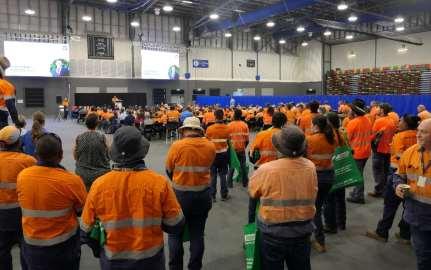

Townsville City Council provides mandatory safety training to all employees to ensure they are safe in the workplace, every day. Council offers 80 different types of safety-related training including working safely at heights, confined space entry, health and safety representative training and site supervisor training. Council manages all training documents, licences and certificates in a learning management system which monitors and tracks expiries and sends workers and managers reminders of these.
The Office of Industrial Relations Queensland Work Well Awards recognise and celebrate outstanding work health and safety, electrical safety and return to work achievements.
In 2023 Townsville City Council won the Category four – Most significant improvement to work health and safety performance. This award recognises an organisation that has made a significant improvement to its work health and safety performance. This achievement was a demonstration of the importance Council place on the health and safety of our workers.

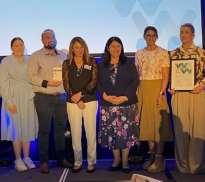
Council is self-insured for Workers Compensation with the licence being issued by the Workers Compensation Regulatory Services (WCRS), Office of Industrial Relations (OIR). WCRS administers the Workers’ Compensation and Rehabilitation Act and as part of maintaining this licence, Council is required to engage an OIR approved auditor to perform two-yearly WHS audits, where a result of 70% or higher must be achieved.
Townsville City Council is dedicated to offering learning, development, and employment programs to enhance the skills, attributes and knowledge of our employees. This commitment ensures that our teams can effectively deliver services to the community while working towards our vision and mission.
Council welcomed 23 new Apprentices/Trainees, as well as 18 Graduates, through our Entry Level Program, in financial year 2023/24. Work Skills Trainees completed a Certificate I in Business through Skilling Queenslanders for Work.
The entry-level program engages approximately 50 active employees annually. We are supporting 29 Graduates.
Council recognises long serving team members annually with a Long Service Award Ceremony who have achieved 10 years of service or more in five-year increments. Attendees include the Mayor, CEO, Directors, General Managers, Team Managers, colleagues and guests to show our appreciation and recognition of the service they have provided over the years.
For 2023, Council had employees ranging from 10 years of service right through to 50 years of service. The awards are a great opportunity for employees to be recognised for their contributions, big and small over their years of service.
For 2023, Council congratulated 123 staff with a total of 2,025 combined years of service.

Scan the QR code to watch our 2023 Long Service Awards video
From new hires to experienced leaders, our employees are the essence and core of Townsville City Council. Our team culture and identity is based on our internal core values, SERVE
• Safety – Everyone goes home safe today and every day.
• Excellence – We exceed expectations and get it right every time.
• Respect – We respect all people, their cultures and our environment - always.
• Value – Today we create value for tomorrow.
• Enjoyment – We work together to innovate, create and have fun.
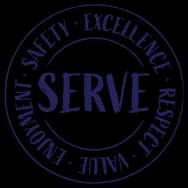
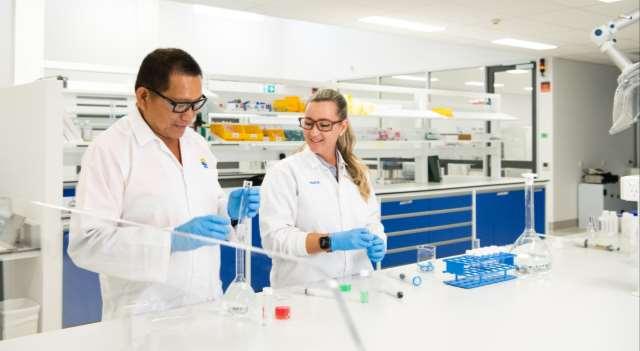
Council’s Townsville Laboratory Services is an advanced analytical laboratory offering a range of services which are available to the community. It currently services councils, hospitals, universities, schools and other institutions in the North Queensland area. It is open to the public for a varied suite of soil and water testing.
In 2023, Townsville Laboratory Services (TLS) was recognised as a global leader in science, after being named alongside some of the world’s largest laboratories by Earth Science Information Systems (EScIS), a leading provider of environmental data management solutions.
The ESdat data management system helps environmental scientists and engineers to manage a wide range of data. After transitioning to the ESdat system, Townsville Airport a long-term client of TLS, approached the service to work towards ESdat capability.
During the project, Council’s team of laboratory officers and scientists collaborated with the Townsville Airport officers and environmental scientists, to adapt their processes and enhance the lab’s capabilities, to meet the needs of external clients and the increasing global demand for ESdat.
With the shift to ESdat, Council analysts and clients can more efficiently analyse, report and share data while ensuring the highest level of quality control. The successful implementation secured TLS a spot among some of the largest laboratories in the world on the Earth Science Information Systems website. Only ten other Australian facilities are listed on the site.
ESdat allows Council’s Townsville Laboratory Services to provide services to private and government monitoring and research groups where data management and transfers are strictly defined by stringent data structures and processes.
For more information on Townsville Laboratory Services, visit Council’s website by scanning or clicking the QR code.



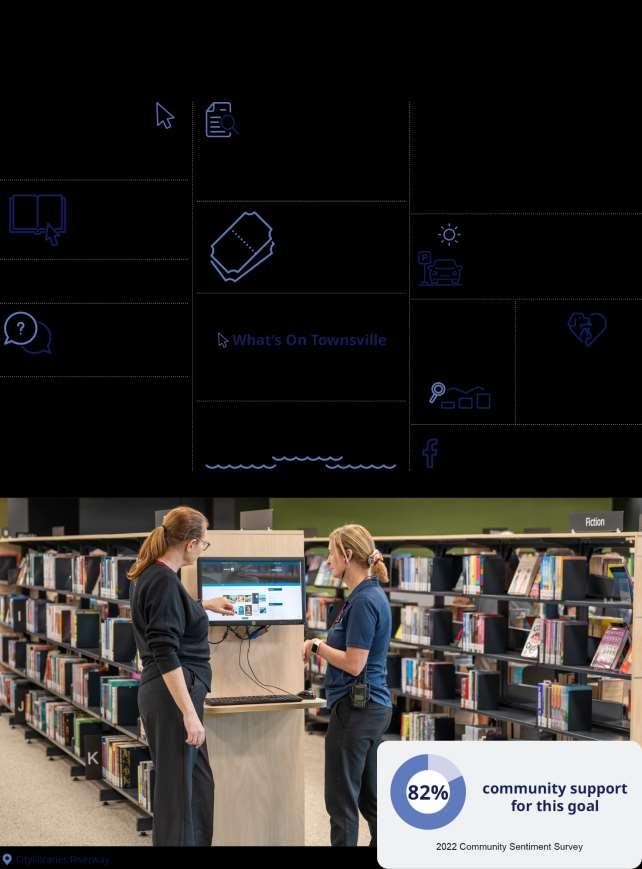
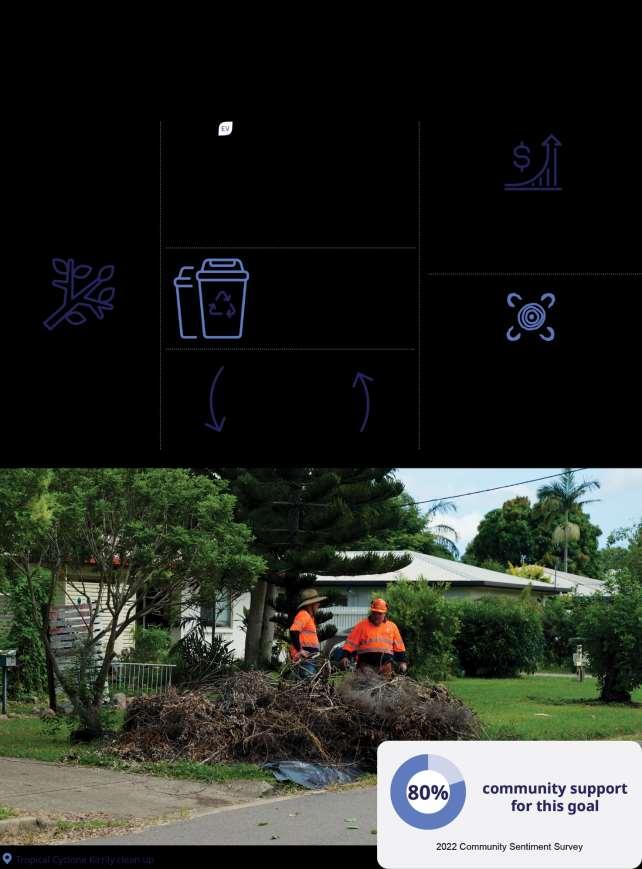


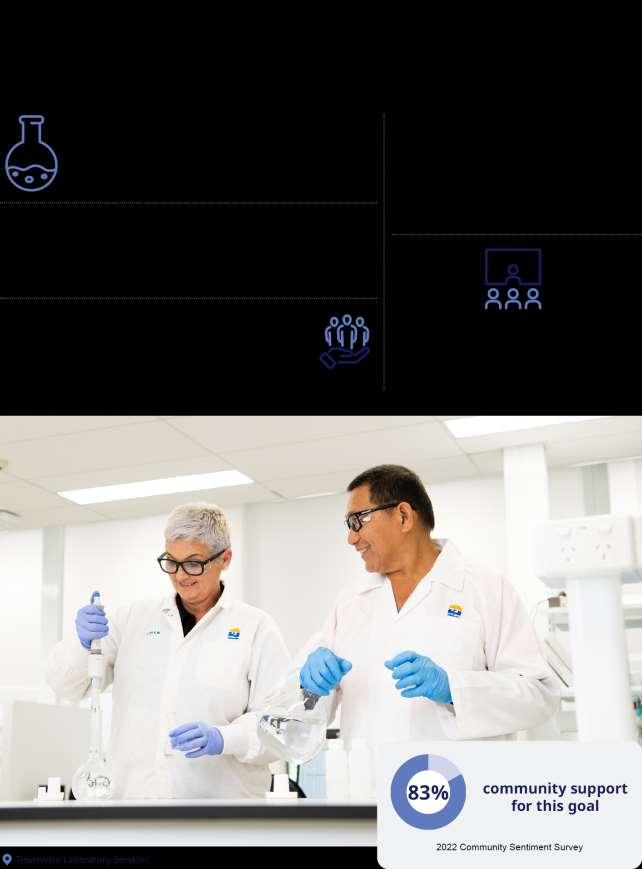

As part of Council’s commitment to increasing the number of Council services available online, a new online tool was developed to help ratepayers check their rate and utilities balances 24/7 – without having to call customer service.
Townsville City Council is committed to investing in technologies which streamline and enhance how our customers engage and do business with us.
In August 2023, Townsville City Council launched its Check Your Rates Balance tool to help property owners check their rates balance online via Council’s website.
The Check Your Rates Balance tool provides the latest rates balance and helps ratepayers plan and budget their twice-yearly rate and utilities notices.
Since its introduction, the online tool has been accessed almost 80,000 times. Council’s customer service team has reported a 42.6 per cent reduction in calls about rate balances – freeing staff up to focus on other customer requests.
Scan or click the QR code to go to Council’s Check Your Rates Balance web page, where you will also find an instructional video.

42.6% reduction in rates balance phone calls
79,608 uses of Check Your Rates Balance online tool




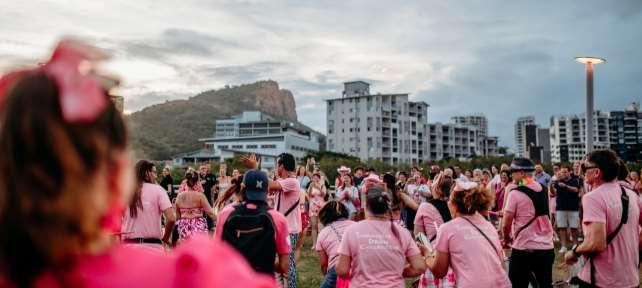
Global pop superstar P!nk got the party started in our beautiful city as she wrapped up her Australian Summer Carnival tour in Townsville.
P!nk performed for the first time ever in Townsville, over two nights, drawing in more than 65,000 fans.
The milestone event brought in a $50 million boost to businesses like hotels, restaurants, bars and retail outlets, and showcased the calibre of concert Townsville can host. The city welcomed more than 80,000 visitors, cementing Townsville’s reputation as the events capital of the North.
To celebrate P!nk coming to town, Council turned the city pink, lighting up the city’s assets including our landmark Castle Hill and ‘Townsville’ sign. In collaboration with local musicians, we created a Townsville Beats event – a musical trail all the way from The Strand to Queensland Country Bank Stadium where the concerts were held.
The city was buzzing with people joining in on the festivities.

Scan or click the QR code to view a video of the Townsville Beats event


The completion of Stage 2 of the Waterfront Promenade network project is another step towards Council’s commitment to deliver an active transport network linking the city.
The 280-metre boardwalk connects the Flinders Street East carpark to the Reef HQ aquarium development site and will form part of the larger Waterfront Promenade network project.
The Stage 2 project was completed in July 2023 and supported 30 local jobs during construction.
Visit the Waterfront Promenade project page at Council’s website for more information.

Scan or click the QR code to go to the webpage


Townsville has achieved ECO Destination Certification, putting the city on the international ecotourism map.
Townsville is the third destination in Queensland and the ninth in Australia to become an ECO Destination, solidifying the region as a leader in sustainable ecotourism.
The certification application was led by Townsville City Council in collaboration from key stakeholders including Townsville Enterprise Limited, Queensland Parks and Wildlife Service and the Great Barrier Reef Marine Park Authority. In achieving certification from Ecotourism Australia, Council has made the city’s commitment to achieving a sustainability-driven future for tourism clear.
To achieve certification Townsville has had to meet 81 strict sustainability standards.
The certification reflects Council’s commitment to looking after the region’s natural environment and empowering Townsville tourism operators to continue to adhere to their strong sustainability principles.
The city is now positioned to inspire tourism businesses to implement responsible practices as well as communicate expectations to tourists, enhancing visitor and community engagement with local sustainability initiatives.
The certification reflects Council’s commitment to enhance the city’s existing tourism offerings and to create new landmark tourism destinations, capitalising on the city’s position between the rainforest, wetlands and the Great Barrier Reef.
Council operates the Advanced Ecotourism Certified Eco Catchment Tours, providing education and interactive tours to enhance the local community’s connection to the city’s diverse land- and coastal-scapes.
More than 75 per cent of tourists in Australia are searching for travel sustainability, showing the importance of both achieving accreditation and providing ecotourism experiences for visitors to the city.
Council was a recipient of the Queensland Government Department of Tourism and Sport’s Eco-Certified Tourism Destination Grant in 2022 to expand the city’s destination sustainability certification.


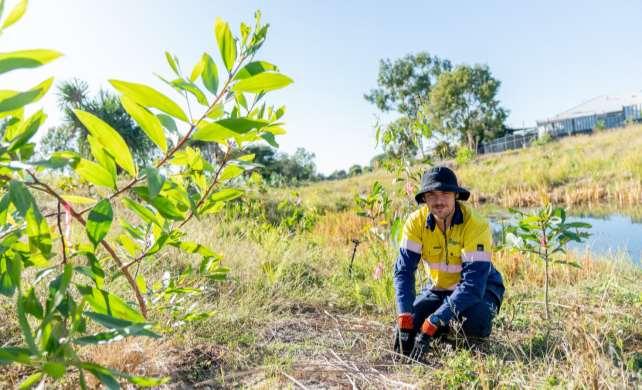
The naturalisation of a Bushland Beach drain corridor is greening the suburb and creating better outcomes for the Great Barrier Reef.
The $2.8 million Townsville City Council project is turning the drain corridor alongside Peggy Banfield Park into a living waterway, replicating a natural self-regulating ecosystem that requires minimal maintenance and creates improved biodiversity, natural mosquito control, soil improvement to reduce erosion, and improved water quality.
Council is a proud Reef Guardian Council and this project is just one example of Council proactively delivering innovative ways to improve the water that makes its way from the city to the Great Barrier Reef, while enhancing biodiversity, providing natural mosquito control and reducing erosion.
The project has included planting more than 97,000 plants to increase the ecological benefit to the community and to reduce hands-on maintenance of this site.
40,000 plants have been propagated by First Nations Reef Assist partner Three Big Rivers in collaboration with Council’s Dry Tropics Nursery, saving costs for Council while building skills for the Three Big Rivers team.
Further plants were locally sourced from sites within the Bohle River Catchment. Through using local species Council is ensuring a more resilient and successful outcome for this significant project.
As part of this project, Council has restored soil on site through using biologically living mulch and creating dense vegetation, with some species set to stabilise and build healthy soils as the plants mature.
The naturalisation project is due to be completed towards the end of 2024.


Scan or click QR code to watch a video on this project.
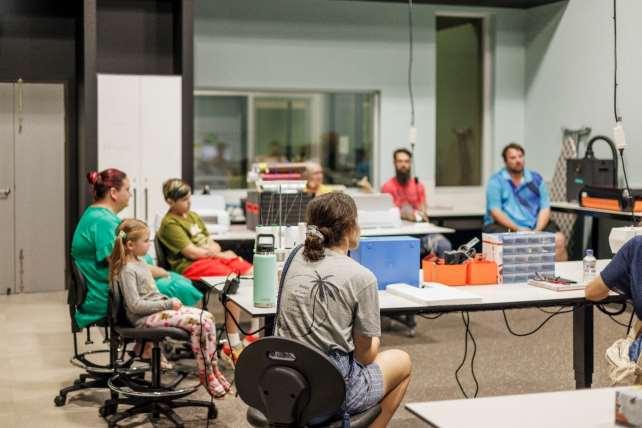
Investing in digitally connected, creative spaces continued to be key focus for Townsville City Council during the 2023/24 financial year, with the opening of the city’s second Creative Hub at the new Citylibraries Riverway.
Creativity is alive and well in Townsville with more than 4,900 people enjoying Council’s new Creative Hub and Mixhaus Makerspace at the Riverway library during the 2023/24 financial year.
The city’s second Creative Hub opened in 2023 and includes two interlinked recording studios and multi-media Mixhaus Makerspace. Mixhaus Makerspace contains a range of technology and devices to promote and support tinkering, repair and design across the community. This space includes a 3D scanner, sewing machines, overlocker, laser cutter and engraver 3D printers and a Cricut machine.
Community members who have completed an induction, can book the spaces during business hours, with Council working towards implementing 24/7 access for inductees during the 2024/25 financial year
The delivery of a second Creative Space for the city demonstrates Townsville City Council’s commitment to improving residents’ access to digital technologies and for creating spaces for people to engage safely in activities, when they want to.

Council proudly supports the First Nations History Club which provides a culturally sensitive space for community members to connect and research their family stories.
Meeting on the first Saturday of the month at the Flinders Street library, the First Nations History Club is part of Council’s commitment to showcase and protect Indigenous and local history.
Library staff provide support and help to community members in navigating historical documents and catalogues which are key tools used to explore the complexities associated with any family history research.
At the centre of these documents are the Norman Tindale and Margaret Lawrie Collections, which include vast amounts of genealogical information about Aboriginal and Torres Strait Islander communities throughout Australia, as well as journals, maps, and artefacts.
These collections are usually only available in large city libraries, so the fact the Flinders Street library has these in its catalogue is a coup for a regional library. The ability for Townsville and North Queensland residents to be able to access these materials, within their local setting, is a point of pride for the Citylibraries and is just one of the many ways the service works to improve the equity of access to knowledge, in our community.


The Indigenous Australians and Indigenous Staff Collection are curated collections developed over three decades to provide a robust and informative resource base for the Townsville community.
The Indigenous Australians Collection is housed across all branches and provides the community with access to cultural, historical and autobiographical works about First Nations peoples, and from an Indigenous lens. The highlight addition to the Indigenous Australians Collection within the last financial year was the Yaru! : Gudjul Learner’s Guide and Dictionary by North Queensland Elder William Santo. Heritage staff were fortunate to be invited to the launch of the publication of this important cultural work. The significance of preserving the publication in both the Indigenous Australians and the permanent Local History Collections ensures that the information remains accessible for current and future generations, promoting understanding and respect for the rich cultural heritage and history of Indigenous communities as well as the local region.
Craft and Yarn
Craft and Yarn is a monthly program contributing to Citylibraries’ ongoing commitment to Reconciliation.
First Nations Craft and Yarn is a yarning circle focused on Aboriginal and Torres Strait Islander people in our community, however all members of the community are welcome to participate and yarn. Participants weave stories and threads of their life experience and personal histories while weaving, painting, and drawing, connecting over a cup of tea in a welcoming environment.
The theme for the 2023 Deadly Day Out was: For Our Elders. Citylibraries participated in the march and had a retreat space for the Elders as part of the Deadly Day Out at Riverway. The retreat space contained seating, refreshments and a Deadly Day Out cake in our beautiful Von Steiglitz room. Community Elders were able to spend the day yarning while browsing family history resources and information.


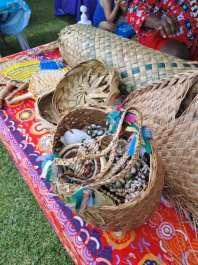
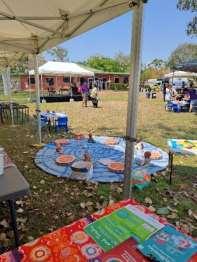
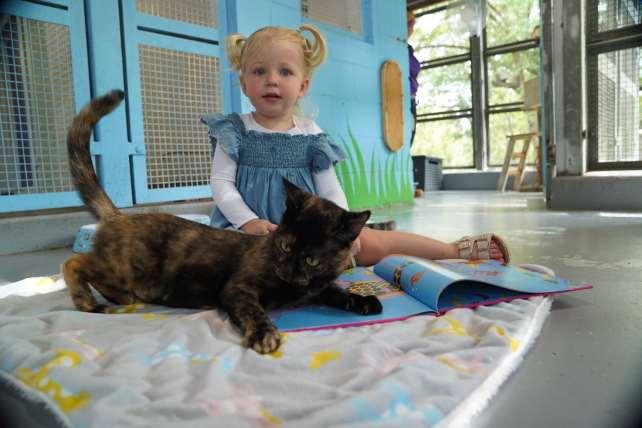
Citylibraries launched its new pet library program fostering early reading education in a fun and creative way.
What started as a cute idea getting children to create library cards for their pets, transformed into a successful activation of the city’s three libraries and provided a fun library experience filled with play-based learning and an increase in memberships.
The Pet Library ran over the Easter school holiday period and saw more than 500 pet library cards and books make their way into the community’s homes from the Flinders Street, Riverway and Aitkenvale libraries.
More than 575 children aged between 0-12 years old attended the pet library and Reading to Pets sessions with many expressing their excitement to be able to take a book and read it with their pets. As well as being fun, reading to animals has been shown to support literacy development as pets are wonderful listeners who are happy to hear the same story over without passing any judgement.
The program provided children and their parents and caregivers a positive interaction with our libraries and is an example of Council’s commitment to developing Townsville into a leading centre of education, training and research commercialisation.

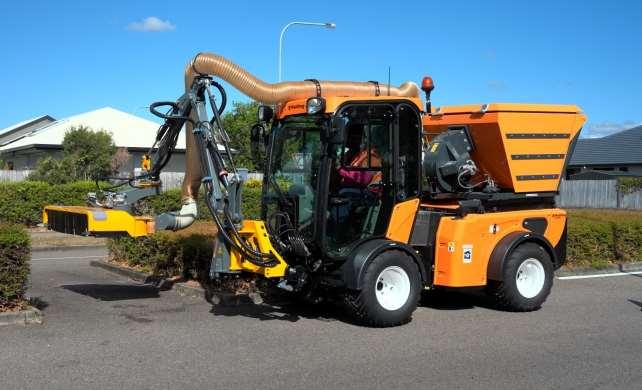
Council’s new hedging machine is improving efficiencies.
In June 2024, Council deployed a new hedging machine to improve safety for Council workers and reduce the time traffic lanes are closed while workers trim Council hedges.
Townsville has hundreds of hedges lining median strips that Council crews maintain on a rotating basis.
This innovative hedging machine is a 3.5 tonne, single seater enclosed vehicle with a mechanical boom and vacuum system that sucks-up and stores leaf material as it is cut, saving on crews having to dispose of waste manually.
The $270,000 piece of machinery will help Council deliver some of its core services more efficiently, with less impact to Townsville residents.
Council maintains well over 300 parks and open spaces, so there is plenty of green space and work involved to keep our city looking pristine.

Scan or click the QR code to watch a video about our new hedger


Water Services' objective is to provide safe, reliable and sustainable water and wastewater services for the benefit of the Townsville community.
This Operations Report is designed to provide an overview of the operations and performance of Water Services for the 2023/24 financial year, as measured against its Annual Performance Plan.
Section 190(1)(c) of the Local Government Regulation 2012 requires that Townsville City Council must include an Annual Operations Report for each commercial business unit in the Council's Annual Report.
Water Services is a significant business activity of the Townsville City Council, providing water and wastewater services to the Townsville Community. It supplies potable water, collects and treats wastewater and supplies recycled water.
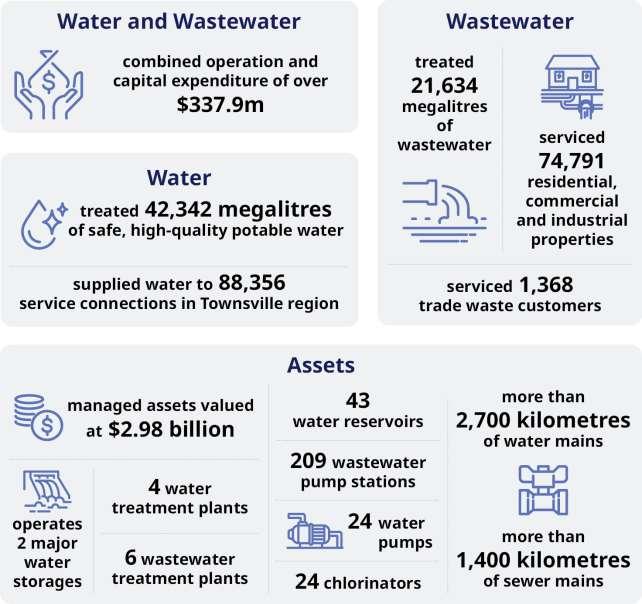
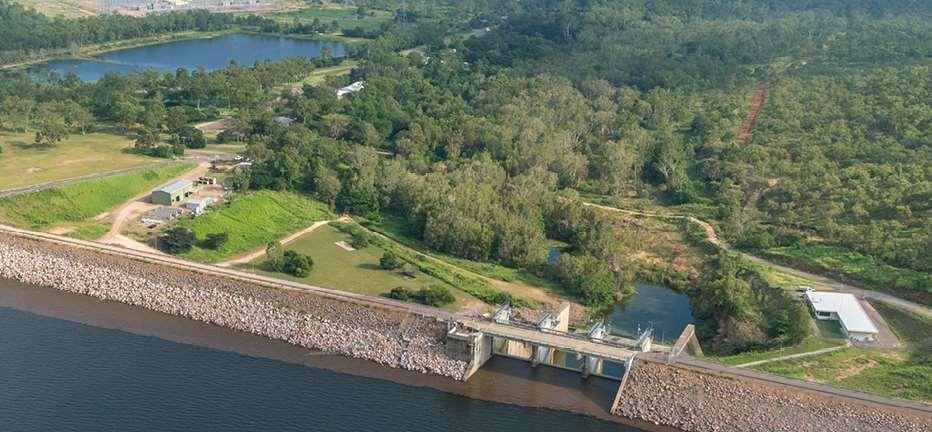
Significant events and initiatives undertaken during the year are summarised below.
Blue-green algae are a naturally occurring bacteria that lives in aquatic environments like waterways and dams. Algal blooms can occur in water bodies during favourable conditions including sufficient nutrients, warm temperatures, high levels of sunlight and stable water conditions. High levels of algae can affect the treatment and production of potable water by clogging filters and increasing the amount of chemicals used to disinfect the water and remove any impurities.
Blue-green algae blooms continued to impact raw water quality in 2023/24 as weather conditions, nutrients and algae levels in the Ross River Dam fluctuated throughout the year. The levels of blue-green algal bloom in the city’s Ross River Dam remain high and the growth rate increased over the summer months due to persistent hot and dry weather conditions, which created the perfect environment for this naturally occurring bloom.
Council continued to supply safe drinking water to the community through careful management of the water treatment processes and water quality monitoring program.
In 2023/24 Council maintained 100% compliance with the Australian Drinking Water Guidelines (ADWG).

The Ross River Dam to Douglas Water Treatment Plant Pipeline (DWTP) provides approximately 85% of the city’s water. Council invested in the construction of the new pipeline to increase the resilience of this key asset and further enhance Townsville’s water security.
Council worked closely with delivery partners to complete construction and commission of a new 9.4km long, 1.29m diameter Mild Steel Cement Lined (MSCL) pipeline in June 2024. Innovative construction methods enabled Council to simplify and de-risk the planned connections to the new pipeline, reducing the planned outage from 14.5 weeks to 5 weeks.
City Council 2023/24 Annual Report
The Council continues to deliver an annual wet weather resilience program. The program focuses on proactive initiatives to improve the performance of the wastewater network during wet weather events. Council invested in several areas of the wastewater network during the year:
• A rolling annual inflow and infiltration inspection program. This program involves smoke testing of sewers and physical inspections of residential and commercial properties and Council infrastructure. This is to identify illegal connections and damaged assets that provide potential entry of rainwater to the wastewater network during rain events.
• In 2023/24, Council completed the final portion of a two-year program of sewer and manhole relining. At the completion of the program 110 manholes and 5.9kms of sewer were relined to reinstate functions and reduce infiltration of rainwater during weather events.
These annual works programs are important to maintaining our wastewater services to the Townsville community.
Townsville Laboratory Services continues to expand it capabilities and services to Townsville and the wider regions. The laboratory is now approved to test water samples for one of the world’s most dangerous waterborne diseases, Legionella pneumophila. The accreditation by the National Association of Testing Authorities (NATA) means that Council’s laboratory is now able to analyse water samples for Legionella pneumophila and other strains of Legionella. In addition to testing water samples from Council’s own buildings, the Council laboratory will extend this service across North Queensland to hospitals, clinics, aged care facilities and commercial buildings that are subject to Queensland Health requirements for mandatory testing.
In the field of organic contaminants, the laboratory has just gained NATA accreditation for Benzene, Toluene, Ethylbenzene, Xylene and Naphthalene (BTEXN). This expands the laboratory’s ability to speciate petroleumbased contaminants in waterways and groundwater.
Recently the laboratory partnered with Qldwater to optimise the processing and reporting of water quality results. By implementing the swimlocal data management tool and upgrading its Laboratory Information Management System (LIMS), processes with automated operations have been significantly streamlined, minimising manual data entry. Laboratory results, from pesticide tests to weekly bacterial analyses, can now be securely uploaded directly into the swimlocal platform, improving data accessibility and reliability. The laboratory team has made significant advancements in optimising LIMS to support swimlocal-compatible data structures. This enhancement not only improves the overall efficiency and accuracy of water quality reporting, but also ensures it aligns with the needs of local government clients.
In early 2024, the Townsville Laboratory Services has been recognised globally for its excellence in data management by EScIS (Earth Science Information Systems), a leading provider of data management solutions. This achievement places Townsville Laboratory Services among some of the world's largest laboratories offering world-class data management. ESdat, a globally accepted data system, enhances efficiency in analysing, reporting, and sharing data, ensuring the highest quality control. This accomplishment not only strengthens their ability to serve major clients like Townsville Airport Limited but also positions them to meet the increasing global demand for ESdat. This initiative demonstrates Townsville Laboratory Services' commitment to excellence and innovation in environmental data management. Read more about this achievement on page 53.
Townsville has 41 water storage reservoirs that play an important role in the distribution of potable water to Townsville residents and businesses. The Top City Reservoir is a critical water storage and distribution asset that was scheduled to be refurbished in financial year 2024/25, but the works were accelerated due to damage to the roof and structure caused by Tropical Cyclone Kirrily. The damage to the reservoir meant it was not able to be returned to service and Council’s water distribution capacity was reduced. Gabrielli Constructions commenced demolition and rebuild of the reservoir in mid-2024 and are scheduled to complete construction of a brand-new reservoir in mid-December 2024. This project has been a successful collaboration between Council and local contractor to accelerate construction of a critical water asset to ensure greater water reliability for the Townsville community.
During 2023/24, Water Services invested in the below water and wastewater infrastructure. Table 7 – Water services major investments
No changes were made during the financial year.
Council made no directions to Water Services during the financial year.
In the 2023/24 financial year, Water Services measured its performance against the below performance indicators as outlined in its Annual Performance Plan.
Key: Target Met Target Not Met
Table 9 – Water Services performance target 2023/24 results
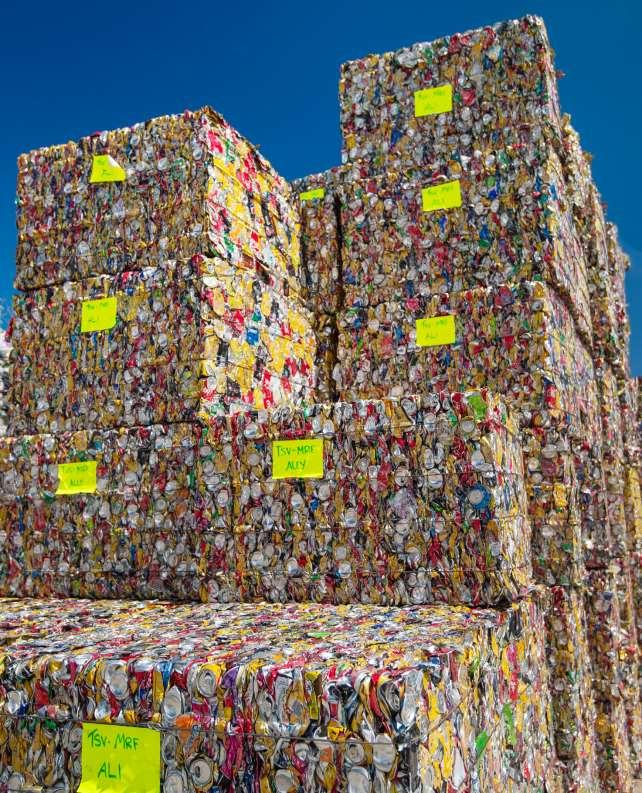
Resource Recovery's objective is to contribute to the delivery of a healthy and eco-friendly city through the provision of waste and recycling services that deliver safe, reliable, affordable and sustainable waste management and resource recovery services for the city.
This Operations Report is designed to provide an overview of the operations and performance of Resource Recovery for the 2023/24 financial year, as measured against its Annual Performance Plan.
Resource Recovery is a significant business activity of the Townsville City Council, providing solid waste management and recycling services to the Townsville community through waste collection, transportation, recycling and disposal.
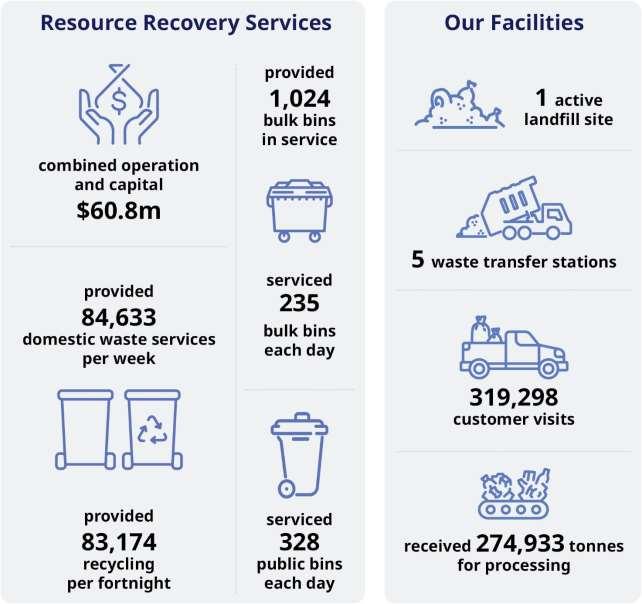
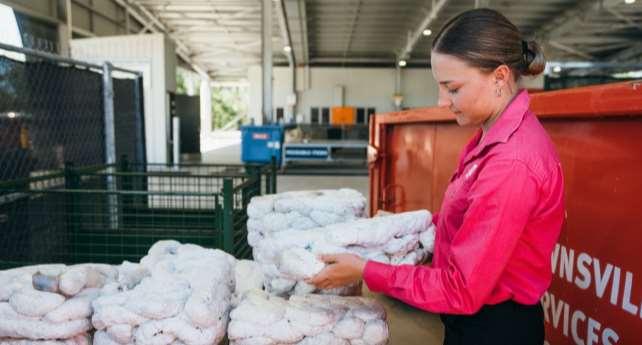
Significant initiatives undertaken during the year are summarised below.
The Townsville Waste and Resource Recovery Infrastructure Report produced in 2021 identified the need for development of a regional Recycling Enterprise Precinct to aggregate diverted products and create the economies of scale required to incentivise investment in the local circular economy and development of local remanufacturing capacity. To progress this, Resource Recovery developed a Scoping and Definition Study Report, Options Report, and Siting Study. These reports defined the strategic need, scope and definition, of the requirements for a new Recycling Enterprise Precinct to service not only Townsville, but the greater North Queensland Regional Organisation of Councils (NQROC). Following these reports, work has now commenced on an options paper to be delivered in the third quarter of the 2024/25 financial year.
In February 2022, Council’s contractor LMS Energy Pty Ltd, installed an additional 15 landfill gas wells at the Stuart Waste Facility. The wells were installed to enable the capture of landfill gas from the more recent cells, which have been constructed to manage the growing waste management needs of the city.
Landfill gas is comprised of approximately 50% methane – a harmful greenhouse gas with a global warming potential that is 80 times greater than carbon dioxide. Council is currently managing the production of biomethane through a thermal conversion process being conducted under the contract with LMS Energy. The recent biogas system installation expansion works, have resulted in an uplift in production and associated carbon credits. A second flare was installed in 2023, and two generators that will convert the captured methane gas into electricity in the 2025 calendar year. The electricity generated will be fed into the grid system.
Following completion of the Organics Roadmap in early 2021 and the 2021/22 Food Organics and Garden Organics (FOGO) trial, Resource Recovery is working on a detailed business case with options to be presented to Council in early 2025. The business case will consider the social, economic, environmental and governance arrangements of implementing a third kerbside bin for collection and processing of organic waste. Delivery of the business case forms part of Council’s preparation for the potential introduction of a domestic kerbside organics service.
Townsville City Council 2023/24 Annual Report
Capital works were carried out in the 2023/24 financial year to ensure Council continues to meet its waste and resource recovery obligations for its community, while managing the social license for its sites, and maintaining the sites in an environmentally compliant manner. As a result, $14.4m was spent in capital expenditure across the portfolio which included the following key projects:
• Design of Stuart Landfill Cells 4 & 5
• Continued rehabilitation and post-closure care works at the Jensen Landfill
• Upgrade of the Stuart Waste Facility Weighbridge.
• Design works for additional infrastructure at the Stuart Waste Management Facility such as
o a truck wash and service bay
o a stormwater sedimentation pond
o a landfill leachate management system
• Purchase and repair of TCC bulk bins
• Design and construct a “quick fill water tank” to assist with firefighting capacity at the Stuart Waste Management Facility
Waste reduction and recycling face-to face engagements continued during 2023/24. Activities included engagement with early learning centres, schools, workplaces, and community groups. Over the year, Council’s Resource Recovery Educator delivered 40 education sessions at the Townsville’s Materials Recovery Facility (MRF) to more than 1,000 primary school students. Our Resource Recovery Educator also held tours at the MRF and manned stalls at community events. In addition, the top five social media posts, covering messaging such as ‘Keep Out Small Items” and “Free to Drop Reusable Items” reached over 936,675 residents each. To address fire risk in bins, Resource Recovery has also produced social media messaging about keeping combustible items and batteries out of bins, educating community on the correct disposal.
Council also introduced initiatives such as incentives to swap over to a larger 360L recycling bin and move towards reusable sanitary and incontinence items as well as nappies. Approximately 400 residents took advantage of the incentivised pricing to swap to a 360L recycling bin, and more than 600 households submitted applications to receive a subsidy to make the transition to reusable products.
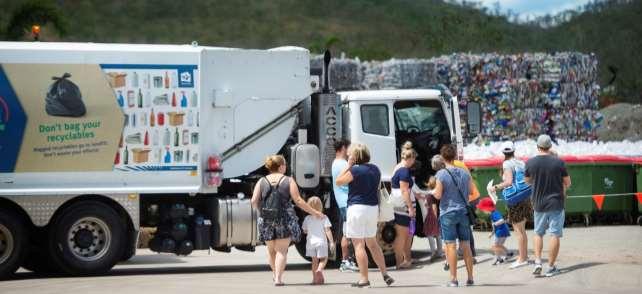
In the 2023/24 financial year, Resource Recovery measured its performance against the below indicators as outlined in its Annual Performance Plan.
Key: Target Met Target Not Met
Table 12 – Resource Recovery performance target 2023/24 results
Penalty
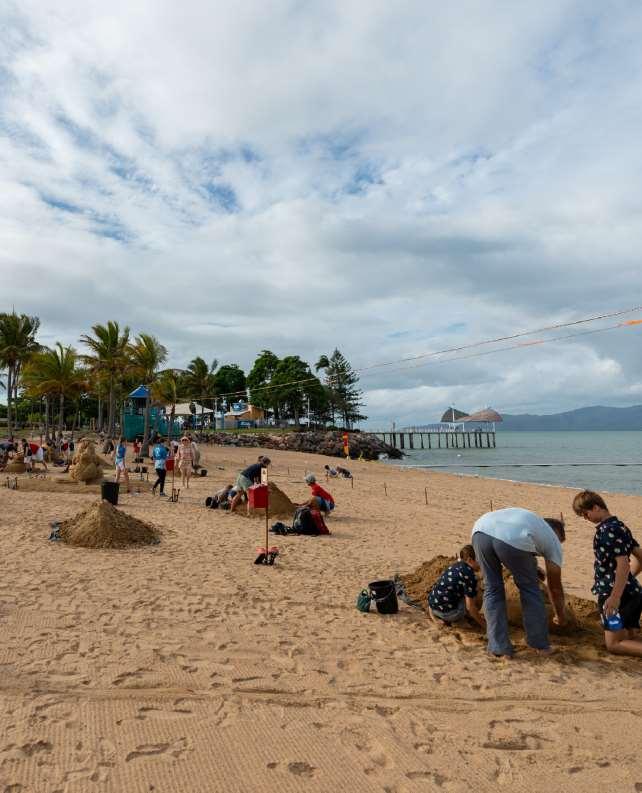
Townsville City Council continues to be a responsible, open, and transparent local government operating in accordance with the Queensland Local Government Act 2009, the Local Government Regulation 2012 and related legislation. Council is committed to high standards of corporate governance and accountability and seeks continuous improvement.
In line with the Local Government Act 2009, the Council places high importance on responsible governance due to the following reasons:
• it underpins the confidence that the community has in Council and our services
• it affects the quality of our outputs
• it is a value adding activity
• it ensures that the Council meets its legislative responsibilities
• it is a strong reminder that the Council is ultimately accountable to the community. Council has a Corporate Governance Framework to provide guidelines for compliance with legislation and best practice. For Council to demonstrate good governance, there needs to be a clear understanding about responsibilities and accountabilities. This framework sets out the roles of elected members and administration in representing the interests of current and future residents of Townsville. Townsville’s elected officials bring a diverse wealth of experience and passion, and throughout the year have continued to interact with the community and act on residents’ behalf.
Council’s risk management approach is based on value creation and protection in alignment with international standard ISO 31000:2018 Risk Management Guidelines. Throughout 2023/24 Council continued to assess risk for any decision proposals, keeping any new and emerging risks under consideration. Managing risks at an appropriate level remains an integral part of our organisation. Council has an established risk management framework, policy, procedures and systems which support the identification, assessment and mitigation of strategic and operational risks across the organisation.
As the primary connection to the Townsville community, Council has continued to prioritise risk management, ensuring it receives the attention necessary to safeguard our community’s interests and well-being. The safety of staff, the community and contractors remained the key priority at Council. It is important for Council that “everyone goes home safe today and every day”. Risk management continues to be a responsibility of all employees and an integral part of the management function.
Senior management conducted an extensive review of Council’s strategic risk profile during the year through a series of workshops. Based on the updated strategic risk profile, changes were made to Council’s Risk Appetite Statement and related risk tolerances. The 2023/24 Risk Management Plan includes a range of mitigation strategies designed to manage or reduce risk to an acceptable level, while maximising identified opportunities. Minimising potential adverse effects on the financial performance of the Council remained a priority. Townsville City Council continued to mitigate risks that would prevent the achievement of its Corporate Plan and continued to focus on creating a globally connected community driven by lifestyle and nature.
Top challenges/risks faced by Council:
• cost pressures of materials and services versus revenue streams and customer expectations
• asset deterioration and maintenance
• special skills deficits
Top opportunities/strengths realised by Council:
• continued provision of services and community events despite hard economic conditions
• continued delivery of projects that serve our city and grow our city for tomorrow
• built strong partnerships and resilience
Council conducts routine operational risk assessments as a proactive measure to identify potential risks that could disrupt its operations. These risks could originate from various sources, including internal processes, people, systems, or external events.
All identified risks are compiled into a consolidated register of risks, which informs the internal audit planning process. This process assists the Audit and Risk Committee in monitoring and tracking Council’s performance against areas of high risk, supporting effective risk management and maintaining resilience.
Council has an established Business Continuity Framework and Business Continuity Management Policy. These are designed to ensure the Council’s ability to continue its essential services and operations during any potential disruptions or crises. This framework and policy provide a structured approach to identify potential threats to the Council and the impacts those threats would have on business operations.
In the 2023/24 period, Council reviewed the Townsville City Council Business Continuity Plan and its 21 sub-plans. These plans provide strategies for maintaining critical functions during disruptions.
The review and update of these plans are part of the Council’s annual strategic process, ensuring they remain current and effective. This reflects the Council’s commitment to resilience, continuous improvement, and community responsibility.
Throughout 2023/24, the Council remained consistent in its commitment to identifying and mitigating the risk of non-compliance with legislative obligations. Our proactive approach encompasses the timely identification of legislative changes, swift resolution of potential breaches, and the provision of training and awareness programs for Council workers. These initiatives aim to enhance understanding of Council’s extensive range of legislative responsibilities. Furthermore, Council conducts thorough assessments of the effectiveness of our internal controls to mitigate the risk of non-compliance. This includes a timely and comprehensive review of the Council’s policies, administrative directives, procedures, and registers.
Council’s approach to fraud risk management is comprehensive, involving regular risk assessments, staff training, and continuous improvement of our policies and procedures. Throughout the year, we conducted fraud risk assessments as a key part of our Fraud Management Policy and Framework. These assessments have proven crucial in several instances, effectively identifying and mitigating potential fraudulent activities, thereby protecting the Council’s resources.
We are pleased to report that 99% of our staff and senior management have completed the Fraud and Corruption Awareness refresher training. This high completion rate is a testament to our team’s commitment to understanding and mitigating fraud risks. The training, delivered via our learning platform, is designed to equip our team with the necessary knowledge to identify potential fraud risks and respond appropriately.
Council’s approach to Policy Management is focused on ensuring our corporate guidance documents, predominantly Council policies, are up to date, fit for purpose, and add value. We have established a robust governance process in respect to policy management, which includes stakeholder engagement, legislation and legal assessments, and development in alignment with Council’s established risk appetite and human rights considerations.
Throughout the year, Council has updated several key policies and introduced new ones in collaboration with Councillors. Each policy update or development is accompanied by a detailed assessment to evaluate its effectiveness and value addition. Council values the input of our stakeholders in our policy management process. We have mechanisms in place for stakeholders to provide feedback on our policies, contributing to their continuous improvement and fostering a culture of continuous learning and improvement.
The total value of community assistance provided by Townsville City Council to the local community in 2023/24 was $20,664,641.
Table 13 – Community assistance provided by Council
Concession offered to approved pensioners equivalent to 85% of the general rate, up to a maximum of $800 per annum.
Concession is available for utility charges where land use is considered to contribute to the social, cultural, economic or sporting welfare of the community.
Concession of up to $1,000 provided to eligible persons who acquire their first home in the period commencing on 1 July 2020 and ending on the earlier of:
• 30 June 2024 or
• the time that the budget allocation for this concession is fully allocated.
The concession will be provided by a rebate up to $1,000 of the first general rates that are levied on the property after the date of acquisition. 300,000
Not-for-profit concessions on general rates
Townsville City Grants and Partnerships Program, including Fee Waivers
Concession is available for general rates where land use is considered to contribute to the social, cultural, economic or sporting welfare of the community. 2,106,944
Total annual estimated value provided to community groups including sporting clubs, theatre groups, scout groups and swimming pools. 5,183,262
Partnerships providing opportunity to:
• deliver economic uplift to the region
• deliver increased tourism visitation and bed nights
• deliver job opportunities for Townsville. These may facilitate event attraction, strategic partnerships with local organisations that enhance the region and its opportunities or other multi-partner agreements with region wide impact. 1,794,959
Funding approved through the ‘Townsville City Grants and Partnerships Program’ (details provided in Table 14). 1,039,735 Operational discounts, waivers and in-kind support Support for community groups in the form of discounts, waivers and in-kind assistance. 623,751
and awards. 163,000 Community Photocopying Program
Free service provided to community organisations though CityLibraries Thuringowa. 29,458 copies for 27 community groups. 2,946
Total $20,664,641
Townsville City Council’s Grants and Partnerships provides funding and in-kind support to help local not-for-profit community organisations in Townsville. Council recognises the tremendous work and contribution that community and not-for-profit organisations make in our community. The Grants and Partnerships Program helps to continue and enhance the impact community organisations and activities are already having in the local Townsville area. The total value of the Townsville City Grants and Partnerships Program in 2023/24 was $1,039,735.
$1,039,735
The Mayor’s Community Assistance Grants (MCAG) is an annual amount allocated in Council’s budget to enable the Mayor to respond to requests for financial assistance from local community organisations. A level of funding is available for local not-for-profit community organisations who are undertaking an activity that serves a community purpose. Details of funding allocations made during the financial year are outlined in Table 15.
At the Special Council Meeting of 26 June 2024 Council adopted the 2024/25 Budget and Operational Plan. No budget was allocated to the Mayor’s Community Assistance Grants for 2024/25.
In accordance with section 189 (2) of the Local Government Regulation 2012, the annual report must contain information about Councillor discretionary funds.
Councillor discretionary funding for 2023/24 was as follows:
• the prescribed amount for the financial year was $196,187
• the total amount budgeted was $25,000
• the total amount of discretionary funds budgeted for Councillors to allocate for capital works for a community purpose was $0, and other community purposes was $25,000
• the amount of discretionary funds budgeted for use by each Councillor was $2,500
• the total spent for the financial year was $5,730
Details of funding allocations made during the financial year are outlined in Table 16.
At the Special Council Meeting of 26 June 2024 Council adopted the 2024/25 Budget and Operational Plan. No budget was allocated to Councillor Discretionary Funds for 2024/25.
The City Activation and Growth Policy was endorsed for the 2023/24 financial year to promote economic growth and city activation by generating investment, community activities and employment opportunities. For transparency, recognising infrastructure charge and fee waivers (full or partial) are a form of forgone revenue, Council will publish annually a list of infrastructure charges and fee waivers provided under this policy in the Annual Report.
Summary of incentives for the 2023/24 financial year:
• Revenue forgone from waivers to 30 June 2024 was $52,716
• Grants given to 30 June 2024 was $247,016
Grants have been fully acquitted for the 2023/24 financial year.
Waivers have been partially acquitted for the 2023/24 financial year
Under section 188 of the Local Government Regulation 2012, Council’s Annual Report must contain information about any overseas travel made by a Councillor or local government employee. Table 17 provides details of international travel expenses incurred by the Mayor, Councillors or employees during the financial year.
Table 17 – Overseas travel
*Airfares and accommodation paid by Mayor Jenny Hill.
The senior management of a local government consists of the Chief Executive Officer and senior executive employees of the local government. A senior executive employee reports directly to the Chief Executive Officer and would ordinarily be considered a senior position in the corporate structure.
Total remuneration for these positions from 1 July 2023 to 30 June 2024 was $3,690,483*
As per section 201 of the Local Government Act 2009, Table 18 provides the remuneration ranges for the senior executives.
*Is inclusive of severance and termination entitlements.
Table 18 – Senior management remuneration
Under Part 5, Division 2A of the Local Government Act 2009, Townsville City Council endorsed the appointment of three (3) Councillor Advisors for Mayor Jenny Hill.
Total remuneration for these positions during period of employment from 1 July 2023 to 29 March 2024 was $442,936.
Reportable resolutions under the Local Government Regulation 2012 for the period:
Townsville City Council 2023/24 Annual Report
Townsville City Council is committed to providing a working environment where people are treated with fairness, equity and respect. Council’s commitment to facilitating a diverse and equal workforce is demonstrated through commitment to the Diversity and Equality in the Workplace Policy, alignment to Queensland’s Anti-Discrimination Act 1991 and obligations under relevant federal anti-discrimination laws.
Council provides Code of Conduct training annually to all staff, which incorporates the ethics principles and obligations under the Public Sector Ethics Act 1994 and the five Principles under section 4(2) of Local Government Act 2009. Code of Conduct training is an essential component of Council’s Corporate Compliance training program.
Learning and Development
All new employees receive mandatory face-to-face corporate induction training, which provides new starters an overview of their legislative Corporate Compliance responsibilities. As a leader in the public sector committed to the highest standards, Council ensures ongoing Corporate Compliance training for all staff on a regular basis. This comprehensive program covers a range of topics, including Work Health and Safety, General Evacuation, Code of Conduct, Fraud and Corruption, Bullying, Harassment and Sexual Harassment, Drugs and Alcohol, Manual Handling, Cyber Security, Information Privacy and Right to Information, Enterprise Risk Management and Equal Employment Opportunity. Training is delivered either annually or biennial cycles.
Procedures and Practices of Public Sector Entities
Council’s Corporate Governance and management practices have proper regard to the Public Sector Ethics Act 1994. Council’s policies, procedures and delegations of authority are monitored and regularly reviewed. Corporate Governance documents are explained to employees at commencement of employment and through ongoing training, as well as being made available on Council’s intranet.
Council is committed to fair, ethical, and transparent management of administrative action complaints. This commitment is demonstrated by our Complaints Management System (CMS) that aims to provide an accessible, accountable, and efficient method for addressing complaints in accordance with the principles contained in the Local Government Act 2009.
The policy is reinforced by a guideline that outlines defined administrative process for effectively handling and resolving complaints raised by community members on a range of issues including:
• a decision, or a failure to make a decision, including a failure to provide a written statement of reasons for a decision
• an act, or a failure to do an act
• the making of a recommendation
• is made by an affected person (a person who is affected by an administrative action of Council).
Council is dedicated to conducting thorough and timely investigations for all complaints, with the ultimate objective of reaching a resolution that satisfies both the Council and the complainant. Should complainants be dissatisfied with the outcome of the complaint investigation, Complaint Officers ensure that all administrative action complaint decision notices include information on available appeal options to the Queensland Ombudsman.
In accordance with the Local Government Regulation 2012, Council is obligated to disclose the administrative action complaints received and resolved through the complaints management system.
Table 20 – Administrative Action Complaints
*As at end of 30 June 2024
Townsville City Council continues to make it easier for the public to access their information, maximise the publicly available corporate information and identify information that can be administratively released. Council’s induction program includes a right to information and information privacy components to educate and raise awareness to staff. Council has introduced a right to information and information privacy eLearning module to ensure staff are kept informed. Council continues to publish a Disclosure Log on the website More information about Council’s Right to Information and Information Privacy can be found on Council’s website.
21
There were no reportable invitations made by Council to change tenders during the period.
Townville City Council has several registers open to public inspection upon request. The list can also be found on Council’s website
Register
Beneficial Enterprises
Dog Registry
Register of Dogs
Restricted Dog Register
Regulated Dog Register
Register of cost-recovery fees
Delegation Register
Development Application Register as Assessment Manager
Development Application Register as Referral Agency
Environmentally Relevant Activities application register
Exemption certificates register
Information Asset Register
Register of Infrastructure Charges Information
Major Contracts Register
Petition Register
Register of Privately Certified Approvals
Register of Annual Returns under the Environmental Protection Act 1994 (EPA)
Register of Assets and Gifts
A Designation Register of all Designations made by Local Government that are in effect
Register of Councillor Conduct
Register of on-site Sewerage and Greywater Facilities
Register of Environmental Authorities including Surrendered, Suspended or Cancelled Authorities
Register of Impounded Animals
Register of Infrastructure Agreements
Register of Interim Land Use Plans under the Economic Development Act 2012 (EDA)
Register of Local and Subordinate Local Laws
Register of PDA Development Applications under the EDA
Register of PDA Development Approvals under the EDA
Register of Permits and Inspection Certificate (under the Plumbing and Drainage Act 2018)
Register of Provisional Land Use Plans under the EDA
Register of Regulatory Fees
Register of Show Cause and Enforcement Notices (under the Plumbing and Drainage Act 2018)
Register of Submitted Plans of Operation under the EPA
Register of the Testable Back Flow Devices
Roads Map
Statement of Interests
Supplementary Information Electoral Donations
Section 39(3) of the Local Government Act 2009 defines a beneficial enterprise as an enterprise that a local government considers is directed to benefiting, and can reasonably be expected to benefit, the whole or part of its local government area.
Section 39(4) of the Local Government Act 2009 provides that a local government is conducting a beneficial enterprise if the local government is engaging in, or helping, the beneficial enterprise.
Council participated in beneficial enterprises with the Townsville Breakwater Entertainment Centre Joint Venture during the 2023/24 financial year.
Council holds a 50% shareholding in NQ Spark Pty Ltd. This company is responsible for the establishment and operation of an advanced environmental simulation facility in Townsville and contributes to the development of industry sectors including emergency services, disaster management and tropical medicine research.
Council holds a 100% shareholding in North Rail Yard Developments Pty Ltd. This company has been established to provide high-density residential housing with unique and exciting commercial, cultural and heritage opportunities within the Waterfront Priority Development Area.
Townsville City Council conducted the following significant business activities during the financial year:
• Water Services
• Resource Recovery
Council’s water, sewerage, resource recovery and waste management activities were considered significant business activities for the period and applied the competitive neutrality principle. All existing significant business activities were conducted in the financial year and there were no new significant business activities.
No investigation notices were issued in 2023/24 by the Queensland Competition Authority for competitive neutrality complaints.
There are no details to report on for the financial year under this section 190(d) of the Local Government Regulation 2012, on action taken for, and expenditure on, a service, facility, or activity:
i) supplied by another local government under an agreement for conducting a joint government activity; and ii) for which the local government levied special rates or charges for the financial year.
The only special rate Council charge is $0 for the Nelly Bay Harbour, and it is not delivered by another local government.
Nelly Bay Harbour Development special rate levy is applied to maintaining water quality in the canals, dredging the canals, maintaining the rock walls around the canal area and maintaining the sediment basin in Gustav Creek. A special rate of zero cents in the dollar on the rateable value of the land applies to identified properties for the 2023/24 year.
The Rural Fire Brigade Annual Charge is levied on rateable lands serviced by the rural fire brigades listed below. The funds raised from this charge are provided to the voluntary rural fire services so they can acquire and maintain fire-fighting equipment, provide training to volunteers and to enable them to operate throughout the rural areas of the region.
Council grants a range of rates and charges concessions. In accordance with section 190(g) of the Local Government Regulation 2012, a description of all concession types for rates and charges, along with how the concession is calculated is detailed below.
Hardship Concession
Council allows concessions on the grounds that payment of the rates or charges will cause hardship to certain landowners. Concessions provided under the Hardship Concession Policy include interest free payment plans and rate deferrals. Further details and eligibility criteria can be found on Councils website – Appendix H: Hardship Concession Policy.
Pensioner Rate Concession
A concession is offered to approved pensioners who own and occupy their property as their principal place of residence. This will apply only if all rates and charges levied for the financial year are paid in full by 31 May of each year. The maximum pensioner rates concession available is $800 each year.
The amount of pensioner rates concession available to each approved pensioner will be calculated by reference to the proportion of a full pension that the ratepayer receives, and the proportionate ownership share of the owneroccupied property.
Further details on the Pensioner Rates Concession Policy are available on Council’s website – Appendix I: Pensioner Concession Policy.
Council provides rates concessions to assist the current owners of properties identified in the Pre-2016 Pensioner Arrears Concession Policy that have significant rate arrears following a Council policy decision prior to 2016. The concession includes a rebate of all interest charges.
Further details are available on Council’s website – Appendix J: Pre-2016 Pensioner Arrears Concession Policy
Council will allow a concession of general rates and utilities charges to eligible property owners in recognition of the contribution their activities make to the community, and will allow other targeted concessions where the granting of the concession encourages:
• economic development of all or part of the Townsville local government area
• the preservation, restorations and maintenance of land that is of cultural, environmental, historical, heritage or scientific significance to Townsville.
Further details on the Charitable and Community Organisations Rates and Charges Concessions Policy are available on Council’s website – Appendix K: Charitable and Community Organisations Rates and Charges Concessions Policy
Council provided a concession of up to $1,000 of general rates to eligible persons who acquired their first home in the period between 1 July 2020 and 30 June 2024.
Further details on the First Home Buyers Concessions Policy are available on Council’s website – Appendix L First Home Buyers Concession
Reduction of Water Consumption Charges Concession
In certain circumstances, Council provides reduced water consumption charges for property owners who become responsible for those charges as a result of a concealed leak. If an application for a reduction in water consumption charges is approved, for both Standard Plan and water watchers, all excess water will be charged at a rate equivalent to 90% of the water watchers’ rate applicable in the relevant consumption year.
Further information is available on Council’s website – Appendix M: Reduction of Water Consumption Charges Policy.
Concession of Water Charges for Home Haemodialysis Patients
Council provides a concession for water service charges incurred in respect of kidney disease patients who are undergoing home haemodialysis treatment. The concession will be $0.685 per day throughout the period of home haemodialysis, administered on each half yearly rate notice.
Further information is available on Council’s website – Appendix N: Concession of Water Charges for Home Haemodialysis Patients Policy
Concession of Disposal Fees for Charity Bin Waste
Council waives fees associated with disposal of waste from charity bins for charitable organisations that operate a charity bin service to raise funds for a charitable purpose.
Further information is available on Council’s website – Appendix O: Concession of Disposal Fees for Charity Bin Waste Policy.
Internal Audit is an independent, objective assurance and advisory activity established within Council designed to add value and improve operations and governance. The unit operates under the Council’s Internal Audit Policy and in accordance with the Internal Audit Charter which is endorsed by the Council’s Audit and Risk Committee. The Charter authorises direct access to the Audit and Risk Committee through the Chair and appropriate access to all activities, records, property and personnel within Council. Internal Audit applies a risk-based approach to its activities and works closely with the corporate Risk Management function to gain risk and assurance coverage across Council.
The Internal Audit function is conducted by a full-time Internal Auditor and supplemented with outsourced resourcing.
Council’s Internal Auditor is required to undertake training activities in alignment with professional membership requirements and as part of the annual Internal Audit Plan, which is approved and monitored by the Council’s Audit and Risk Committee.
The
The Internal Audit unit applies a risk-based approach to its planning and audit activities to produce an assurance map for the business which supports nomination of prospective assurance projects. Annual and three-year Internal Audit plans are prepared based on Council’s Enterprise-Wide Risk Management assessments and a range of other relevant sources of information including the Queensland Audit Office, State departments, Institute of Internal Auditors, and other local governments. The Council’s Audit and Risk Committee reviews, approves and then monitors performance against this plan at meetings. For the year ended 30 June 2024, Internal Audit and external providers, completed six reviews across Council in accordance with the Internal Audit Plan including the following areas:
• Information Management
• Rates controls
• Contracts management
• Recruitment controls
• Customer request management
• Asset management
Additionally, Internal Audit conducts ongoing monitoring and management of previously raised audit findings. The Internal Audit unit works collaboratively with management to recommend improvements to systems, processes, work practices, compliance and business effectiveness, remaining independent and objective in the fulfilment of its duties.
Internal Audit complies with Queensland Government legislative requirements for the conduct of internal auditing in addition to meeting the professional standards of the Institute of Internal Auditors. The Institute’s standards require an external quality assessment at least every five years which Council successfully completed in April 2024. Council has undertaken a gap analysis of its current Internal Audit function against the requirements of the new Global Internal Audit Standards (GIAS) issued by the Institute of Internal Auditors on 9 January 2024. Council is in the process of implementing changes to achieve compliance with the standards before they become effective on 9 January 2025.
Council is audited externally each year by the Queensland Audit Office (or their appointed contractors). During the 2023/24 financial year the annual external audit of Council’s financial statements was conducted by Crowe Audit Australia.
The Audit and Risk Committee is an advisory committee of Council, which provides an independent forum where representatives of Council, independent specialists and management work together to fulfil specific governance responsibilities as set out in its Terms of Reference, which includes oversight of the:
• Integrity of financial documents
• Internal Audit function
• Progress of audit action items
• Effectiveness and objectivity of internal auditors
• Independence and objectivity of external auditors
• Risk management framework and processes related to identification of significant risks and threats
During 2023/24 the Audit and Risk Committee considered reports from a range of sources relating to a variety of topics including:
• Compliance
• Financial management
• Governance & Fraud
• Policy & key guidance documents
• Internal controls
• Financial statements
• Emergency response and business continuity activities
• Enterprise risk management: risk appetite management, strategic & operational risk assessment
• Internal audit: planning, resourcing, monitoring of progress and communication of findings
• External audit: strategy, briefings and findings from performance and financial statement audits
• Quality Assurance over Risk Management, Internal Audit and Audit and Risk Committee activities
The Audit and Risk Committee monitored management progress in addressing various audit findings across business activities including, in the following areas:
• Asset management / utilisation
• Business Continuity and Disaster Management
• Donated assets
• Expenditure systems
• Environmental management systems
• External audit issues raised by the Queensland Audit Office
• Fraud management
• Governance
• Grants management
• Information technology
• Planning and development
• Procurement
• Project management
• Property management and leasing
• Request and complaints management
• Revenue systems
• Self-insurance
• Workplace, health and safety.
The Audit and Risk Committee meetings and the presentation of the meeting minutes to Full Council are shown in Table 23
The Audit and Risk Committee has four members, two independent of Council and two Councillors. Membership of the Audit and Risk Committee for the reporting period are shown in Table 24.
Townsville City Council 2023/24 Annual Report
Ms Renita Garard AM
Independent Member and Chair of the Audit and Risk Committee
Ms Carolyn Eagle
Outgoing Independent and Member of the Audit and Risk Committee from 1 July 2023 to 30 June 2024
Fellow of Chartered Accountants Australia & New Zealand (CA ANZ), Graduate Member of the Australian Institute of Company Directors (GAICD), Bachelor of Business, majoring in Accounting and Business Law. Over 25 years’ experience in the financial services industry and in domestic and international governance roles.
Certified Internal Auditor (CIA), Certified Government Auditor (CGAP), Certified Risk Management Auditor (CRMA), Member of the Association of Certified Fraud Examiners, Member of ISACA, Former State Councillor of the Institute of Internal Auditors, Professional Member of the Institute of Internal Auditors (PMIIA), Fellow of Australia & New Zealand Institute of Chartered Accountants (FCA), Bachelor of Commerce with majors in Financial Accounting and Organisational Management. Bachelor of Commerce with majors in Financial Accounting and Organisational Management.
Over 20 years’ experience in professional firms providing audit and assurance services, specifically in the internal audit, risk management and governance field with a focus on public sector entities and large multidisciplinary corporates.
Cr Andrew Robinson
Incoming Councillor and Member of the Audit and Risk Committee for the period 10 April to 30 June 2024
Cr Vera Dirou
Incoming Councillor and Member of the Audit and Risk Committee for the period 19 June to 30 June 2024
Ms Helen Stanton
Incoming Independent Member of the Audit and Risk Committee from 10 May 2024
Cr Troy Thompson
Incoming Mayor and Member of the Audit and Risk Committee for the period 10 April 2024 to 5 June 2024
Member of the Certified Practicing Accountants Australia (CPA). Graduate Member of the Australian Institute of Company Directors (GAICD). Bachelor of Commerce.
Queensland Justice of the Peace (Qualified). Cr Robinson is a graduate from the Royal Military College, Duntroon and served for 13 years as an Officer in the Royal Australian Army Medical Corps before working in the private sector. Cr Robinson worked for PricewaterhouseCoopers in both taxation and audit before taking on his role as the Regional Advisor (Finance & Business) Northern Region for the Department of Transport and Main Roads for 15 years. Cr Robinson has served as a Director for a bank, Defence Bank (DEFCREDIT) and is currently on the board of two local investment firms.
Diploma of Quality Auditing, SAI Lead Auditor, RABQSA Quality/Safety Lead Auditor, SAI Demystifying ISO 9001: 2000 / Internal Auditor.
Cr Dirou has over 20 years’ experience in various capacities within the Department of Defence.
Ms Stanton is an experienced non-executive director and independent advisor, with specialist skills in governance and operational risk. She has served on many audit committees as a non-executive director, including Lower Burdekin Water, CleanCo Queensland Ltd, Mater Health Services NQ, Energy Queensland Ltd, Northern Territory Power and Water Corporation, and Ergon Energy Corporation Limited. Ms Stanton holds a degree in Minerals Processing Engineering and is an AICD graduate.
Mayor of Townsville City Council. Completing Australian Institute of Company Directors course (GAICD). Chief Operations Manager – Mining supplier
Global CEO of Supply Chain organisation. Global Operations Manager Supply Chain organisation.
Chairperson of Aitkenvale Sporting Association – NFP. Chief Operations Manager, Dewatering and Piling company.
Business owner 25 years. Member of Chamber of Commerce UK & Australia. Member of Chamber of Commerce Germany & UK. Gasfitter with SECWA. Army Reservist – Signals and Catering Cor.
Cr Jenny Hill AM
Outgoing Mayor and Member of the Audit and Risk Committee for the period July 2023 to 10 April 2024
Cr Margie Ryder
Outgoing Councillor and Member of the Audit and Risk Committee for the period July 2023 to 10 April 2024
Bachelor of Science, Master in Public Health and Tropical Medicine, Member of Australian Institute of Company Directors.
Cr Hill has over 20 years’ experience as a scientist with mining companies, the Department of Primary Industries, James Cook University and Townsville Hospital. Master of Public Health and Tropical Medicine including studies in management, economics, and accounting with over 20 years’ service in local government and in 2012 was elected as Townsville’s first female Mayor.
An experienced business owner as a partner in a family-owned engineering firm for 30 years and owner of an events management company.
Member of Australian Institute of Company Directors, Diploma of Business, Certificate IV in Tourism (Operations), Certificate IV in Frontline Management and Certificates in Events Management. A Councillor for the McKinlay Shire Council for 10 years and a Councillor with the Townsville City Council since March 2016.
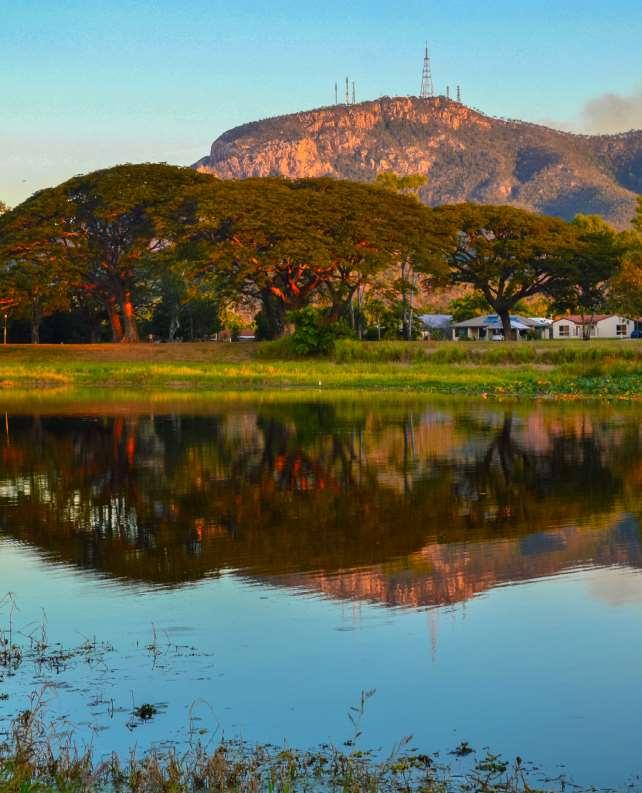
Townsville City Council spent $561 4 million this year to provide services and facilities to more than 200,000 residents. We managed $7.1 billion of assets including roads, bridges, drains, land, recreation and leisure facilities, libraries and parks for the benefits of the local and visiting community.
We generated $634.7 million in income to fund services and facilities via rates and utilities on properties, government grants, interest on investments and fees and charges. This income is then spent on construction, maintenance, wages, borrowing costs and other operating costs to provide services to the community like libraries, parks, pools, art galleries and waste facilities.
The Community Financial Report is an explanation of Council’s Financial Statements in an easy-to-understand format. It enables our community, customers, partners and employees to understand how Council has performed financially this year.
The Statement of Comprehensive Income shows Council’s net result for the 2023/24 financial year, calculated using the formula: Total Income less Total Expenses equals Net Result. Council achieved a net result of $73.3 million. This result is largely driven by $152.2 million in grant revenue received from the State and Federal Government to deliver services and infrastructure such as the Haughton Pipeline (Stage 2), Lansdown Eco-Industrial Precinct and Ross River Dam to Douglas Water Treatment Plant Pipeline Renewal Project.
Income – where our money came from
Income is received from rates and utility charges on residential, business and industrial properties, fees and charges from Council operations, State and Federal grants, interest, developer and other contributions.
Rates and utilities continue to be the major source of income for the delivery of Council services and infrastructure to our community. Council continues to focus on long-term planning and ongoing renewal and maintenance of infrastructure to keep average rates increases to a minimum.
Council’s total operating income increased by 3.1% from the prior year largely due to increases across rates and utility charges.
Expenses – where our money was spent
Council’s expenses are for employee costs, materials, utilities, services, depreciation, and financing costs to deliver community services. The following information covers operational spending as capital spending is added to the value of assets when incurred.
Depreciation and amortisation represent an allocation of the use or wear and tear over the expected life of the asset. Council has detailed Asset Management Plans to ensure the best value and longest life is achieved for each asset.
Council’s total operating expenses have increased by 11.8% from the prior year largely due to:
• increases in occupied positions during the year
• counter disaster operations and emergency works related to Cyclone Kirrily
• additional costs to treat blue-green algae from the water supplied from Ross River Dam
• increases in depreciation reflecting the increased replacement costs of Council assets.
The Statement of Financial Position shows what Council owns (assets), what Council owes (liabilities) and Council’s net worth.
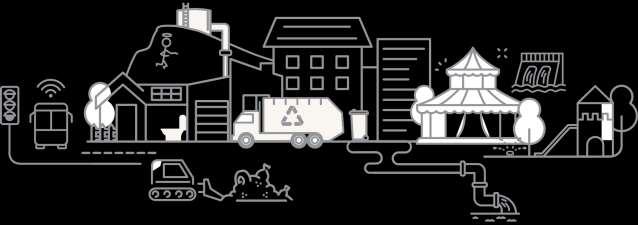
Council’s assets include infrastructure, cash, unpaid rates and other amounts owed to Council. Council’s largest asset component is infrastructure which includes roads, pipes and buildings that benefit the Townsville community. The value of Council’s total assets has increased from the prior year by $710.3 million. The movement was largely attributed to investment in capital projects combined with increases in the fair value of land, buildings, fixed plant, dams and weirs, and the transport network.
Council’s liabilities include money borrowed from Queensland Treasury Corporation, unpaid supplier invoices, amounts owing to employees for leave entitlements and provisions for future landfill capping.
Council’s total liabilities were $574.6 million as of 30 June 2024, of which $372.4 million relates to loans from Queensland Treasury Corporation (Queensland Government owned lending agency).
Total liabilities reduced by $38.0 million from the previous year, which is primarily attributed to a reduction in borrowings.
The Statement of Changes in Equity details the changes in Council’s retained earnings over the reporting period and provides a more detailed presentation of the community equity shown in the Statement of Financial Position.
Community equity is represented by Council’s net worth: what Council owns (total assets) minus what Council owes (total liabilities).
Community equity as of 30 June 2024 was $6.5 billion, which is $748.3 million higher than the previous year.
Graph 5 shows the amount of Council’s community equity over the last five years.
Graph 5 - Community equity: five-year trend
6,000,000
5,000,000
4,000,000
7,000,000 Amount ($'000)
Where Council’s cash comes from and where it goes
The Statement of Cash Flows shows Council’s cash inflows and outflows.
This statement shows Council’s ability to pay its bills to continue normal operations, pay off its debts and have money available for the construction of assets.
Graph 6 shows the amount of Council’s cash holdings at the end of each financial year, over the last five years. Cash balances are influenced by timing of grant funding received, the delivery of large infrastructure projects and draw down of borrowings.
Graph 6 – Council cash holdings: five-year trend
Section 176 of the Local Government Regulation 2012 requires Council to report on specific financial sustainability ratios:
• Operating surplus ratio
• Operating cash ratio
• Unrestricted cash expense cover ratio
• Asset sustainability ratio
• Asset consumption ratio
• Asset renewal funding ratio
• Council controlled revenue ratio
• Population growth ratio
• Leverage ratio
The results of these ratios calculated in accordance with the Financial Management (Sustainability) Guideline 2024 are shown in the Current Year and Long-Term Financial Sustainability Statements that follow the Financial Report. The graphs below show historical ratio values for the current and last three financial years as well as forecast ratios for the next two years.
The operating surplus ratio measures the extent to which revenue raised covers operational expenditure.
A ratio of -11.9% in 2023/24 indicates Council’s operating expenses were greater than its operating income received. Council has a plan to improve and strengthen its short and long-term financial position.
Graph 7 - Operating surplus ratio
Cash Ratio
Graph 8 - Operating cash ratio
The operating cash ratio is a measure of Council’s ability to cover its core operational expenses and generate a cash surplus excluding depreciation, amortisation, and finance costs.
A ratio of 22.7% in 2023/24 indicates Council is generating sufficient cash to fund operating activities.
The unrestricted cash expense cover ratio is an indicator of the uncommitted cash available to Council to meet ongoing and emergent financial demands.
Council has achieved a ratio of 3.5 months in 2023/24. Council forecasts continued improvement as we strengthen our short- and long-term financial position.
The asset sustainability ratio approximates the extent to which the infrastructure assets managed by Council are being replaced as they reach the end of their useful lives.
The result of 63.8% is reflective of the investment in the renewal of existing assets through Council’s 2023/24 capital plan. Results have met the target.
The asset consumption ratio approximates the extent to which Council’s infrastructure assets have been consumed compared to what it would cost to build a new asset with the same benefit to the community.
The result of 66.1% indicates that Council’s assets are being consumed in line with their estimated useful lives.
The asset renewal funding ratio measures the ability of Council to fund its projected infrastructure asset renewal/replacements in the future.
A ratio of 60.1% in 2023/24 indicates Council is unable to fund its long-term asset renewal requirements. There are no targets specified for this ratio.
Graph 9 - Asset sustainability ratio
Graph 10 - Asset consumption ratio
Townsville City Council 2023/24 Annual Report
Council-Controlled Revenue
Council- controlled revenue is an indicator of Council’s financial flexibility, ability to influence its operating income, and capacity to respond to unexpected financial shocks.
The result of 92.3% indicates that Council is able to consistently generate operating revenue from rates, levies and charges.
There are no targets specified for this ratio.
Population growth is a key driver of Council’s operating income, service needs, and infrastructure requirements into the future.
The result of 1.7% indicates that there is a net migration increase in the Townsville local government area.
There are no targets specified for this ratio.
The leverage ratio is an indicator of Council’s ability to repay its existing debt. It measures the relative size of Council’s debt to its operating performance.
A ratio of 3.5 times in 2023/24 indicates Council has generated sufficient cash to meet its debt obligations.
Council borrowings are assessed and approved through a separate process coordinated jointly by Queensland Treasury Corporation and the Department of Housing, Local Government, Planning and Public Works. Multiple factors and metrics are taken into consideration through the borrowings process.
Graph 11 - Council-controlled revenue
Council-Controlled Revenue
Graph 12 - Population growth
Population Growth
Graph 13 - Leverage ratio

of Comprehensive Income for the year ended 30 June 2024
The above statement should be read in conjunction with the accompanying notes and
(*) Comparative figures have been restated. Refer to Note 22 for further information
Townsville City Council 2023/24 Annual Report
as at 30 June 2024
The above statement should be read in conjunction with the accompanying notes and material accounting policies. (*) Comparative figures have been restated. Refer to Note 22 for further information
Statement of Changes in Equity for the year ended 30 June 2024
The above statement should be read in conjunction with the accompanying notes and material accounting policies. (*) Comparative figures have been restated. Refer to Note 22 for further information
Statement of Cash Flows for the year ended 30 June 2024
The above statement should be read in conjunction with the
Notes to the Financial Statements for the year ended 30 June 2024
(a) Basis of preparation
These general purpose financial statements are for the period 1 July 2023 to 30 June 2024. They are prepared in accordance with the requirements of the Local Government Act 2009 and the Local Government Regulation 2012.
Council is a not-for-profit entity for financial reporting purposes and these financial statements comply with Australian Accounting Standards and Interpretations as applicable to not-for-profit entities. These financial statements have been prepared under the historical cost convention except for the revaluation of certain classes of property, plant and equipment.
(b) The local government reporting entity
Townsville City Council is constituted under the Queensland Local Government Act 2009 and is domiciled in Australia.
As at 30 June 2024, Council was party to the following joint ventures and controlled entity:
• Townsville Breakwater Entertainment Centre Limited;
• NQ Spark Pty Ltd; and
• North Rail Yard Developments Pty Ltd.
Council has a 79.8% ownership interest in an unincorporated joint venture known as the Townsville Breakwater Entertainment Centre. This joint venture exists between Breakwater Island Limited as trustee of the Breakwater Island Trust and the Townsville City Council. Council impaired its investment in the joint venture to nil in 2017/18.
Pursuant to the terms of the management agreement, Townsville City Council provides a capped operating cost contribution fee each financial year, and Breakwater Island Limited indemnifies the joint venture from any amount by which defined costs exceed total revenue. All contributions are recorded in the Statement of Comprehensive Income.
Council has a 50% ownership interest (2023: 100%) in NQ Spark Pty Ltd, which is responsible for the establishment of an advanced environmental simulation facility in Townsville. The joint venture exists between James Cook University and Townsville City Council. Council's share of net assets and profit from operations is included in other non-current assets and other income respectively.
Council is the controlling entity of North Rail Yard Developments Pty Ltd and holds a 100% shareholding. This entity has not been consolidated at 30 June 2024 as its size and nature is not material to Council's operations. The net assets and profit from operations is included in other non-current assets and other income respectively.
(c) Rounding and Comparatives
The financial statements are in Australian dollars that have been rounded to the nearest thousand ($1,000) except for transactions with related parties (Note 26). Comparative information is generally restated for reclassifications, errors and changes in accounting policies unless permitted otherwise by transition rules in a new Accounting Standard.
(d) Estimates and Judgements
Council makes a number of judgements, estimates and assumptions in preparing these financial statements. These are based on the best information available to Council at the time, however due to the passage of time, these assumptions may change and therefore the recorded balances may not reflect the final outcomes. The significant judgements, estimates and assumptions relate to the following items and specific information is provided in the relevant note:
• Revenue recognition (Note 3)
• Valuation of property, plant and equipment including useful life assessments, fair value and impairment (Note 11)
• Measurement and recognition of provisions (Note 16)
• Measurement and recognition of the impairment of trade receivables (Note 24)
City Council 2023/24 Annual Report
for the year ended 30 June 2024
Note 1. Information about these financial statements (continued)
(e) Taxation
Council is exempt from income tax, however Council is subject to Fringe Benefits Tax, Goods and Services Tax (GST) and Payroll Tax on certain activities. The net amount of GST recoverable from the ATO or payable to the ATO is shown as an asset or liability respectively.
(f) Standards issued by the AASB not yet effective
The AASB has issued Australian Accounting Standards and Interpretations which are not effective at 30 June 2024. Those standards have not been adopted by Council and will be included in the financial statements on their effective date. Council has assessed all the standards which are not yet effective and have determined that there is no expected material impact on the reported financial position or performance.
(g) New and revised Accounting Standards adopted during the year
Townsville Council adopted all standards which became mandatorily effective for annual reporting periods beginning on 1 July 2023, none of the standards had a material impact on the reported position, performance and cash flows.
The adoption of the revisions to AASB 101 Presentation of Financial Statements resulted in disclosure of material accounting policy information only rather than significant accounting policies. This means that accounting policy information is disclosed only if it relates to material transactions, other events or conditions and:
i) Council has changed accounting policy during the reporting period and this change resulted in a material change to the information in the financial statements.
ii) Council chose (or was mandated to use) the accounting policy from one or more options permitted by Australian Accounting Standards.
iii) The accounting policy was developed in accordance with AASB 108 Accounting Policies, Changes in Accounting Estimates and Errors in the absence of an Australian Accounting Standard that specifically applies.
iv) The accounting policy relate to an area for which a Council is required to make significant judgements or assumptions in applying an accounting policy, and the Council discloses those judgements or assumptions in the financial statements.
v) The accounting required for them is complex and users of the entity’s financial statements would otherwise not understand those material transactions, other events or conditions.
(h) Volunteer Services
Volunteer services have not been recognised in the Statement of Comprehensive Income because Council would not purchase these services had they not been donated, and the value cannot be reliably measured.
Notes to the Financial Statements for the year ended 30 June 2024
(a) Components of Council’s functions
The activities relating to Council’s components reported in Note 2(b) are as follows:
(i) Cultural and community services
Maintain and grow events, arts, sport and cultural services to improve the liveability of Townsville. Develop and support cultural and community experiences in Townsville and maintain public and environmental health. Includes community support, community facilities, libraries, visual and performing arts, events and enforcement compliance.
(ii) Drain and stormwater management
Manage drain and stormwater infrastructure.
(iii) Environment and sustainability services
Support environmental sustainability, natural hazard and resource management and foster sustainable management of our environment. Increase natural landscape resilience of creeks, riverbanks, coastal shorelines, wetlands, forests and tropical savannas through rehabilitation, stabilisation and restoration.
(iv) Parks and open space management
Manage a diverse network of parks, open spaces, coastal and recreational facilities.
(v) Planning and development
Provide a strategic approach to long-term planning and policy development ensuring that Townsville manages natural hazards, growth and promotes economic development while protecting and conserving our natural resources and heritage. A key part of the land use strategy is ensuring the city develops within the urban growth corridors to provide more efficient performing infrastructure.
(vi) Roads and transport management
Provide a reliable and efficient transport network considering future transport needs whilst encouraging active travel methods.
(vii) Service partners
Provide a wide range of professional services, policy implementation and advice to both internal and external customers. Enable delivery of Council’s strategic and operational priorities within legislated requirements and good governance practices, through business systems and structures.
(viii) Water services
Water Services is a significant business activity of Townsville City Council, providing potable water and recycled water.
(ix) Wastewater services
Wastewater Services is a significant business activity of Townsville City Council and collects and treats wastewater for disposal or reuse.
(x) Resource recovery
Resource Recovery is a significant business activity of Townsville City Council, providing waste management, recycling and resource recovery services.
Components grouped by entity
Council has identified its operating components and grouped them by entity based on the internal reports that are reviewed and used by management in assessing performance and in determining the allocation of resources and assets.
The components above are grouped into the following entities and reported in Note 2(b): (i) to (vii) Council Functions; (viii) to (ix) Townsville Water; and (x) Resource Recovery
Notes to the Financial Statements for the y ear ended 30 June 202 4

Note 2 . Analysis of results by function (continued) (b)
Notes to the Financial Statements for the year ended 30 June 2024
Note 3. Revenue
(a) Rates , levies and charges
Rates, levies and charges are recognised as revenue at the beginning of the rating period to which they relate. Prepaid rates are recognised as a financial liability until the beginning of the rating period.
(b) Fees and charges
Revenue arising from fees and charges is recognised at the point in time when a performance obligation is completed and the customer receives the benefit of the goods or services being provided. This is generally on receipt or issuing of an invoice.
Licences and animal registrations granted by Council are recognised at the time of issue rather than over the term of the licence and registration period.
Revenue from infringements is recognised on issue of the infringement notice. Unpaid infringement notices are sent to an external collection agency for recovery and revenue is written off at that point. Subsequent recoveries are recognised as income on receipt.
(c) Grants, subsidies, contributions and donations
Grant revenue under AASB 15
Where grant revenue arises from an agreement which is enforceable and contains sufficiently specific performance obligations, revenue is recognised when control of each performance obligation is satisfied.
Each performance obligation is considered to ensure the revenue recognition reflects the transfer of control. Control may transfer at a point in time or continuously over the life of the agreement. Where control is transferred over time, costs incurred are used to reflect the transfer of the benefit. Otherwise revenue is recognised at the point of completion of a milestone within the terms of the agreement.
Notes to the Financial Statements for the year ended 30 June 2024
Note 3. Revenue (continued)
Grant revenue under AASB 1058
Contributions received for capital purposes
Where assets are donated or purchased for significantly below fair value, the revenue is recognised when the asset is acquired and controlled by Council. Revenue is generally recognised on receipt of the asset as there are no enforceable performance obligations.
Physical assets contributed to Council by developers in lieu of cash contributions are recognised as revenue when Council obtains control of the assets and there is sufficient data available to determine the specifications. Non-cash contributions with a value in excess of Council's recognition threshold are recognised as a non- current asset. Those below the threshold are recorded as an expense.
Grants received for capital purposes
Grants received from an enforceable agreement to acquire or construct property, plant and equipment to an identified specification under Council’s control, are recognised as revenue when the obligation to construct or purchase is complete.
For construction projects, revenue is recognised as costs are incurred.
(i)
(ii) Capital
Capital revenue includes grants and subsidies received which are tied to specific projects for the replacement or upgrade of existing non-current assets and/or investment in new assets. It also includes non-cash contributions which are usually infrastructure assets received from developers.
(iii) Timing of revenue
Notes to the Financial Statements for the year ended 30 June 2024
Note 4. Other income
Note 5. Employee benefits
benefit expenses are recorded when the service has been provided by the employee.
Townsville City Council 2023/24 Annual Report
Notes to the Financial Statements for the year ended 30 June 2024
Note
to the Financial Statements for the year ended 30 June 2024
Cash and cash equivalents in the statement of cash flows include cash on hand, all cash and cheques receipted but not banked at the year end and deposits held at call with financial institutions.
Council's cash and cash equivalents are subject to a number of external restrictions that limit amounts available for discretionary or future use. These include:
Externally imposed expenditure restrictions at the reporting date relate to the following cash assets:
to Council's water
Funds
In accordance with the Local Government Act 2009 and the Local Government Regulation 2012, a separate trust bank account and separate accounting records are maintained for funds held on behalf of outside parties. Council performs only a custodial role in respect of these monies. As these funds cannot be used by Council, they are not brought to account in these financial statements since Council has no control over the assets.
Trust
Townsville City Council 2023/24 Annual Report
Notes to the Financial Statements for the year ended 30 June 2024
Receivables are recognised at the amounts due at the time of sale or service delivery (i.e. the agreed purchase price/contact price). Settlement of these amounts is required within 30 days from the invoice date.
Debts are regularly assessed for collectability and an allowance is made for impairment where appropriate. All known bad debts were written off at 30 June 2024. Subsequent recoveries of amounts previously written off are recognised as income.
Council has the power to sell an owner's property to recover outstanding rate receivables, therefore in accordance with the Local Government Act 2009, rate receivables are not impaired unless the expected recovery value is less than outstanding arrears.
Interest is charged on outstanding rates and utilities at 8.17% per annum from 1 July 2023. No interest is charged on other debtors. There is no concentration of credit risk for rates and utility charges, fees and other debtor receivables.
on next page


Notes to the Financial Statements for the year ended 30 June 2024
Property, plant and equipment with a total value of less than $5,000 and items of land with a total value less than $1 are treated as an expense in the period of acquisition. All other items of property, plant and equipment are recognised as assets. Individual assets valued below the asset recognition threshold of $5,000, are recognised as an asset if connected to a larger network. For example, parks, including all the various components, are recognised as a network asset.
Land under roads acquired before 30 June 2008 is recognised as a non-current asset where the Council holds title or a lease over the asset. Townsville City Council currently does not have any such land holdings.
(b)
Property, plant and equipment assets are initially recorded at cost. Subsequently, each class of property, plant and equipment is stated at cost or fair value less, where applicable, any accumulated depreciation and accumulated impairment loss.
Cost is determined as the fair value of consideration plus costs incidental to the acquisition.
Direct labour, materials and an appropriate portion of overheads incurred in the acquisition or construction of assets are also included as capital costs.
Property, plant and equipment received in the form of contributions, for significantly less than fair value or as offsets to infrastructure charges, are recognised as assets and revenue at fair value.
When Council raises a provision for the restoration of a Council-controlled site, such as a landfill site, the provision is initially recognised against property, plant and equipment. Subsequent changes in the amount of economic outflow or a change in the discount rate is reflected in the Statement of Financial Position for all open landfills. Increases in landfill provisions for closed landfills are recognised in the Statement of Comprehensive Income to the extent they exceed the revaluation surplus.
Assets are depreciated from the date of acquisition or, in respect of internally constructed assets, from the time an asset is completed and commissioned ready for use, at which time they are reclassified from work in progress to the appropriate property, plant and equipment class.
Land, work in progress, certain cultural and heritage assets with heritage listing, road formations and formation works associated with the construction of dams, levee banks and reservoirs are not depreciated. Depreciation on other property, plant and equipment assets is calculated on a straight-line basis such that the cost of the asset less its residual value is recognised progressively over its estimated useful life to Council. Management believe that the straight-line basis appropriately reflects the pattern of consumption of all Council assets.
Where assets have separately identifiable components that are subject to regular replacement, these components are assigned useful lives distinct from the asset to which they relate. Any expenditure that increases the originally assessed capacity or service potential of an asset is capitalised and the new depreciable amount is depreciated over the remaining useful life of the asset. Where expenditure extends the life of an asset, the expenditure is capitalised and the asset's life is revised.
Depreciation methods, estimated useful lives and residual values are reviewed at the end of each reporting period and adjusted where necessary to reflect any changes in the pattern of consumption, physical wear and tear, technical or commercial obsolescence, or management intentions. Factors used in estimating the useful lives of assets at each reporting date include the condition assessments performed as part of the annual valuation process for assets measured at current replacement cost (CRC), manufacturer specifications, maintenance history, analysis of an asset class, and any other relevant evidence.
City Council 2023/24 Annual Report
Notes to the Financial Statements for the year ended 30 June 2024
Property, plant and equipment held at cost is assessed for indicators of impairment annually. If an indicator of possible impairment exists, the Council determines the asset's recoverable amount. Any amount by which the asset's carrying amount exceeds the recoverable amount is recorded as an impairment loss.
Non-current physical assets measured at fair value are revalued, where required, so that the carrying amount of each class of asset does not materially differ from its fair value at the reporting date. This is achieved by engaging independent, professionally qualified valuers every 5 years to determine the fair value for each class of property, plant and equipment assets. Valuations are undertaken in accordance with AASB 116 Property, Plant and Equipment, Local Government Regulation 2012 and Council policy.
In the intervening years, Council will internally assess, through physical inspection, the condition of infrastructure assets on a sample basis and as part of the maintenance process. The inspection results are considered in combination with indices provided by independent valuers. Together these elements are used to form the basis of a management valuation for infrastructure asset classes at balance date.
Revaluation increases are recognised in the asset revaluation surplus unless they are reversing a previous decrease which was recorded in the Statement of Comprehensive Income. In that case the increase is recorded in the Statement of Comprehensive Income to the extent of the previous decrease. Revaluation decreases are recognised in the asset revaluation surplus, where there are sufficient amounts available in the asset revaluation surplus relating to that asset class. Where the surplus does not have sufficient amounts available, the decrease is recognised in the Statement of Comprehensive Income. Where the class of asset has previously decreased in value and this reduction was recognised as an expense, an increase in the value of the class is recognised in the Statement of Comprehensive Income.
Fair values are classified into three levels as follows:
Level 1: fair value based on quoted prices (unadjusted) in active markets for identical assets or liabilities.
Level 2: fair value based on inputs that are directly or indirectly observable for the asset or liability.
Level 3: fair value based on unobservable inputs for the asset or liability.
There were no transfers between levels 1 and 2 during the year.
There were transfers between level 2 to level 3 in the Buildings Class.
Council's policy is to recognise transfers in and out of the fair value hierarchy levels at the end of the reporting period.
Significant inputs include estimated net rental per square metre and associated capitalisation rate, valued at the highest and best use. Other inputs include sale prices of comparable properties adjusted for differences in key attributes such as property size. Fair value has changed as per comprehensive valuation performed by valuer.
Knight Frank (Adam Reguson CPV No. 2215)

Buildings (level 2) 2024: $30,068,000 2023: $32,602,000
Fair value has changed as per comprehensive valuation performed by valuer.
These buildings are deemed of specialist nature with no active market or are situated on reserve land. The condition of these buildings considers both physical characteristics as well as holistic factors such as functionality, capability, utilisation, and obsolescence.
Valuers & Asset Management (Daniel Atherton R.E. & Dev Registered Valuer No. 2962; RICS Registered Valuer NO:1169941)
No change has been made to asset values.
For artwork assets valued for financial reporting, key considerations include whether an asset is able to transact within an identified market, either the local or international art market, or whether it is more appropriately considered in terms of cost of replacement; and whether an individual collection object reaches its highest and best value when considered as part of a collection or as an individual object. Restrictions may limit the highest and best use that can be applied, particularly in the case of Australian legislation including sensitive Collection Assets.
Ross Searle and Associates (Ross Searle BA Uni. Qld MLitt JCU valuer approved by the Office of the Arts for the Commonwealth Gifts Program)
Buildings (level 3) 2024: $247,620,000 2023: $173,300,000
01/03/2023
Market value
Cultural and heritage (level 2)
Fair value has changed as per comprehensive valuation performed by valuer.
The valuation process incorporates the determination of unit rates by reference to data contained in Rawlinson's Construction Cost Guide (Rawlinson's), an assessment of Council’s internal and external costings, manufacturer's specifications, and other relevant data.
Northern Water Management Pty Ltd (Jeff Ballard RPEQ No. 6854)
30/06/2024
Current replacement cost
Dams and weirs, and fixed plant (level 3)
Continued on next page
Key assumptions and estimates (related

Fair value has changed as per comprehensive valuation performed by valuer.
Sales prices of comparable land sites in proximity are adjusted for differences in key attributes, such as property size. The most significant inputs into this valuation approach are price per square metre. Land is valued for its highest and best use. Reserve land held by Council as trustee for the Queensland Government is not valued.
Knight Frank (Adam Reguson CPV No. 2215)
30/06/2024
Market value
Land (level 2)
No change has been made to asset values.
Industry standard cost guides, project costs from recently completed projects, manufacturer’s specifications and other data. There is a substantial number of low value assets within this class, sampling methods were applied to determine those asset values.
GHD (S. Orr RPEQ No. 13649)
01/05/2020
Current replacement cost
Land improvements (level 3)
No change has been made to asset values.
Valuation is performed by application of standardised unit rates. Rates are determined by usage, material, depth, length and size. Secondary factors include ground conditions, construction cost indexes such as Rawlinson's, manufacturer specifications, local contractor cost data and current best practice. Limitations on access to individual pipes caused by location or methodology are not incorporated into standardised rates.
Water and wastewater networkNorthern Water Management Pty Ltd (Jeff Ballard RPEQ No. 6854)
30/06/2022
Current replacement cost
Pipe networks –water, wastewater, and stormwater (level 3)
No change has been made to asset values.
Valuation for roads is performed by application of standardised unit rates. All road sections are componentised into formation, pavement subbase, pavement base, surface, kerbs, barriers, road furniture and pathways. It is assumed that design and construction is to the same standard and uses a consistent amount of labour and materials across each section. Environmental factors such as soil type, climate and topography are assumed to be consistent across each section. Condition assessment conforms to AustRoads technical network assessment papers 20112018.
Stormwater networkLemmah Pty Ltd (Graham John Jordan RPEQ No. 3305).
Unit ratesLemmah Pty Ltd (Graham John Jordan RPEQ No. 3305). Rates only.
Condition Assessment –Pavement Management Service Pty Ltd
30/06/2023
Current replacement cost
Transport networksealed roads (level 3)
Continued on next page
Fair value has changed as per comprehensive valuation performed by valuer.
Valuation for transport network assets is performed by the application of standardised unit rates and indexes. Transport network, other than sealed roads and bridges, includes asset group types such as footpaths, kerbs, parking meters, guardrails, road shoulder segments, boat ramps, bus stops, road furniture, medians, roundabouts, switchboards, street lighting and traffic signals. As part of the 2024 valuation, kerb asset types have undergone unitisation, resulting in an increase of 5.19% to gross replacement cost of the asset. It is assumed that design and construction is the same standard and uses a consistent amount of labour and materials across each section. Environmental factors such as soil type, climate and topography are assumed to be consistent across each section. Condition assessment is undertaken as part of the revaluation for the purpose of assessing remaining useful life for depreciation purposes. Condition assessment is performed inhouse by suitably experienced and knowledgeable Council staff following corporate guidelines.
Lemmah Pty Ltd (Graham John Jordan RPEQ No. 3305)

Transport networkexcluding sealed roads and bridges (level 3)
No change has been made to asset values.
Valuation for bridges is performed by application of standardised unit rates, including Stantec unit rate database, Rawlinson’s Australian Construction Handbook, supplier quotations, and published indices such as the road and bridge construction index and asset revaluation index for engineering construction.
Stantec (Stephen Walker RPEQ)
Transport networkbridges (level 3) Current replacement cost 30/06/2023
City Council 2023/24 Annual Report
Notes to the Financial Statements for the year ended 30 June 2024
Where amounts billed to a customer are based on the achievement of various milestones established in the contract, the amounts recognised as revenue in a given period do not necessarily coincide with the amounts billed to or certified by the grantor.
When a performance obligation is satisfied by transferring a promised good or service to the customer or the community before payment is due, Council presents the work in progress as a contract asset, unless the rights to that amount of consideration are unconditional, in which Council recognises a receivable.
Where Council receives capital grant funding to construct a Council controlled asset, Council presents the funds as a contract liability and revenue is recognised in line with spend (work in progress).
(a) Contract assets
(b) Contract liabilities
Note 13. Leases
Council as a lessee
Where Council identifies a lease greater than 12 months and greater than $5,000 including buildings and plant and equipment, a right-of-use asset and lease liability is recognised on the inception of the lease. Council separates lease and non-lease components for classes of assets and has accounted for lease payments as either a reduction of lease liability or as maintenance costs.
For low value or short-term leases, Council recognises the payment associated with these leases as an expense on a straight-line basis over the lease term.
The right-of-use asset is measured using the cost model where cost on initial recognition comprises: the lease liability, initial direct costs, prepaid lease payments, estimated cost of removal and restoration, less any lease incentives received. The right-of-use asset is depreciated over the lease term on a straight-line basis and assessed for impairment in accordance with the impairment of asset accounting policy.
Notes to the Financial Statements for the year ended 30 June 2024
The lease liability is initially recognised at the present value of the remaining lease payments at the commencement of the lease. The discount rate is the rate implicit in the lease, however where this cannot be readily determined, Council’s incremental borrowing rate for a similar term with similar security is used.
Terms and conditions of leases
Buildings
Several properties are leased including two properties for community purposes (Townsville City), one library (Townsville City) and five operational facilities (Mount St John). The lease terms range between 3 and 15 years and are subject to annual increases of either CPI or a fixed rate.
Lease Liabilities
The table below shows the maturity analysis of the lease liabilities based on contractual cashflows and therefore the amounts will not be the same as the recognised lease liability in the statement of financial position.
Liabilities not recognised
For building leases, Council includes extension options which can be exercised at Council’s discretion. At each reporting date Council assesses whether it is reasonably certain that the extension options will be exercised based on current operations and Council strategy. An extension option has been included in the lease liability for one property used for community purposes
Townsville City Council 2023/24 Annual Report
Notes to the Financial Statements for the year ended 30 June 2024
(continued)
Amounts included in the statement of comprehensive income related to leases
The following amounts have been recognised in the statement of comprehensive income for leases where Council is the lessee.
Leases at significantly below market value – concessionary / peppercorn leases
Council has a number of leases, pursuant to Deeds of Grant in Trust, at significantly below market value which are used for community and sporting purposes.
The leases are generally between 10 and 70 years and require payments of $1 per annum. The use of the right-of-use asset is restricted by the lessors to specified community services which Council must provide.
Council does not believe that any of the leases in place are individually material.
Payables are recognised when goods or services are received, at the amount owed. Amounts owing are unsecured and are generally settled on 30-day terms.
to
for the year ended 30 June 2024
Borrowings are initially recognised at fair value. Subsequent to initial recognition these liabilities are measured at amortised cost.
Principal and interest repayments are made quarterly in arrears. Expected final repayment dates vary from 15 June 2027 to 15 June 2040. There have been no defaults or breaches of the loan agreement during the period.
Council's current policy is to only borrow for capital investment purposes and for a term no longer than the expected life of the asset.
The loan market value at the reporting date was $357,844,082. This represents the value of the loans if Council repaid the loans as at reporting date. As it is the intention of Council to hold the debt for its term, no provision is required to be made in these financial statements.
No assets have been pledged as security by Council for any liabilities, however all loans are guaranteed by the Queensland Government.
The interest rates on borrowings range from 1.385% to 7.684% for book value rates.
Amounts expected to be settled within 12 months are calculated using current pay rates and projected future increases in those rates and includes related employee on-costs. Amounts not expected to be settled within 12 months are calculated on the same basis and are discounted to present value.
As Council does not have an unconditional right to defer this liability beyond 12 months, annual leave is classified as a current liability.
The provision for long service leave represents the present value of the estimated future cash outflows to be made in respect of services provided by employees up to the reporting date. The liability is calculated using current pay rates and projected future increases in those rates and includes related employee on- costs. The estimates are adjusted for the probability of the employee remaining in Council's employment or other associated employment which would result in Council being required to meet the liability. Estimates are then discounted to present value using interest rates attaching to Commonwealth Government guaranteed securities at the reporting date.
Townsville City Council 2023/24 Annual Report
the Financial Statements for the year ended 30 June 2024
Where employees have met the prerequisite length of service and Council does not have an unconditional right to defer this liability beyond 12 months, long service leave is classified as a current liability. Otherwise it is classified as non-current.
Landfill restoration
A provision is made for the cost of rehabilitation of assets and other future restoration costs where it is probable Council will be liable, or required, to incur costs on the cessation of use of these facilities.
The provision represents the present value of the anticipated future costs associated with the closure of landfill sites in accordance with environmental licence conditions. The calculation of this provision requires assumptions such as application of environmental legislation, site closure dates in line with Townsville 2021-2026 Corporate Plan, available technologies and engineering cost estimates. These uncertainties may result in future actual expenditure differing from amounts currently provided. Because of the long-term nature of the liability, the most significant uncertainty in estimating the provision is the costs that will be incurred. The provision recognised for landfill sites is reviewed at least annually and updated based on the facts and circumstances available at the time.
The total projected cost of $33,684,188 is expected to be incurred between 2025 and 2073. This amount excludes rehabilitating landfill cells on existing sites that are yet to be constructed or used, but which are in the current site plan.
Notes to the Financial Statements for the year ended 30 June 2024
(continued)
The asset revaluation surplus comprises adjustments relating to changes in value of property, plant and equipment that do not result from the use of those assets. Net incremental changes in the carrying value of classes of non-current assets since their initial recognition are accumulated in the asset revaluation surplus. Increases and decreases on revaluation are offset within a class of assets.
Where a class of assets is decreased on revaluation, that decrease is offset first against the amount remaining in the asset revaluation surplus in respect of that class. Any excess is treated as an expense.
When an asset is disposed of, the amount reported in surplus in respect of that asset is retained in the asset revaluation surplus and not transferred to retained surplus.
Townsville City Council 2023/24 Annual Report
Notes to the Financial Statements for the year ended 30 June 2024
Capital expenditure commitments
Commitment for the construction of the following assets contracted for at the reporting
but not recognised as liabilities:
Estimates of the potential financial effect of contingent liabilities that may become payable:
WorkCover Queensland authorities require guarantees against workers' compensation self-insurance liabilities. The guarantee is based on independent actuarial advice of the estimated liability. An actuarial assessment of the Council workers’ compensation claims liability performed on 29 August 2024 has estimated the required self-insurance guarantee be $2,780,000. Guarantees held at each balance date do not always equal the liability at these dates. This is due to delays in issuing the guarantees or Council opting to maintain the existing guarantee amount.
The actuarial assessment also recommends a self-insurance provision that has been recognised for risks relating to potential workers' compensation claims at balance date. Refer to Note 16.
Council holds two bank guarantees to provide security over costs associated with the Haughton Pipeline Duplication project.
to the Financial Statements for the year ended 30 June 2024
Claims
Council is a member of the local government mutual self-insurance pool, LGM Queensland. In the event of the pool being wound up or it is unable to meet its debts as they fall due, the trust deed and rules provide that any accumulated deficit will be met by the individual pool members in the same proportion as their contribution is to the total pool contributions in respect to any year that a deficit arises.
At the time of preparation of this report, the financial statements for 30 June 2024 of LGM Queensland were not available. As at 30 June 2023 the financial statements reported an accumulated surplus of $71,860,112 and it was not anticipated any liability would arise
Council contributes to the LGIAsuper Regional Defined Benefits Fund, at the rate of 12% for each permanent employee who is a defined benefit member. This rate is set in accordance with the LGIAsuper trust deed and may be varied on the advice of an actuary. The Regional Defined Benefits Fund is a complying superannuation scheme for the purpose of the Commonwealth Superannuation Industry (Supervision) legislation and is also governed by the Local Government Act 2009. The scheme is managed by the LGIAsuper trustee as trustee for LGIAsuper trading as Brighter Super.
The scheme is a pooled defined benefit plan and it is in accordance with the deed to not allocate obligations, plan assets and costs at the Council level.
Any amount by which the scheme is over or under funded may affect future contribution rate obligations but has not been recognised as an asset or liability of Council.
Council may be liable to the scheme for a portion of other local governments' obligations should that local government be unable to meet them. However, the risk of this occurring is extremely low and in accordance with the LGIAsuper trust deed, changes to Council's obligations will only be made on the advice of an actuary.
The last completed actuarial assessment of the scheme as required under Superannuation Prudential Standard 160 was undertaken as at 1 July 2021. The actuary indicated that “At the valuation date of 1 July 2021, the net assets of the scheme exceeded the vested benefits and the scheme was in a satisfactory financial position as at the valuation date.” The measure of vested benefits represents the value of benefit entitlements should all participating employees voluntarily exit the scheme. Council is not aware of any events since that time that indicates the assets of the scheme are not sufficient to meet the vested benefits, as at the reporting date.
No changes have been made to prescribed employer contributions which remain at 12% of employee salary or wages and there are no known requirements to change the rate of contributions.
The next triennial actuarial review is due 1 July 2024.
The most significant risks that may result in LGIAsuper increasing the contribution rate, on the advice of the actuary are:
Investment risk - the risk that the scheme's investment returns will be lower than assumed and additional contributions will be needed to fund the shortfall.
Townsville City Council 2023/24 Annual Report
Notes to the Financial Statements for the year ended 30 June 2024
(continued) Salary growth risk - the risk that wages or salaries will rise more rapidly than assumed, increasing
benefits to be funded.
Note 21. Reconciliation of net result for the year to net cash inflow (outflow) from operating activities
to
for the year ended 30 June 2024
Contributed Infrastructure Assets
During 2023/24 Council identified contributed infrastructure assets totalling $10,467,146 with prior year commission dates resulting in an understatement of revenue and property, plant and equipment in 2022/23.
In addition, $15,894,258 of contributed infrastructure assets were identified during 2023/24 with commission dates being prior to 1 July 2022. This amount should have been recognised in years prior to 2021/22.
Prior year adjustments for depreciation on the subject contributed assets were not actioned due to materiality.
As part of the comprehensive valuation of Council’s transport assets, Council has corrected the acquisition dates for kerb sub-asset types, resulting in an increase of $76,429,233 to the accumulated depreciation relating to prior years.
To correct the impact of the prior year errors Council has adjusted the 2022/23 comparative amounts in the Statement of Comprehensive Income, Statement of Financial Position, Statement of Changes in Equity and applicable notes to the financial statements.
Adjustments impacting financial statement line items for the 2022/23 comparative year are presented below:
of Financial Position (Extract)
Statement of Changes in Equity (Extract)
of
Townsville City Council 2023/24 Annual Report
Notes to the Financial Statements for the year ended 30 June 2024
There were no material events after reporting date that affect the current or future financial results of Council.
(a) Financial assets
Council has categorised and measured the financial assets and financial liabilities held at balance date as follows:
Financial assets
Cash and cash equivalents
Receivables - measured at amortised cost
Financial liabilities
Payables - measured at amortised cost
Borrowings - measured at amortised cost
Financial assets and financial liabilities are presented separately, offsetting has not been applied.
(b) Financial risk management
Council’s activities expose it to a variety of risks including credit risk, liquidity risk and market risk. Exposure to financial risks is managed in accordance with Council approved policies on financial risk management. These policies focus on managing the volatility of financial markets and seek to minimise potential adverse effects on the financial performance of Council. These methods include sensitivity analysis in the case of market risk, ageing analysis for credit risk and short term investment strategies to ensure sufficient funds are available to meet short term liquidity requirements.
(c) Credit risk
Credit risk is the risk of financial loss if a counterparty to a financial instrument fails to meet its contractual obligations. These obligations arise principally from Council's receivables from customers.
Exposure to credit risk is managed through regular analysis of credit counterparty ability to meet payment obligations. The carrying amount of financial assets represents the maximum credit exposure. Council assesses the credit risk before providing goods or services and applies normal business credit protection procedures to minimise the risk.
Investments in financial instruments are required to be made with Queensland Treasury Corporation (QTC) or similar State/Commonwealth bodies or financial institutions in Australia, in line with the Statutory Bodies Financial Arrangement Act 1982
Council has no significant concentration of credit risk with respect to any single counterparty or entity of counterparties other than those receivables where an allowance for impairment has been specifically provided for.
The following table details Council's receivables exposed to credit risk with ageing analysis and impairment provided thereon.
Notes to the Financial Statements for the year ended 30 June 2024
Liquidity risk is the risk that Council will encounter difficulty in meeting the obligations associated with its financial liabilities that are settled by delivering cash or another financial asset. Council is exposed to liquidity risk through its normal course of business and through its borrowings with QTC.
Council manages its exposure to liquidity risk by maintaining sufficient cash deposits and undrawn facilities to cater for unexpected volatility in cash flows. Unrestricted access was available at balance date to undrawn facilities listed below:
The following table sets out the liquidity risk of financial liabilities (excluding lease liabilities - refer note 13) held by Council. The amounts disclosed in the maturity analysis represent the contractual undiscounted cashflows at balance date.
The outflows in the above table are not expected to occur significantly earlier and are not expected to be for significantly different amounts than indicated in the table.
Townsville City Council 2023/24 Annual Report
Notes to the Financial Statements for the year ended 30 June 2024
(e)
Market risk is the risk that changes in market indices, such as interest rates, will affect the Council's income or the value of its holdings of financial instruments.
Interest rate risk
Exposure to interest rate risk arises on investments and borrowings with QTC and other financial institutions in which a future change in interest rates will affect future cash flows. In relation to QTC loans, Council holds fixed rate loan products. Consequently, Council’s borrowings are not subject to interest rate risk and therefore no sensitivity analysis is required.
Council does not undertake any hedging of interest rate risk.
Sensitivity analysis of cash balances
Sensitivity analysis depicts what effect a reasonable possible change in interest rates (assumed to be 1%) would have on the profit and equity, based on the carrying values of cash balances at the end of the reporting period. The calculation assumes that the change in interest rates would be held constant over the period. If the rates increased by 1% the impact would be an increase in profit of $300,358 (2023: $1,251,645), an equal amount in the reverse direction is possible for a decrease in rates.
Council applies the competitive code of conduct to the following activities: - water and sewerage - waste management
This requires the application of full cost pricing, identifying the cost of community service obligations (CSO) and eliminating the advantages and disadvantages of public ownership within that activity.
The CSO value is determined by Council and represents an activity cost(s) which would not be incurred if the primary objective of the activity was to make a profit. Council provides funding from general revenue to the business activity to cover the cost of providing non-commercial community services or costs deemed to be CSOs by the Council.
The following activity statements are for activities subject to the competitive code of conduct:
Notes to the Financial Statements for the year ended 30 June 2024
Note 25. National competition policy (continued)
Description of CSO's provided to business activities
Note 26. Transactions with related parties
(a) Transactions with Townsville Breakwater Entertainment Centre Joint Venture
(b) Transactions with NQ Spark Pty Ltd
Interests in NQ Spark Pty Ltd is disclosed in Note 1(b).
(c) Transactions with North Rail Yard Developments Pty Ltd
Interests in North Rail Yard Developments Pty Ltd is disclosed in Note 1(b).
(d) Transactions with key management personnel (KMP)
KMP include the Mayor, Councillors and Council’s senior management staff (Chief Executive Officer and directors). The compensation to the KMP for the financial year was as follows:
(*) Termination benefits represent amounts paid during the year as a result of settlement of employment contracts with three senior management staff including ex-gratia payments made to two of those staff members.
Notes to the Financial Statements for the year ended 30 June 2024
Note 26. Transactions with related parties (continued)
(e) Transactions with related parties (continued)
Other related parties include close family members of KMP and any entities controlled or jointly controlled by KMP or their close family members.
Close family members include a spouse, child or dependent of a KMP, child or dependent of a KMP’s spouse and any other family member expected to be influenced by a KMP in their dealings with Council.
There were no material transactions between other related parties in the period. There were no KMP family members employed by Council during the financial year.
(f) Outstanding balances
from NQ Spark Pty Ltd
receivable from NQ Spark Pty Ltd -
(g) Transactions with related parties that have not been disclosed
There are entities and individuals identified as related parties of Council that also live and operate within the Townsville region. On a regular basis ordinary citizen transactions occur between Council and its related parties. Some examples include:
• Payment of rates
• Use of Council facilities such as swimming pools and libraries
• Dog registration
Council has not included these types of transactions in its disclosure where they are made on the same terms and conditions available to the general public.
Management Certificate for the year ended 30 June 2024
These General Purpose Financial Statements have been prepared pursuant to sections 176 and 177 of the Local Government Regulation 2012 (the Regulations) and other prescribed requirements.
In accordance with Section 212(5) of the Regulation, we certify that:
i. the prescribed requirements of the Local Government Act 2009 and Local Government Regulations 2012 for the establishment and keeping of accounts have been complied with in all material respects; and
ii. the General Purpose Financial Statements, as set out on pages 112 to 147, present a true and fair view, in accordance with Australian Accounting Standards, of the Council's transactions for the financial year and financial position at the end of the year.

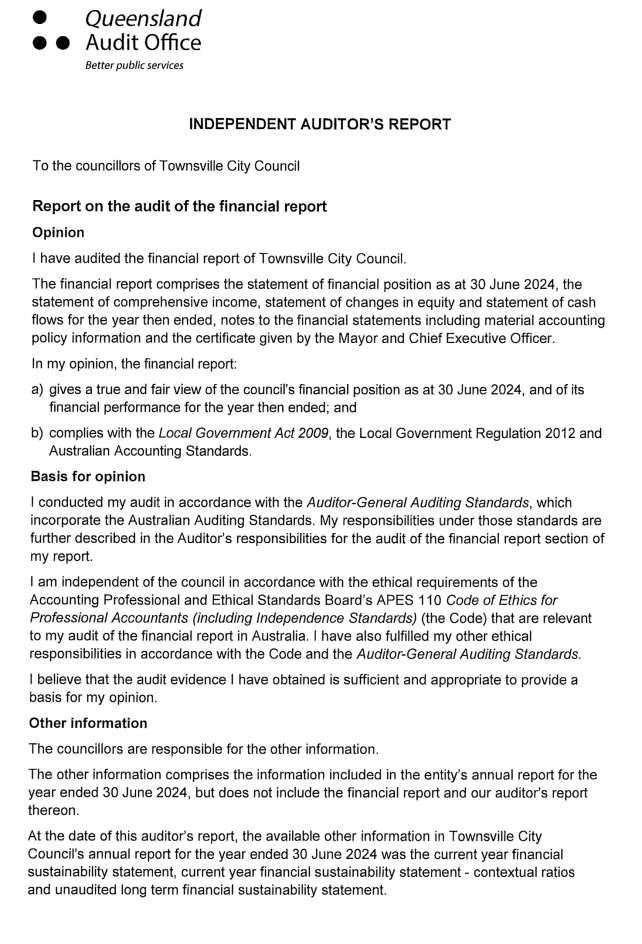
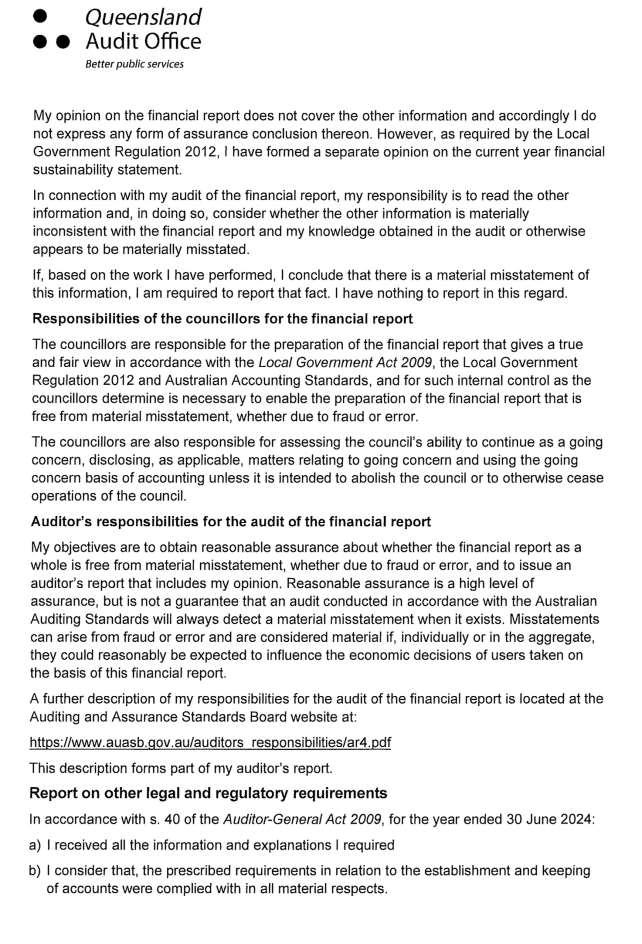
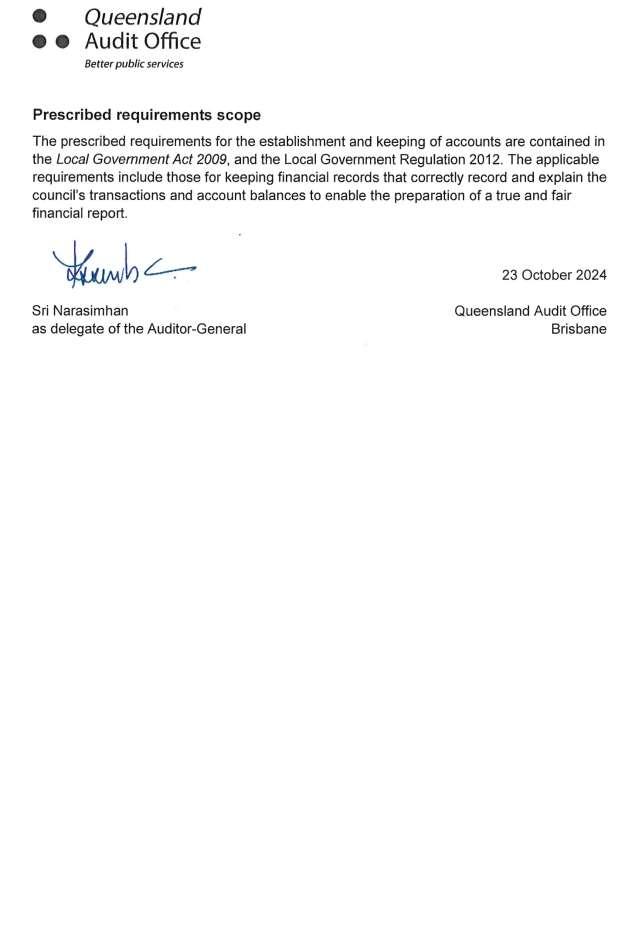
Audited ratios
Council's performance at 30 June 2024 against key financial ratios and targets.
The current year financial sustainability statement is prepared in accordance with the requirements of the Local Government Regulation 2012 and the Financial Management (Sustainability) Guideline 2024. The amounts used to calculate the six reported measures are prepared on an accrual basis and are drawn from Council's audited general purpose financial statements for the year ended 30 June 2024.
1. Unrestricted cash expense coverage ratio
months N/A
The unrestricted cash expense cover ratio is an indicator of the unconstrained liquidity available to a council to meet ongoing and emergent financial demands, which is a key component to solvency. It represents the number of months a council can continue operating based on current monthly expenses.
Councils unrestricted cash expense cover ratio is above target.
2.
The operating surplus ratio is an indicator of the extent to which operating revenues generated cover operational expenses. Any operating surplus would be available for capital funding or other purposes.
Results indicate insufficient operating revenue has been raised to fund operating expenditure and reinvest into Council’s existing infrastructure.
3.
The operating cash ratio is a measure of council's ability to cover its core operational expenses and generate a cash surplus excluding depreciation, amortisation, and finance costs.
Results are above target indicating council is generating sufficient cash to fund operating activities.
Asset management
4. Asset sustainability ratio
The asset sustainability ratio approximates the extent to which the infrastructure assets managed by a council are being replaced as they reach the end of their useful lives.
Results have met the target.
5.
The asset consumption ratio approximates the extent to which council's infrastructure assets have been consumed compared to what it would cost to build a new asset with the same benefit to the community.
Results have met the target.
Debt servicing capacity
6. Leverage ratio
The leverage ratio is an indicator of a council's ability to repay its existing debt. It measures the relative size of the council's debt to its operating performance.
Results have met the target.
This current-year financial sustainability statement has been prepared pursuant to Section 178 of the Local Government Regulation 2012 (the Regulation).
In accordance with Section 212(5) of the Regulation we certify that this current year financial sustainability statement has been accurately calculated.


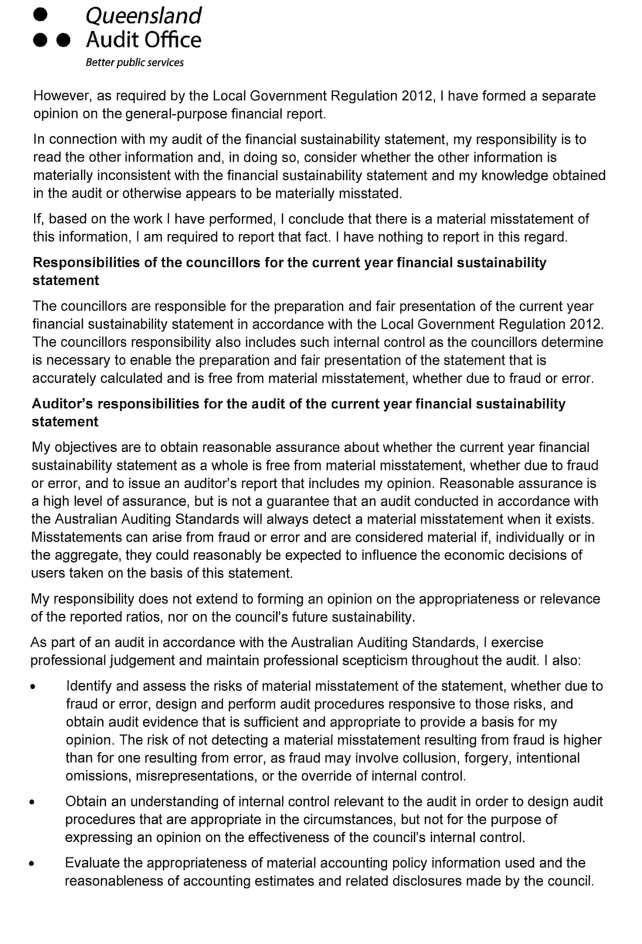
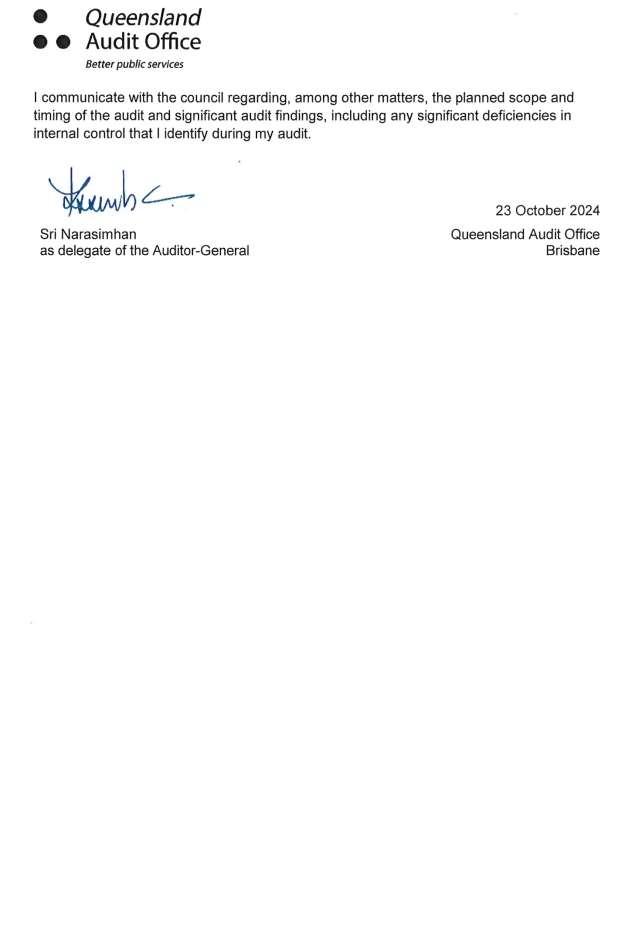
Townsville City Council 2023/24 Annual Report
The current year financial sustainability statement - Contextual Ratios is prepared in accordance with the requirements of the Local Government Regulation 2012 and the Financial Management (Sustainability) Guideline 2024. The amounts used to calculate the three reported measures are prepared on an accrual basis and are drawn from Council's audited general purpose financial statements for the year ended 30 June 2024.
1.
Council controlled revenue is an indicator of a council's financial flexibility, ability to influence its operating income, and capacity to respond to unexpected financial shocks.
Results indicate consistent generation of operating revenue from rates, levies and charges.
2. Population growth
Population growth is a key driver of a council's operating income, service needs, and infrastructure requirements into the future.
Results are increasing due to increased migration into Townsville.
3. Asset renewal funding ratio
The asset renewal funding ratio measures the ability of a council to fund its projected infrastructure asset renewal/replacements in the future.
Results indicate Council is unable to fund its long term asset renewal requirements.
This current-year financial sustainability statement has been prepared pursuant to Section 178 of the Local Government Regulation 2012 (the Regulation).
In accordance with Section 212(5) of the Regulation we certify that this current year financial sustainability statement has been accurately calculated.



This long-term financial sustainability statement has been prepared pursuant to Section 178 of the Local Government Regulation 2012 (the Regulation).
In accordance with Section 212(5) of the Regulation we certify that this long-term financial sustainability statement has been accurately calculated.

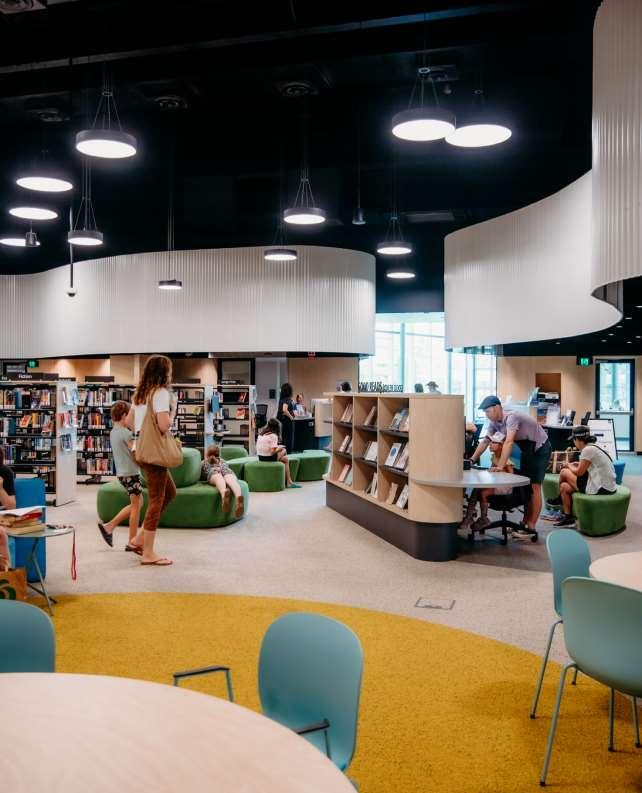
Term
Administrative Directive
Annual Budget
Annual Report
Asset
Definition
Describes what the Chief Executive Officer (acting under section 257 of the Local Government Act 2009) considers to be appropriate in relation to specific issues arising out of either legislation or Council decisions. They generally relate to the implementation of the day-to-day operations of the Council. Administrative directives are considered by Directors and Senior Managers and approved by the Chief Executive Officer.
The City’s annual budget identifies the planned expenditure and revenue approved by Council for a financial year. This includes any specific activities as priority under the Operational Plan.
A Statutory report under the Local Government Act 2009 that provides accountability to the community for the past financial year. The report contains a summary of progress toward the City Vision through implementation of the Corporate and Operational Plans, the auditor’s report, audited financial statements and an address by the Mayor and CEO.
An item that has potential or actual value to an organisation.
Australian Accounting Standards Accounting Standards issued by the Australian Accounting Standards Board that are equivalent to standards issued by the International Accounting Standards Board. These standards are binding on Queensland Councils and all other bodies established pursuant to the Local Government Act 2009.
Community
Community Engagement
Corporate Plan
Councillors
Financial Statements
Governance
Liveability
Local Government Act 2009
Local Government Association of Queensland (LGAQ)
A group of people living in the same locality and under the same government.
Community engagement is interaction between the City and any section of the community, either individually or as a group, and includes information sharing, consultation and/or active participation.
The City’s Corporate Plan outlines the Council’s vision and translates it into medium and long-term priorities, outcomes and strategies for a minimum five-year period.
Elected representatives of Council who serve a 4-year term.
The Statement of Comprehensive Income, Statement of Financial Position, Statement of Changes in Equity, Statement of Cash Flows prepared in accordance with Australian Accounting Standards together with the notes and certification statements.
The process by which decisions are taken and implemented, organisations are controlled and managed to achieve their objectives, and the process by which organisations are directed, reviewed and held to account.
Liveability refers to a combination of factors that contribute to quality of life. These include the impact of built and natural environment as well as economic, social and cultural factors.
The principal legislation which provides the legal framework for Queensland’s local government sector.
The peak body for local government in Queensland. A not-for-profit association set up solely to serve the state’s 77 Councils and their individual needs.
Local laws
MYR Budget
Objective
Operational Plan
Pandemic
Personal protective equipment (PPE)
Policy
Service
Those laws under the jurisdiction of the Council and enforced by city staff and/or Police.
Mid-year budget review adopted by Council throughout the financial year. The MYR replaces the adopted budget.
Something toward which work is to be directed, a strategic position to be attained, or a purpose to be achieved, a result to be obtained, a product to be produced, or a service to be performed.
A document with a one-year outlook, which outlines the key activities to be undertaken to achieve the desired outcomes set out in the Corporate Plan. This is a legislative requirement.
A pandemic is the worldwide spread of a new disease. Viral respiratory diseases, such as those caused by a new influenza virus or the coronavirus (COVID-19), are the ones that can most easily turn into a pandemic.
Refers to anything worn or used to minimise risk to workers’ health and safety. This may include, but is not limited to; boots, ear plugs, face masks, gloves, goggles, hard hats, high visibility clothing, safety shoes, and sunscreen.
A statement formally adopted by Council that describes the Council’s position on a particular issue. All policies are consistent with Council’s long, medium and short-term planning outcomes and some will directly support the delivery of the Council’s Community and Corporate Plans.
A service is a group of activities provided to the City e.g., waste collection which manages a range of different waste collection types.
Below is an index of the relevant sections of this report that pertain to the statutory requirements* for a local government annual report:
– Local Government Act 2009
City Council 2023/24 Annual Report

